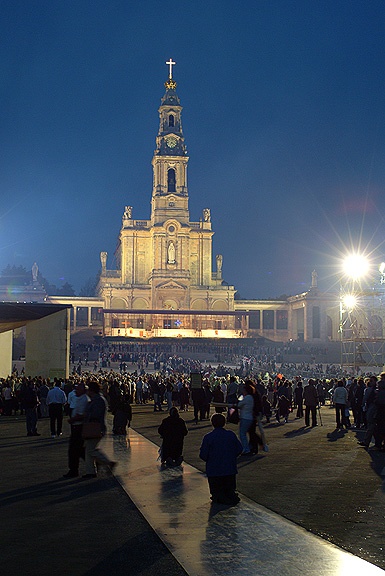
May 13, 2017 | Non categorizzato
 While Portugal welcomes the Holy Father in Fatima, we are highlighting an excerpt of an article of by Chiara Lubich published in the Roman Observatory, in 1984, on the occasion of the Family Jubilee. The Fatima event, Chiara affirmed, calls us to conversion and faithfulness to the Gospel, and also to the family. “[…] When the Pope [John Paul II − editor’s note] read the act of consecration of humanity to Mary, he began with these words: ‘The family is the heart of the Church. Today, from this heart ensues a particular prayer of consecration to the Heart of the Mother of Jesus.’ And so, from heart to Heart in this intense communion, that was created with the Eucharistic celebration, from the heart of the universal Father, arose almost a cry, filled with concern for the needs of humanity, the prayer of consecration to the Virgin Mary, asking her to take special care of the human family. The Pope was there, on kneeing in front of the white image of Our Lady of Fatima. In that moment the thought of many of us present went back to May 13 1981, the day of the assassination attempt. […] Now St. Peter’s Square was packed to the very brim. Next to him before Our Lady of Fatima, like a flower that blossomed from his suffering and blood, all the families of the Church were symbolically gathered like a sign of all the families of the world. At the moment of the world’s consecration to Mary, the Holy Father, as the supreme Pastor, could therefore count not only on the communion of all the Pastors of the Church, “constituting a body and a college”, but also on the full adhesion of the children of the Church, represented by many families of many countries. […]And in the prayer with which he concluded his homily – prayer which he composed for the 1980 Synod that had the family as its theme of study – he asked this grace: “May the love enhanced by the grace of the sacrament of marriage be stronger than any weakness and any crisis that our families sometimes experience.” All these important coincidences and expressions help us to gather the profound meaning of this consecration has to bring all Christian families to live – with the help and example of Mary – the luminous and fascinating plan of God on the family in all its expressions: marriage love, according to the divine plan, sign of Christ’s love for the Church up to the total gift of self; paternity and maternity, as the participation to the fertile love of the Creator; peace and harmony in overcoming all the tensions and difficulties as fruit of an always alive and tireless charity intent on keeping the spiritual presence of Christ in the family and, with Him, the unity of thought and action; an openness of communion and service towards other families. […] The message of Fatima that calls everyone to conversion and faithfulness to the Gospel, becomes the answer of the consecration of the family, a commitment of renewal so that the face of the Church may shine more. In the Christian family the Church is the “family of God” a welcoming dwelling place for all the lost children who are called back to the house of the Father and invited to enter through the maternal heart of the Mother of Jesus.
While Portugal welcomes the Holy Father in Fatima, we are highlighting an excerpt of an article of by Chiara Lubich published in the Roman Observatory, in 1984, on the occasion of the Family Jubilee. The Fatima event, Chiara affirmed, calls us to conversion and faithfulness to the Gospel, and also to the family. “[…] When the Pope [John Paul II − editor’s note] read the act of consecration of humanity to Mary, he began with these words: ‘The family is the heart of the Church. Today, from this heart ensues a particular prayer of consecration to the Heart of the Mother of Jesus.’ And so, from heart to Heart in this intense communion, that was created with the Eucharistic celebration, from the heart of the universal Father, arose almost a cry, filled with concern for the needs of humanity, the prayer of consecration to the Virgin Mary, asking her to take special care of the human family. The Pope was there, on kneeing in front of the white image of Our Lady of Fatima. In that moment the thought of many of us present went back to May 13 1981, the day of the assassination attempt. […] Now St. Peter’s Square was packed to the very brim. Next to him before Our Lady of Fatima, like a flower that blossomed from his suffering and blood, all the families of the Church were symbolically gathered like a sign of all the families of the world. At the moment of the world’s consecration to Mary, the Holy Father, as the supreme Pastor, could therefore count not only on the communion of all the Pastors of the Church, “constituting a body and a college”, but also on the full adhesion of the children of the Church, represented by many families of many countries. […]And in the prayer with which he concluded his homily – prayer which he composed for the 1980 Synod that had the family as its theme of study – he asked this grace: “May the love enhanced by the grace of the sacrament of marriage be stronger than any weakness and any crisis that our families sometimes experience.” All these important coincidences and expressions help us to gather the profound meaning of this consecration has to bring all Christian families to live – with the help and example of Mary – the luminous and fascinating plan of God on the family in all its expressions: marriage love, according to the divine plan, sign of Christ’s love for the Church up to the total gift of self; paternity and maternity, as the participation to the fertile love of the Creator; peace and harmony in overcoming all the tensions and difficulties as fruit of an always alive and tireless charity intent on keeping the spiritual presence of Christ in the family and, with Him, the unity of thought and action; an openness of communion and service towards other families. […] The message of Fatima that calls everyone to conversion and faithfulness to the Gospel, becomes the answer of the consecration of the family, a commitment of renewal so that the face of the Church may shine more. In the Christian family the Church is the “family of God” a welcoming dwelling place for all the lost children who are called back to the house of the Father and invited to enter through the maternal heart of the Mother of Jesus.
Chiara Lubich
(Osservatore Romano 25.03.1984)
May 12, 2017 | Non categorizzato
https://youtu.be/FZLJ_xLw9dk
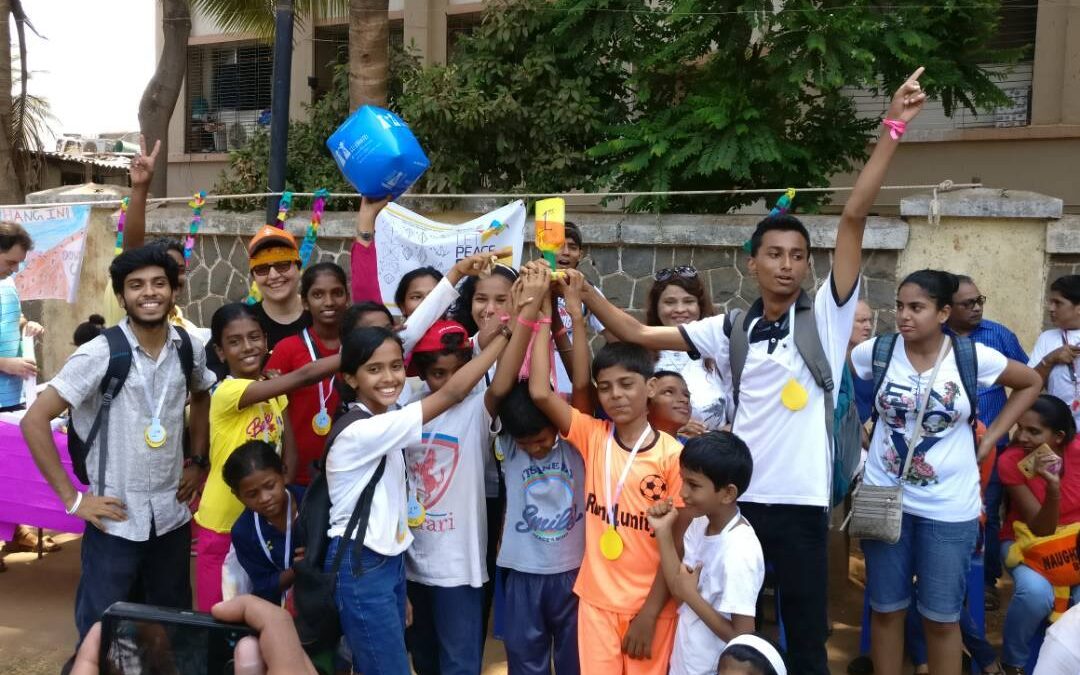
May 12, 2017 | Senza categoria
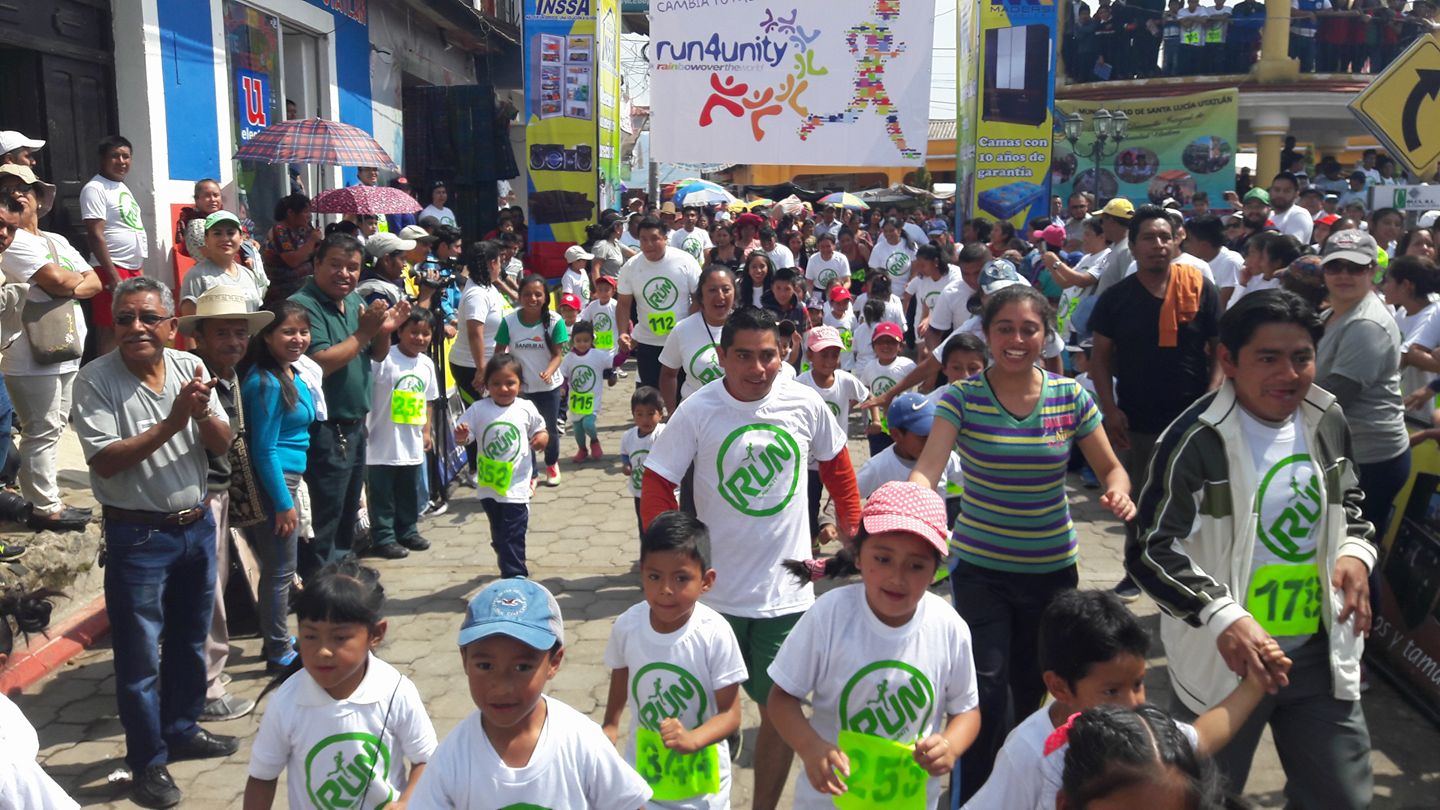 The race flowed through time zones from East to West with a message of brotherhood for the world. It’s Run4Unity, the annual relay race organized by the teenage members of the Focolare Movement. With a time difference of five hours, in Sopron, Hungary, the race charged through the border with Austria where young people from a refugee camp were on their way to meet up with the runners. Jumping over 10 time zones between Mexicali, Mexico and Calexico, USA, a hundred teenagers converged on the wall that separates their two nations. On this day hatred and racism don’t have a country. The race concluded World Unity Week, seven days of projects and events in favour of peace and unity among peoples: from Ecuador and its humanitarian emergency after the earthquake, to Medan, Indonesia, with a concert for peace, to Goma in the Democratic Republic of the Congo and the Amani Music Festival, three days of music-making and dancing for peace. There was a meaningful video message from teenagers in Aleppo, Syria, to their peers in Argentina. Run4Unity is a multi-staged journey that cuts through the planet’s most controversial border crossings between the hours of eleven and twelve o’clock local time. On foot, on a bike, on roller-skates, in boats or standing silently in prayer – once again this year it was the most against-the-current race there has ever been, a prophetic sign of the unity that will one day be ours. In this race willing hearts mattered more than quick feet. Each stop along the way provided sport events solidarity projects, presentations of experiences of active citizenship in places where solitude, poverty and marginalisation are prevalent – all of it to show that a united world is still possible, despite worrying tensions.
The race flowed through time zones from East to West with a message of brotherhood for the world. It’s Run4Unity, the annual relay race organized by the teenage members of the Focolare Movement. With a time difference of five hours, in Sopron, Hungary, the race charged through the border with Austria where young people from a refugee camp were on their way to meet up with the runners. Jumping over 10 time zones between Mexicali, Mexico and Calexico, USA, a hundred teenagers converged on the wall that separates their two nations. On this day hatred and racism don’t have a country. The race concluded World Unity Week, seven days of projects and events in favour of peace and unity among peoples: from Ecuador and its humanitarian emergency after the earthquake, to Medan, Indonesia, with a concert for peace, to Goma in the Democratic Republic of the Congo and the Amani Music Festival, three days of music-making and dancing for peace. There was a meaningful video message from teenagers in Aleppo, Syria, to their peers in Argentina. Run4Unity is a multi-staged journey that cuts through the planet’s most controversial border crossings between the hours of eleven and twelve o’clock local time. On foot, on a bike, on roller-skates, in boats or standing silently in prayer – once again this year it was the most against-the-current race there has ever been, a prophetic sign of the unity that will one day be ours. In this race willing hearts mattered more than quick feet. Each stop along the way provided sport events solidarity projects, presentations of experiences of active citizenship in places where solitude, poverty and marginalisation are prevalent – all of it to show that a united world is still possible, despite worrying tensions. 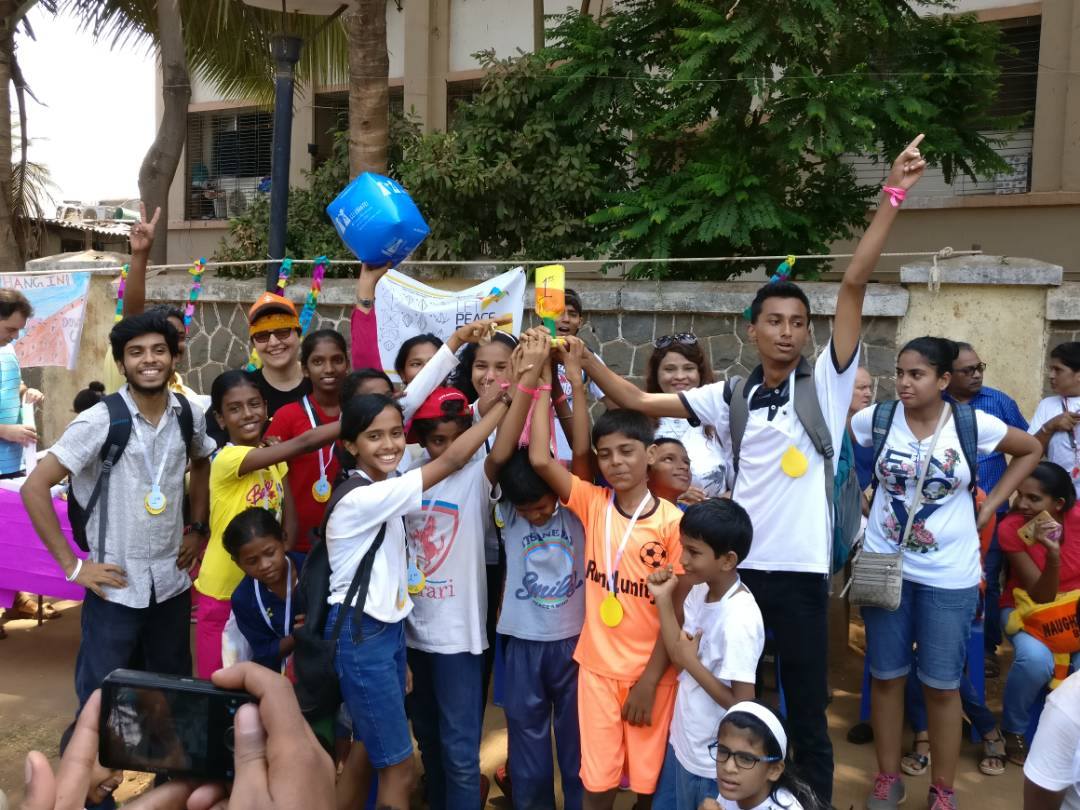 In Penang, West Malaysia, Run4Unity was a Unity Walk, an 8km trek that drew in 1200 people of all ages and belonging to different ethnic, cultural and religious groups: Hindus, Muslims, Sikhs, Christians and Buddhists. In India the race expressed its desire for peace as it flowed through downtown New Dehli, from Gandhi to Smirti where Mahatma Gandhi was murdered in 1948 and is now a sacred site, then on to the India Gate monument that is dedicated to soldiers who never returned from war. In Dresden, Germany, Run4Unity was held as part of the Pulse of Europe event, which was meant to encourage citizens to listen to the heartbeat of Europe. In Columbus, USA, Run4Unity was held at a centre for at risk people. It included games, messages of peace and sharing the Golden Rule. Then they cleaned the streets and shared sandwiches with the homeless. In Santa Lucia Utatlàn, Guatemala, the race was an opportunity for a multi-cultural event that brought together a thousand people from different ethnic groups, including youngsters from the Maya community of Quiché. In Iglesias, Italy, Run4Unity took on a rather different form: Disarmament Awareness. There are two bombs and weapons factories in the region, which produce arms to be used in today’s wars. Teenagers around the globe imagine a different kind world, one without wars, walls and hatred. Their message has also gone viral online. Radioimmaginaria, the first European radio station run exclusively for and by teenagers, dedicated live direct coverage of the Run4Unity events around the world. Because, they say, “at fifteen years of age you’re allowed to imagine the world of the future.”
In Penang, West Malaysia, Run4Unity was a Unity Walk, an 8km trek that drew in 1200 people of all ages and belonging to different ethnic, cultural and religious groups: Hindus, Muslims, Sikhs, Christians and Buddhists. In India the race expressed its desire for peace as it flowed through downtown New Dehli, from Gandhi to Smirti where Mahatma Gandhi was murdered in 1948 and is now a sacred site, then on to the India Gate monument that is dedicated to soldiers who never returned from war. In Dresden, Germany, Run4Unity was held as part of the Pulse of Europe event, which was meant to encourage citizens to listen to the heartbeat of Europe. In Columbus, USA, Run4Unity was held at a centre for at risk people. It included games, messages of peace and sharing the Golden Rule. Then they cleaned the streets and shared sandwiches with the homeless. In Santa Lucia Utatlàn, Guatemala, the race was an opportunity for a multi-cultural event that brought together a thousand people from different ethnic groups, including youngsters from the Maya community of Quiché. In Iglesias, Italy, Run4Unity took on a rather different form: Disarmament Awareness. There are two bombs and weapons factories in the region, which produce arms to be used in today’s wars. Teenagers around the globe imagine a different kind world, one without wars, walls and hatred. Their message has also gone viral online. Radioimmaginaria, the first European radio station run exclusively for and by teenagers, dedicated live direct coverage of the Run4Unity events around the world. Because, they say, “at fifteen years of age you’re allowed to imagine the world of the future.”
![Celebrating a Europe of Hope in Malta]()
May 11, 2017 | Focolare Worldwide
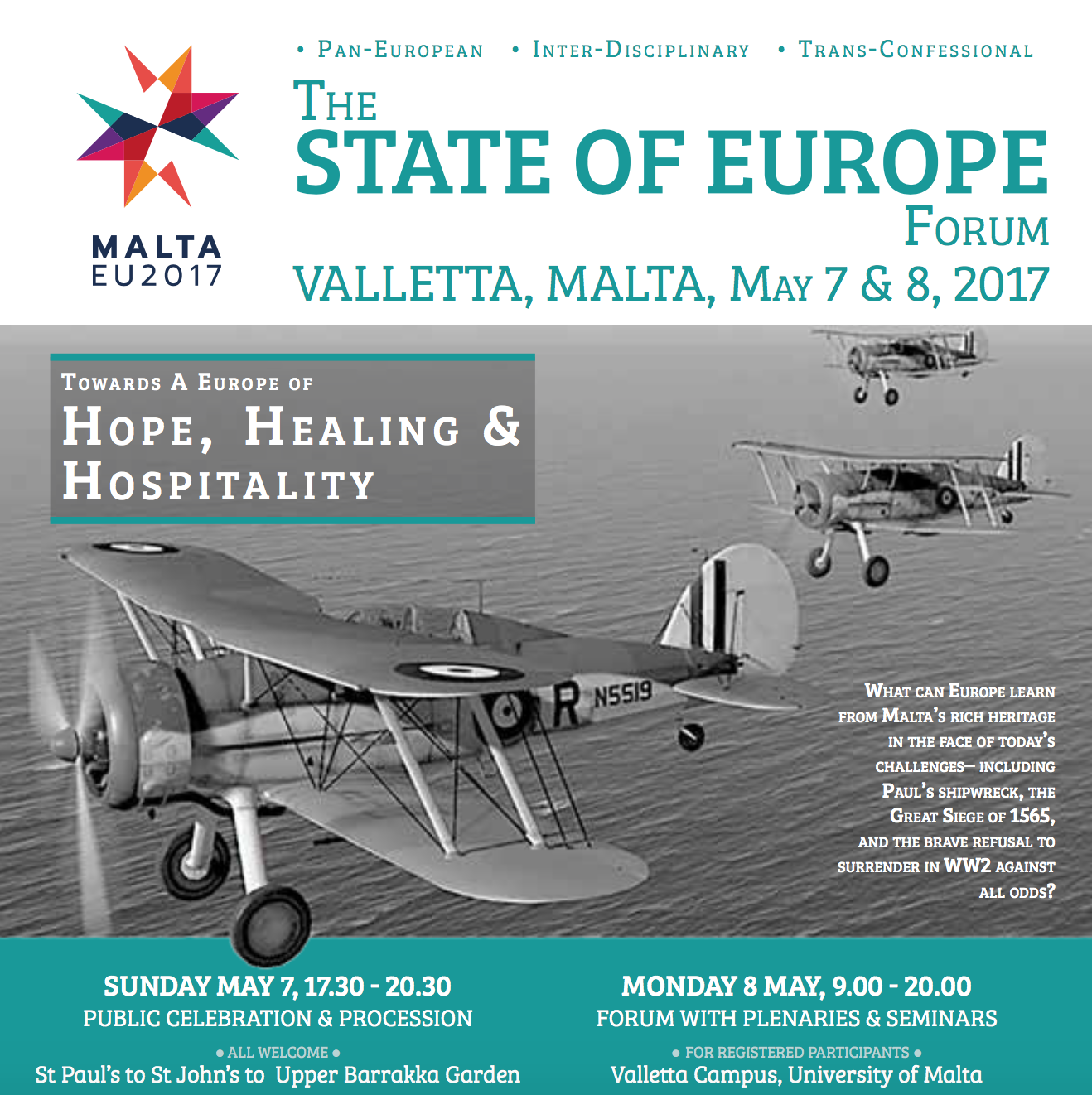 Malta is the largest island in the archipelago that shares its name. It is located in the central Mediterranean Sea between Sicily, Tunisia and Libya. It was the head of the Council of the European Union for the first time in its history in 2017. The island, whose symbol is the eight-cusped cross, signifying the eight Beatitudes, pertaining to the Knights of Malta, is closely situated to the tragedies that occur daily in the blue tomb that the Mediterranean Sea has become for those crossing between Africa, the Middle East and Europe in a desperate search for a new chance at life. On one of its other shores another shipwreck had found safe port after fourteen days adrift. One of the passengers was Saint Paul on his way back to Rome in around AD 60. According to tradition the ship carrying him and another 264 passengers was sunk by a storm, and everyone on board swam to shore. After some time he was invited to stay at the house of Publius, the Roman governor of the islands, whose father Paul cured of a serious flu. The governor converted to Christianity and became the first bishop of Malta. Europe’s Christian roots were the focus of discussion in Malta’s capital of Valletta on the 7th and 8th of May during a forum titled Towards a Europe of Hope, Healing and Hospitality. The goal of the forum, which is held each year by the European Union in the country of the presidency, is the promotion of dialogue according to the foundational inspiration of Robert Schuman. On the first day, after the opening events at the Anglican Cathedral, there was an artistic performance and a prayer titled “Hope”. Then a procession led through the streets of Valletta to the Roman Catholic Co-Cathedral of Saint John where some words were offered by Archbishop Scicluna and Maria Voce. The Focolare president offered a reflection on “Healing and Reconciliation”.
Malta is the largest island in the archipelago that shares its name. It is located in the central Mediterranean Sea between Sicily, Tunisia and Libya. It was the head of the Council of the European Union for the first time in its history in 2017. The island, whose symbol is the eight-cusped cross, signifying the eight Beatitudes, pertaining to the Knights of Malta, is closely situated to the tragedies that occur daily in the blue tomb that the Mediterranean Sea has become for those crossing between Africa, the Middle East and Europe in a desperate search for a new chance at life. On one of its other shores another shipwreck had found safe port after fourteen days adrift. One of the passengers was Saint Paul on his way back to Rome in around AD 60. According to tradition the ship carrying him and another 264 passengers was sunk by a storm, and everyone on board swam to shore. After some time he was invited to stay at the house of Publius, the Roman governor of the islands, whose father Paul cured of a serious flu. The governor converted to Christianity and became the first bishop of Malta. Europe’s Christian roots were the focus of discussion in Malta’s capital of Valletta on the 7th and 8th of May during a forum titled Towards a Europe of Hope, Healing and Hospitality. The goal of the forum, which is held each year by the European Union in the country of the presidency, is the promotion of dialogue according to the foundational inspiration of Robert Schuman. On the first day, after the opening events at the Anglican Cathedral, there was an artistic performance and a prayer titled “Hope”. Then a procession led through the streets of Valletta to the Roman Catholic Co-Cathedral of Saint John where some words were offered by Archbishop Scicluna and Maria Voce. The Focolare president offered a reflection on “Healing and Reconciliation”. 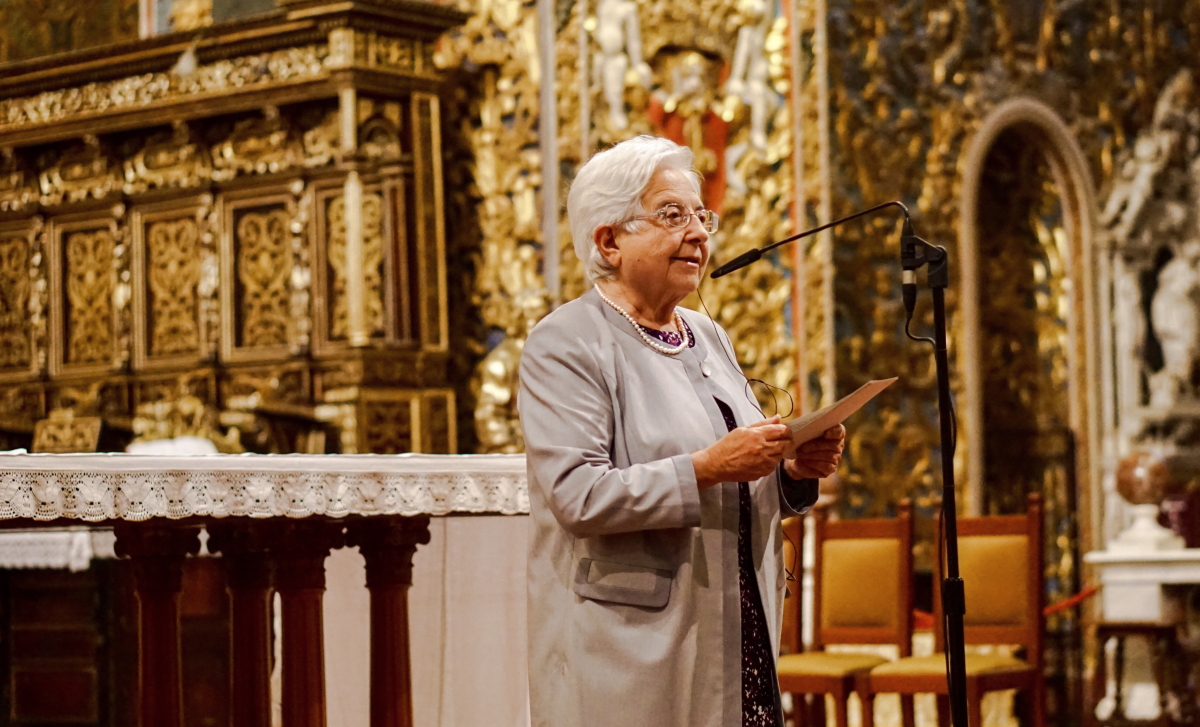 On the anniversary of that “community of peoples” that Schuman envisioned in 1950, proposing the historic coal and steel community to avoid all forms of war between France, Germany and any country who would later join the community, Maria Voce asked what the inspirational spark might have been behind such an extraordinary gesture that was intended to bring reconciliation to populations overwhelmed by the most horrible conflicts ever seen up until then. Who had inspired Schuman, Adenauer, De Gasperi – all Christian statesmen who are considered the founding fathers of Europe? The answer is obvious: “We want to think that the ideas and the strength to build Europe came from God who had shown his love for all people by suffering an infamous and atrocious death, God had identified with all the pains of humanity, including the ones deriving from violence and wars.”
On the anniversary of that “community of peoples” that Schuman envisioned in 1950, proposing the historic coal and steel community to avoid all forms of war between France, Germany and any country who would later join the community, Maria Voce asked what the inspirational spark might have been behind such an extraordinary gesture that was intended to bring reconciliation to populations overwhelmed by the most horrible conflicts ever seen up until then. Who had inspired Schuman, Adenauer, De Gasperi – all Christian statesmen who are considered the founding fathers of Europe? The answer is obvious: “We want to think that the ideas and the strength to build Europe came from God who had shown his love for all people by suffering an infamous and atrocious death, God had identified with all the pains of humanity, including the ones deriving from violence and wars.” 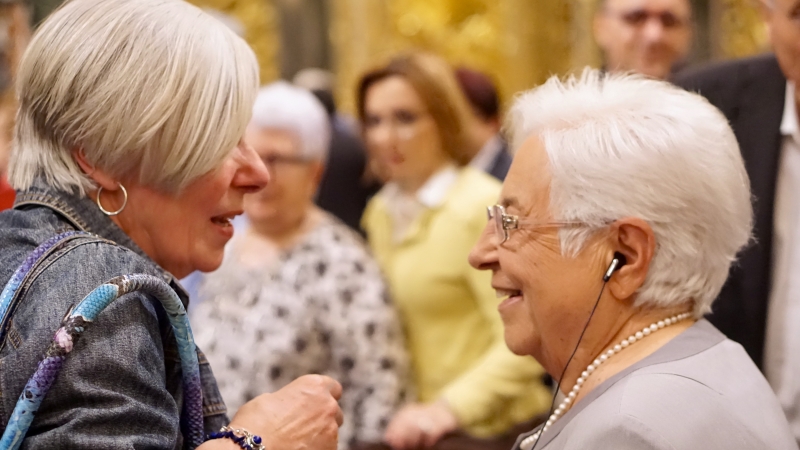 With regard to the culture that could emerge when there is profound reconciliation, Maria Voce quoted Chiara Lubich: “Every person can have a contribution to give – in any field: science, art, politics, communications, and so on. And they will be more efficacious if they work together with others who are united in the name of Christ: it is the continuation of the Incarnation and, it is in this way, that what could be called a culture of the Resurrection spreads through the world.” But for this to happen, “a path towards full and visible communion is asked of us, Christians, knowing that this will be decisive for the unity of Europe and for serving humanity better.” Recently, this path began to unfold further stages, in Lund, Sweden, Lesbos, Greece, and Cuba. “In a multi-cultural and multi-religious Europe there is need for a new capacity to dialogue, dialogue that can be based on the Golden Rule that is found in every religion on earth.” How significant to be saying these things precisely in the safe port of Malta in the midst of the Mediterranean, in the hope that this blue tomb will again become “Mare Nostrum” where Europe, Africa and the Middle East can find a peaceful route.
With regard to the culture that could emerge when there is profound reconciliation, Maria Voce quoted Chiara Lubich: “Every person can have a contribution to give – in any field: science, art, politics, communications, and so on. And they will be more efficacious if they work together with others who are united in the name of Christ: it is the continuation of the Incarnation and, it is in this way, that what could be called a culture of the Resurrection spreads through the world.” But for this to happen, “a path towards full and visible communion is asked of us, Christians, knowing that this will be decisive for the unity of Europe and for serving humanity better.” Recently, this path began to unfold further stages, in Lund, Sweden, Lesbos, Greece, and Cuba. “In a multi-cultural and multi-religious Europe there is need for a new capacity to dialogue, dialogue that can be based on the Golden Rule that is found in every religion on earth.” How significant to be saying these things precisely in the safe port of Malta in the midst of the Mediterranean, in the hope that this blue tomb will again become “Mare Nostrum” where Europe, Africa and the Middle East can find a peaceful route.
![Celebrating a Europe of Hope in Malta]()
May 10, 2017 | Non categorizzato
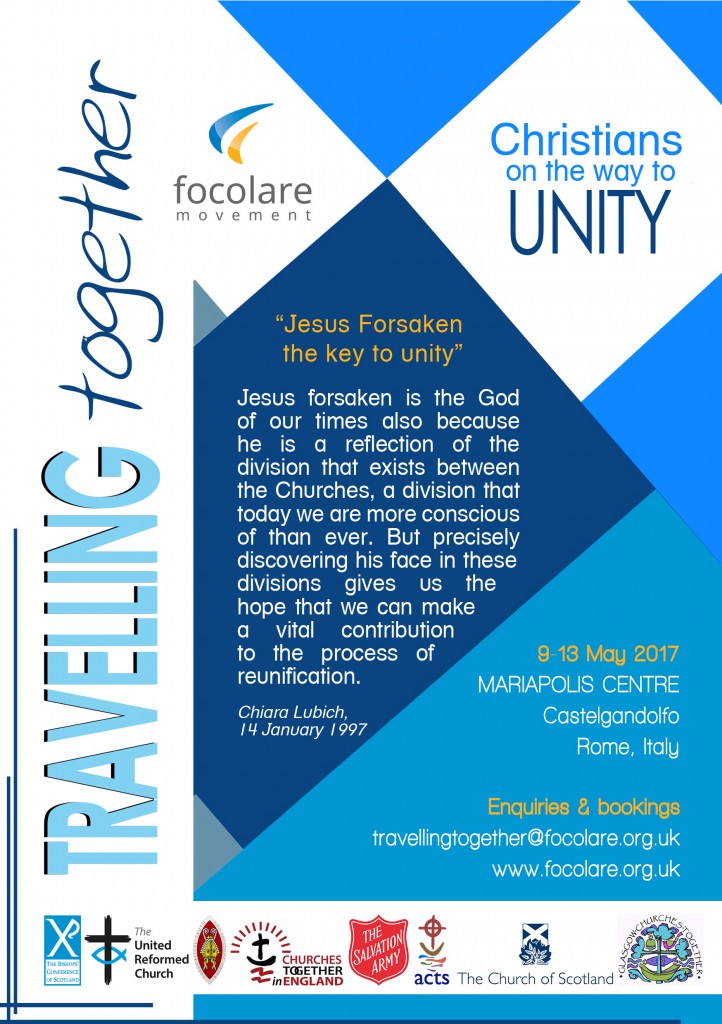 “Unity among Churches requires heroes, heroes in faith, heroes who face history, heroes who are humble in spirit”. Pope Tawadros II said these words in Alexandria, Egypt in 2015, when celebrating the first Day of Friendship between the Orthodox Coptic Church and the Catholic Church. During his recent visit to Cairo, Pope Francis repeated the same thought when he said, “In the light of God who wishes us to be ‘perfectly one’ it is no longer possible to take refuge behind the pretext of differing interpretations, much less of those centuries of history and traditions that estranged us one from the other”. The Pope also spoke about “an already effective communion that grows daily”, the mysterious and ever present fruits of “a genuine ecumenism of blood”, and the importance of progress in our ecumenical journey because “static ecumenism does not exist”. Christians inspired by the Focolare spirituality of unity are convinced of this because of the experience lived in these last years. The 59th Ecumenical Week, to be held at Castelgandolfo, Rome from the 9 to 13 May 2017, blends into the current ecumenical trend, which brings to the foreground gestures, words and statements of Church leaders and also initiatives of Christians in different parts of the world. 700 Christians hailing from 40 countries and belonging to 70 Churches and ecclesial Communities are expected to attend. During this “Ecumenical Mariapoli”, as many prefer to call this event, living together, sharing, spirituality and reflection will take place,and it will be a new step towards “the dialogue of life” and “the ecumenism of the people”. In fact, Chiara envisaged the “dialogue of life” as the typical contribution of the spirituality of unity towards full, visible communion among Churches . It is of utmost importance that people are well prepared ecumenically. Fully aware of the many steps still to be taken and with respect towards all Churches, we try to delve deeper into the common heritage that already unites us. The title of this ecumenical meeting is: “Walking together. Christians on the road to unity”. Its focal point will be a central theme in the spirituality of unity: Jesus crucified and forsaken: the God of our time, foundation for a spirituality of communion. It will be enriched by moments of reflection, dialogue and testimonies of people from different parts of the world, While the 500 years since the Lutheran Reformation are being celebrated in the ecumenical field, among the main speakers, one will find: Bishop Christian Krause, former President of Lutheran World Federation; Rev. Dr. Martin Robra of the World Council of Churches in Geneva; Bishop Brian Farrell, Secretary of the Pontifical Council for Promoting Christian Unity and Maria Voce, President of the Focolare Movement.
“Unity among Churches requires heroes, heroes in faith, heroes who face history, heroes who are humble in spirit”. Pope Tawadros II said these words in Alexandria, Egypt in 2015, when celebrating the first Day of Friendship between the Orthodox Coptic Church and the Catholic Church. During his recent visit to Cairo, Pope Francis repeated the same thought when he said, “In the light of God who wishes us to be ‘perfectly one’ it is no longer possible to take refuge behind the pretext of differing interpretations, much less of those centuries of history and traditions that estranged us one from the other”. The Pope also spoke about “an already effective communion that grows daily”, the mysterious and ever present fruits of “a genuine ecumenism of blood”, and the importance of progress in our ecumenical journey because “static ecumenism does not exist”. Christians inspired by the Focolare spirituality of unity are convinced of this because of the experience lived in these last years. The 59th Ecumenical Week, to be held at Castelgandolfo, Rome from the 9 to 13 May 2017, blends into the current ecumenical trend, which brings to the foreground gestures, words and statements of Church leaders and also initiatives of Christians in different parts of the world. 700 Christians hailing from 40 countries and belonging to 70 Churches and ecclesial Communities are expected to attend. During this “Ecumenical Mariapoli”, as many prefer to call this event, living together, sharing, spirituality and reflection will take place,and it will be a new step towards “the dialogue of life” and “the ecumenism of the people”. In fact, Chiara envisaged the “dialogue of life” as the typical contribution of the spirituality of unity towards full, visible communion among Churches . It is of utmost importance that people are well prepared ecumenically. Fully aware of the many steps still to be taken and with respect towards all Churches, we try to delve deeper into the common heritage that already unites us. The title of this ecumenical meeting is: “Walking together. Christians on the road to unity”. Its focal point will be a central theme in the spirituality of unity: Jesus crucified and forsaken: the God of our time, foundation for a spirituality of communion. It will be enriched by moments of reflection, dialogue and testimonies of people from different parts of the world, While the 500 years since the Lutheran Reformation are being celebrated in the ecumenical field, among the main speakers, one will find: Bishop Christian Krause, former President of Lutheran World Federation; Rev. Dr. Martin Robra of the World Council of Churches in Geneva; Bishop Brian Farrell, Secretary of the Pontifical Council for Promoting Christian Unity and Maria Voce, President of the Focolare Movement.  A special moment has been entrusted to His Most Rev. Eminence Zervos Gennadios, Orthodox Archbishop of Italy and Malta. He will be speaking about: “50 years after the first meeting of two protagonists of dialogue: Ecumenical Patriarch Athenagoras I and Chiara Lubich “. The programme also includes participation in the General audience with Pope Francis at St. Peter’s Square, a visit to St. Peter’s Basilica and to St. Paul Outside the Walls Baslica and common prayers at the St. Domitilla and St. Sebastian Catacombs. This 59th Ecumenical Week is also meant to manifest the Focolare’s renewed ecumenical commitment, expressed recently in the Ottmaring Declaration, which promises to do all that is possible “so that all our activities, initiatives and meetings, both internationally and locally, will be sustained by this open, brotherly behaviour among Christians, while we entrust to God the hastening of our Churches’ journey towards celebrating in the one chalice”. Press Release
A special moment has been entrusted to His Most Rev. Eminence Zervos Gennadios, Orthodox Archbishop of Italy and Malta. He will be speaking about: “50 years after the first meeting of two protagonists of dialogue: Ecumenical Patriarch Athenagoras I and Chiara Lubich “. The programme also includes participation in the General audience with Pope Francis at St. Peter’s Square, a visit to St. Peter’s Basilica and to St. Paul Outside the Walls Baslica and common prayers at the St. Domitilla and St. Sebastian Catacombs. This 59th Ecumenical Week is also meant to manifest the Focolare’s renewed ecumenical commitment, expressed recently in the Ottmaring Declaration, which promises to do all that is possible “so that all our activities, initiatives and meetings, both internationally and locally, will be sustained by this open, brotherly behaviour among Christians, while we entrust to God the hastening of our Churches’ journey towards celebrating in the one chalice”. Press Release
May 10, 2017 | Non categorizzato
On May 10, 2013, Pope Tawadros II of the Coptic Orthodox Church visited Pope Francis at the Vatican for the first time. In memory of that historic meeting, when he returned to Egypt he declared a day of Coptic-Catholic friendship that has been held ever since on May 10. The pope recently repaid the visit when he went to Cairo.
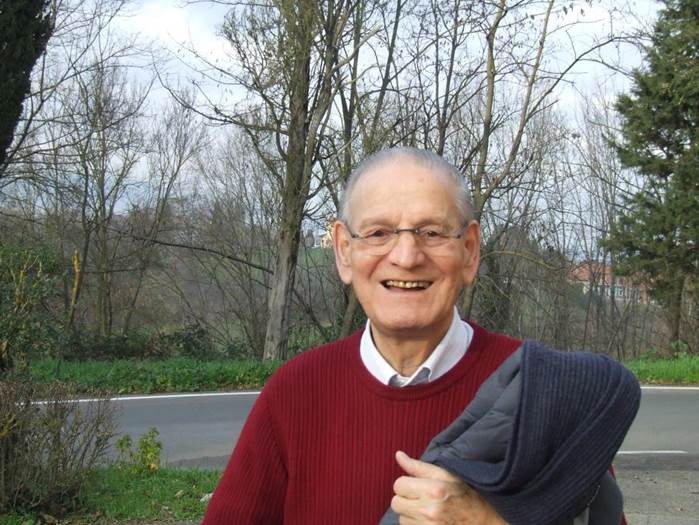
May 9, 2017 | Non categorizzato
 “This evening, Marco Tecilla, the first focolarino, is latest pearl to be added to the crown of Mary. With infinite gratitude, we gather around him in an embrace which unites heaven and earth,” writes Maria Voce, President of the Focolare Movement, when she announced the passing of Marco, the first young man to follow Chiara Lubich in the way of the Focolare. The funeral will be held tomorrow, Wednesday 10th May, at 11.00 am at the Mariapolis Centre in Castel Gandolfo (Rome).
“This evening, Marco Tecilla, the first focolarino, is latest pearl to be added to the crown of Mary. With infinite gratitude, we gather around him in an embrace which unites heaven and earth,” writes Maria Voce, President of the Focolare Movement, when she announced the passing of Marco, the first young man to follow Chiara Lubich in the way of the Focolare. The funeral will be held tomorrow, Wednesday 10th May, at 11.00 am at the Mariapolis Centre in Castel Gandolfo (Rome).
![Celebrating a Europe of Hope in Malta]()
May 9, 2017 | Focolare Worldwide
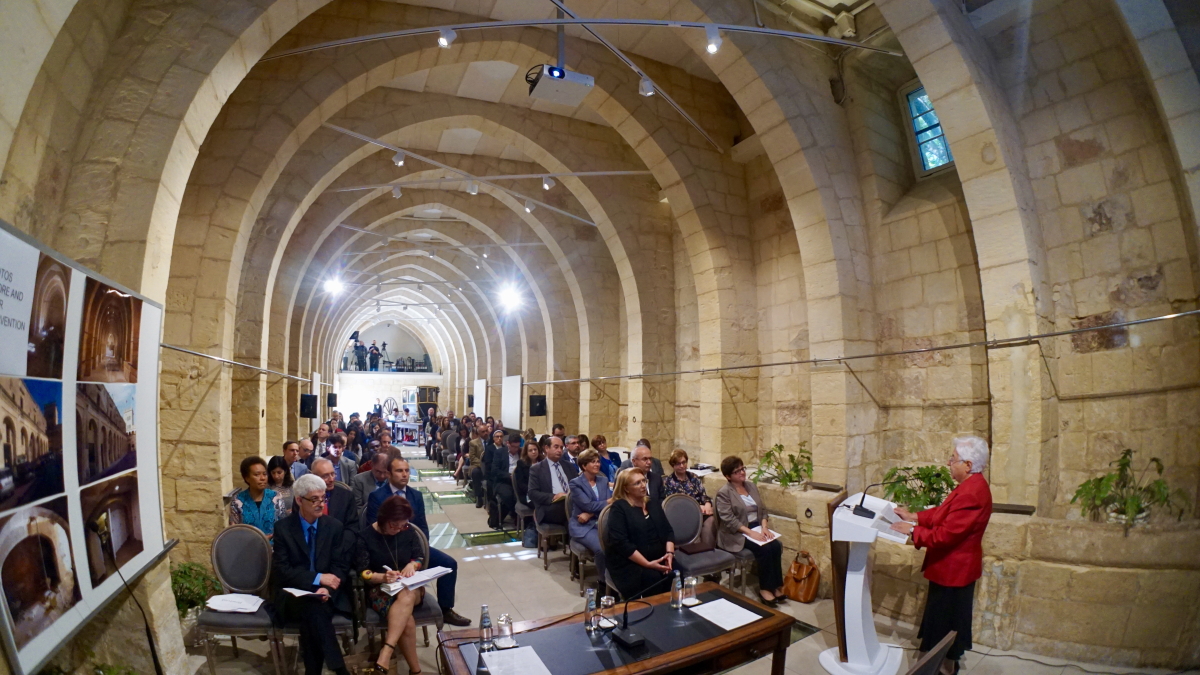 The visit (2-7 May) began with the participation on Monday, 2nd May, in the seminar promoted by “Communion and Law,” entitled, “Law as a means for integration in a multicultural society,” held in a meeting hall at the Presidential Palace, together with around 70 experts in the fields of immigration, education and employment. Among them were representatives of the Maltese Commission for refugees, representatives of the IOM and EASO Malta, Arnold Cassola, President of the Alternative Democratic Party (Alternattiva Demokratika), as well as law teachers and students. In her speech Maria Voce affirmed that the law can became an instrument for integration in society “if we overcome an exclusively formal vision, and focus on the concept of Law as an indispensable means for contributing to the creation of a reality of communion in society.” Citing the Together for Europe experience, born from an inspiration of Chiara Lubich, she talked about the actions that “appear like a prophetic sign of what Europe can become if its citizens will share more, the common experience that goes beyond the different cultures and ecclesiastical faiths,” and thus be a voice of “a Europe which, based on its own roots, opens out without fear to those who ask to be accepted and knows that the blend of peoples that have composed it for centuries can in turn blend with other peoples that will contribute to its development.” Each speech was backed by concrete initiatives, like the TANDEM project – presented by Apollos Pedro from Biafra, but a resident in Italy – which promotes peace and dialogue, giving people of different nationalities and religions the chance to live together.
The visit (2-7 May) began with the participation on Monday, 2nd May, in the seminar promoted by “Communion and Law,” entitled, “Law as a means for integration in a multicultural society,” held in a meeting hall at the Presidential Palace, together with around 70 experts in the fields of immigration, education and employment. Among them were representatives of the Maltese Commission for refugees, representatives of the IOM and EASO Malta, Arnold Cassola, President of the Alternative Democratic Party (Alternattiva Demokratika), as well as law teachers and students. In her speech Maria Voce affirmed that the law can became an instrument for integration in society “if we overcome an exclusively formal vision, and focus on the concept of Law as an indispensable means for contributing to the creation of a reality of communion in society.” Citing the Together for Europe experience, born from an inspiration of Chiara Lubich, she talked about the actions that “appear like a prophetic sign of what Europe can become if its citizens will share more, the common experience that goes beyond the different cultures and ecclesiastical faiths,” and thus be a voice of “a Europe which, based on its own roots, opens out without fear to those who ask to be accepted and knows that the blend of peoples that have composed it for centuries can in turn blend with other peoples that will contribute to its development.” Each speech was backed by concrete initiatives, like the TANDEM project – presented by Apollos Pedro from Biafra, but a resident in Italy – which promotes peace and dialogue, giving people of different nationalities and religions the chance to live together. 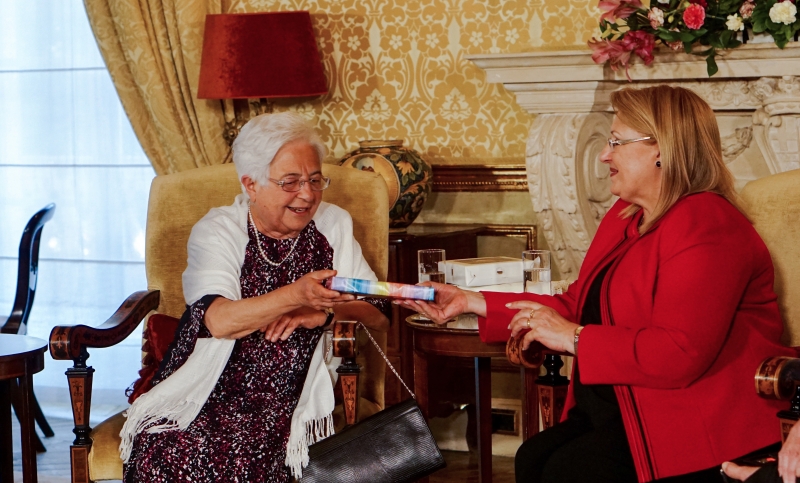 On 4th May, Maria Voce met with the President of the Republic of Malta, Marie-Louise Coleiro Preca, to whom she recounted the various branches of the Focolare Movement in Malta, and in particular the activities of New Humanity and the initiatives of the teenagers and young people. The President showed great interest and in the end, greeted the youth with a warm embrace. “The Focolare is like a vitamin boost. The art of loving is a precursor to positive peace in a world that is increasingly narcissistic and egocentric.” The children then presented her with the “Dice of love”. The Focolare President had been invited by the Malta Diocese, through its Ecumenical Commission, on the occasion of the 40th anniversary of its foundation. In this context, on 5th May, Maria Voce was received by the Archbishop C.J. Scicluna. Immediately afterwards, in the presence of 300 participants, she gave a conference on the topic “Dialogue or Dialogues – A Way of Life”.
On 4th May, Maria Voce met with the President of the Republic of Malta, Marie-Louise Coleiro Preca, to whom she recounted the various branches of the Focolare Movement in Malta, and in particular the activities of New Humanity and the initiatives of the teenagers and young people. The President showed great interest and in the end, greeted the youth with a warm embrace. “The Focolare is like a vitamin boost. The art of loving is a precursor to positive peace in a world that is increasingly narcissistic and egocentric.” The children then presented her with the “Dice of love”. The Focolare President had been invited by the Malta Diocese, through its Ecumenical Commission, on the occasion of the 40th anniversary of its foundation. In this context, on 5th May, Maria Voce was received by the Archbishop C.J. Scicluna. Immediately afterwards, in the presence of 300 participants, she gave a conference on the topic “Dialogue or Dialogues – A Way of Life”. 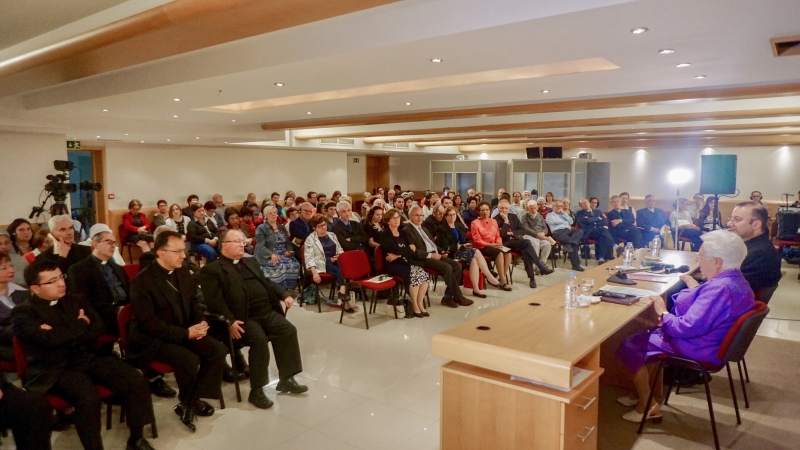 Also present were the Archbishop, the President of the Ecumenical Commission, the Vicar General, the Secretary of the Nunciature of Malta, the Nuncio of the Ivory Coast (of Maltese origin), a representative of the Romanian Orthodox Church, two members of the “Robert Schuman Centre for European Studies” and several members of ecclesial organisations. In tracing the rich history of the Movement’s ecumenical commitment, Maria Voce explained that the method of dialogue which Chiara Lubich promoted is love, “a dialogue between people, not between ideologies of systems of thought. She said that this must necessarily be supported and substantiated by mercy, compassion, and charity, summarised in the Golden Rule present in every culture and religion: Do to others whatever you wish others to do to you (Mt 7:12).” “The only way to ease the way to unity in truth is that of bowing before the others in the attitude of washing their feet (cf Jn 13) instead of telling them off. We need a lot of patience and humbleness.” Lastly, she presented the Ottmaring Declaration, published in Germany last 21 February, in which the Focolare Movement undertakes a greater ecumenical commitment. In the end, the Archbishop thanked Maria Voce for the work of the Focolare Movement in “arousing in people the thirst for unity.” He also recalled a phrase of Paul VI: “the world listens more to witnesses than to teachers.” Read about the Focolare in Malta
Also present were the Archbishop, the President of the Ecumenical Commission, the Vicar General, the Secretary of the Nunciature of Malta, the Nuncio of the Ivory Coast (of Maltese origin), a representative of the Romanian Orthodox Church, two members of the “Robert Schuman Centre for European Studies” and several members of ecclesial organisations. In tracing the rich history of the Movement’s ecumenical commitment, Maria Voce explained that the method of dialogue which Chiara Lubich promoted is love, “a dialogue between people, not between ideologies of systems of thought. She said that this must necessarily be supported and substantiated by mercy, compassion, and charity, summarised in the Golden Rule present in every culture and religion: Do to others whatever you wish others to do to you (Mt 7:12).” “The only way to ease the way to unity in truth is that of bowing before the others in the attitude of washing their feet (cf Jn 13) instead of telling them off. We need a lot of patience and humbleness.” Lastly, she presented the Ottmaring Declaration, published in Germany last 21 February, in which the Focolare Movement undertakes a greater ecumenical commitment. In the end, the Archbishop thanked Maria Voce for the work of the Focolare Movement in “arousing in people the thirst for unity.” He also recalled a phrase of Paul VI: “the world listens more to witnesses than to teachers.” Read about the Focolare in Malta
May 9, 2017 | Non categorizzato
Peace and unity are celebrated in Europe on May 9th. The date recalls the historic Schuman Declaration of May 9, 1950, in which the then French foreign minister proposed the creation of an economic community that would lead to the construction of a federation of European States that was indispensable in preserving peace. As a first step, Robert Schuman proposed the creation of a Coal and Steel Community for France and West Germany that could one day include other countries. He thus laid the foundations for a broader and much more comprehensive integration, to the point that today the Declaration is considered to be the symbolic beginning of the long process of peace and stability that led to the European Union. The celebration has always been an occasion to draw citizens, institutions and populations nearer to nearer to one another, increasing awareness that the human community should be founded on values of peace, integration and solidarity.
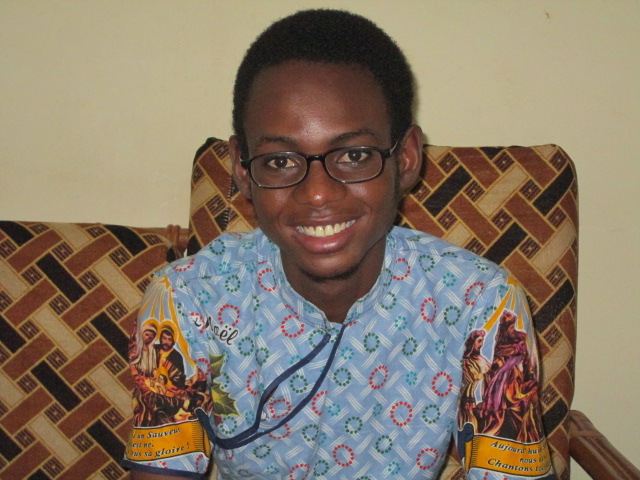
May 8, 2017 | Non categorizzato
 «Ever since our parents separated, my sister and I have been living with our father. It is a very difficult situation for me, also due to my health. I have been suffering from asthma and for two years now, also heart problems. Thanks to the support of many youths who like me try to live the spirituality of unity, these physical limits do not hinder me from living my Christian commitment with enthusiasm. Instead, as a student, things were not going well. In the public school I was attending, there was not much attention for students in my situation, and when I found out that I had to repeat the first year of high school, I changed school. In the new school I understood better the importance of education and the advantage of achieving a diploma. At the start of the year, my grades were good: evidently the new incentive was working well. One evening I had a terrible headache. I hoped that it would pass during the night since in the next days I was expecting a series of tests. Effectively in the morning the headache had disappeared, but when I took my books in hand, it returned, stronger than ever. The same thing happened every time I tried to concentrate on an intellectual task. I went to many hospitals but none were able to diagnose my disease. Meanwhile the average of my grades dropped, while my headache had become a permanent thing. My father had no more money to pay the doctors, so I tried to consult the traditional quack doctors, to no avail. Overcome by this situation strong doubts of faith started to assault me. I asked myself: out of seven billion people in this situation, why did this have to happen precisely to me, now that I had decided to take my studies seriously? Despite my rebellion I wanted to participate with the Gen in an educational weekend. I attended only to see my friends, and not really because I believed in it. The meeting started with a video-speech of Chiara Lubich, but I was so angry with God that I didn’t even listen, or want to give my contribution to the communion of goods. I was even less interested in what the others were saying. My mind wandered elsewhere. I thought that God had forgotten me, no one could understand me, and these meetings were useless. At a certain point, however, I was struck by a boy who said that in difficult moments we can give hope to others by valorizing our personal sufferings. And that it is precisely in making ourselves one with Jesus crucified and forsaken that we find the strength to love the others. These words were like a challenge to me. I said to myself: if Jesus on the cross had pulled back, what would we do now. From that moment on I found the strength to accept my situation and the certainty that God is love also when he permits suffering. And even if I continued to have headaches, I found the joy of living again, out of love for my sister and all those who tried to bring joy all around me. Thanks to the prayers of many, today I feel much better and if there are no other surprises, it seems that even my health has returned.»
«Ever since our parents separated, my sister and I have been living with our father. It is a very difficult situation for me, also due to my health. I have been suffering from asthma and for two years now, also heart problems. Thanks to the support of many youths who like me try to live the spirituality of unity, these physical limits do not hinder me from living my Christian commitment with enthusiasm. Instead, as a student, things were not going well. In the public school I was attending, there was not much attention for students in my situation, and when I found out that I had to repeat the first year of high school, I changed school. In the new school I understood better the importance of education and the advantage of achieving a diploma. At the start of the year, my grades were good: evidently the new incentive was working well. One evening I had a terrible headache. I hoped that it would pass during the night since in the next days I was expecting a series of tests. Effectively in the morning the headache had disappeared, but when I took my books in hand, it returned, stronger than ever. The same thing happened every time I tried to concentrate on an intellectual task. I went to many hospitals but none were able to diagnose my disease. Meanwhile the average of my grades dropped, while my headache had become a permanent thing. My father had no more money to pay the doctors, so I tried to consult the traditional quack doctors, to no avail. Overcome by this situation strong doubts of faith started to assault me. I asked myself: out of seven billion people in this situation, why did this have to happen precisely to me, now that I had decided to take my studies seriously? Despite my rebellion I wanted to participate with the Gen in an educational weekend. I attended only to see my friends, and not really because I believed in it. The meeting started with a video-speech of Chiara Lubich, but I was so angry with God that I didn’t even listen, or want to give my contribution to the communion of goods. I was even less interested in what the others were saying. My mind wandered elsewhere. I thought that God had forgotten me, no one could understand me, and these meetings were useless. At a certain point, however, I was struck by a boy who said that in difficult moments we can give hope to others by valorizing our personal sufferings. And that it is precisely in making ourselves one with Jesus crucified and forsaken that we find the strength to love the others. These words were like a challenge to me. I said to myself: if Jesus on the cross had pulled back, what would we do now. From that moment on I found the strength to accept my situation and the certainty that God is love also when he permits suffering. And even if I continued to have headaches, I found the joy of living again, out of love for my sister and all those who tried to bring joy all around me. Thanks to the prayers of many, today I feel much better and if there are no other surprises, it seems that even my health has returned.»
May 7, 2017 | Non categorizzato
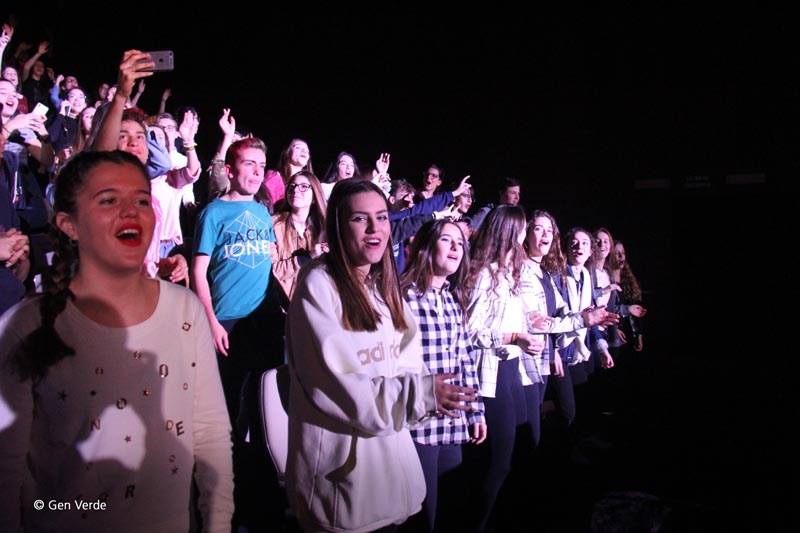
May 6, 2017 | Non categorizzato
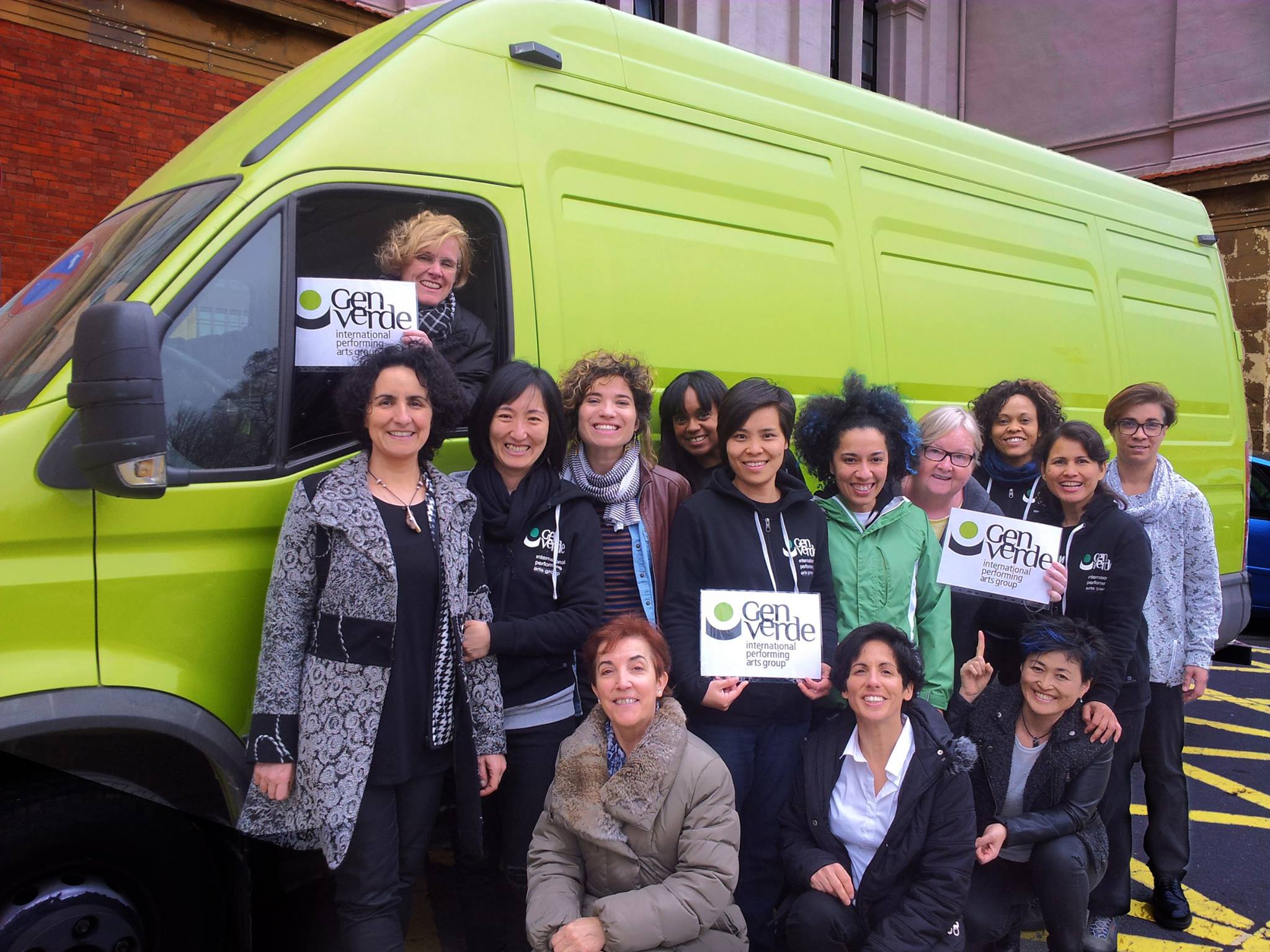 Recent opinion polls paint a bleak picture of Spanish young people describing them as disillusioned by politics, suspicious of social programs, imprisoned by an uncertainty that shatters their dreams and hopes for the future. They would appear to be practically an “existential periphery” abandoned to itself. And yet, during their recently concluded long tour, Gen Verde came across young people who were upbeat,resourceful, hoping to live meaningful and generous experiences, while at the same time accepting the challenge they bring. The group brought their show “On the Other Side” featuring the “Start Now Project” to a number of Spanish cities. Its tried and tested formula, involves five days of living together with young people. Three are dedicated to workshops where the band – made up of 22 people from 14 countries – work on singing, drama, percussion and dance. Then there is one day for rehearsals and the show, which they put on together with the young people. The last day is to share feedback on the experience lived together. These are moments in which everyone has an opportunity to experience fraternity, to see with their own eyes that what they are looking for exists and can be achieved. We can definitely talk about a before and after the workshops,” affirms Sally McAllister, the Irish manager of the group. “The young people work hard, not just in terms of preparing a performance, but on relating to each other as well. They meet those who are different from themselves, and they learn how to manage the cultural complexity of the people they interact with, and how to appreciate the positive, enriching values. So the goal is to enable them to have an experience which is enriching for them as human beings, as well as artistically, so they can become people who are able to welcome, understand and value others, whoever they are. They pass from a sense of insecurity, fear, and even hate sometimes, to attitudes that are based on trust and inclusion.”
Recent opinion polls paint a bleak picture of Spanish young people describing them as disillusioned by politics, suspicious of social programs, imprisoned by an uncertainty that shatters their dreams and hopes for the future. They would appear to be practically an “existential periphery” abandoned to itself. And yet, during their recently concluded long tour, Gen Verde came across young people who were upbeat,resourceful, hoping to live meaningful and generous experiences, while at the same time accepting the challenge they bring. The group brought their show “On the Other Side” featuring the “Start Now Project” to a number of Spanish cities. Its tried and tested formula, involves five days of living together with young people. Three are dedicated to workshops where the band – made up of 22 people from 14 countries – work on singing, drama, percussion and dance. Then there is one day for rehearsals and the show, which they put on together with the young people. The last day is to share feedback on the experience lived together. These are moments in which everyone has an opportunity to experience fraternity, to see with their own eyes that what they are looking for exists and can be achieved. We can definitely talk about a before and after the workshops,” affirms Sally McAllister, the Irish manager of the group. “The young people work hard, not just in terms of preparing a performance, but on relating to each other as well. They meet those who are different from themselves, and they learn how to manage the cultural complexity of the people they interact with, and how to appreciate the positive, enriching values. So the goal is to enable them to have an experience which is enriching for them as human beings, as well as artistically, so they can become people who are able to welcome, understand and value others, whoever they are. They pass from a sense of insecurity, fear, and even hate sometimes, to attitudes that are based on trust and inclusion.”  Gen Verde are not offering a pie in the sky illusion, but ideals and tools with which to build the world we all dream of -starting here and now with each person. And everywhere “young people are like fire – all you need to do is provide the spark, and who can stop them once they set aflame?” And so it was along the various stages of the journey: Burgos, Jaén, Murcia, Huétor Tájar, Albacete, Pozuelo, Bilbao, Pamplona, Azpeitia, Talavera de la Reina … each with its own colour and unrepeatable characteristics, as we can see from the news on the Gen Verde website. These authentic exchanges were welcomed enthusiastically everywhere, such as at Huétor Tájar, where the bienvenida (welcome) came from a square teeming with families, youth and children, with music and songs from the group on huge screens. At the end around 30 of the youngest students from a school of flamenco and rhythmic gymnastics danced to a flamenco version of Gen Verde’s new song “Turn It Up.” A country of sad, hopeless young people? Anything but, the feedback says clearly. “I cried, I smiled, I danced… but above all I came away with a great hope in a world that really needs it.” “I learned values without anyone telling me what to do.” “After just a few days of work it felt like we were a true family.” “I discovered that people who work for a common goal are more open.” “There was nothing theoretical; all together we put into practice the values of fraternity, dialogue and sharing that we learned these days as we worked.” “Start Now is something fantastic, a project that is educational, social, cultural and spiritual.” The words that best sum up the legacy of the tour come from one of the many young people Gen Verde met. Simple and tangible, they express both achallenge and a commitment: “If we have a dream, we don’t want to achieve it tomorrow, we want to do it today, if we possibly can.”
Gen Verde are not offering a pie in the sky illusion, but ideals and tools with which to build the world we all dream of -starting here and now with each person. And everywhere “young people are like fire – all you need to do is provide the spark, and who can stop them once they set aflame?” And so it was along the various stages of the journey: Burgos, Jaén, Murcia, Huétor Tájar, Albacete, Pozuelo, Bilbao, Pamplona, Azpeitia, Talavera de la Reina … each with its own colour and unrepeatable characteristics, as we can see from the news on the Gen Verde website. These authentic exchanges were welcomed enthusiastically everywhere, such as at Huétor Tájar, where the bienvenida (welcome) came from a square teeming with families, youth and children, with music and songs from the group on huge screens. At the end around 30 of the youngest students from a school of flamenco and rhythmic gymnastics danced to a flamenco version of Gen Verde’s new song “Turn It Up.” A country of sad, hopeless young people? Anything but, the feedback says clearly. “I cried, I smiled, I danced… but above all I came away with a great hope in a world that really needs it.” “I learned values without anyone telling me what to do.” “After just a few days of work it felt like we were a true family.” “I discovered that people who work for a common goal are more open.” “There was nothing theoretical; all together we put into practice the values of fraternity, dialogue and sharing that we learned these days as we worked.” “Start Now is something fantastic, a project that is educational, social, cultural and spiritual.” The words that best sum up the legacy of the tour come from one of the many young people Gen Verde met. Simple and tangible, they express both achallenge and a commitment: “If we have a dream, we don’t want to achieve it tomorrow, we want to do it today, if we possibly can.”
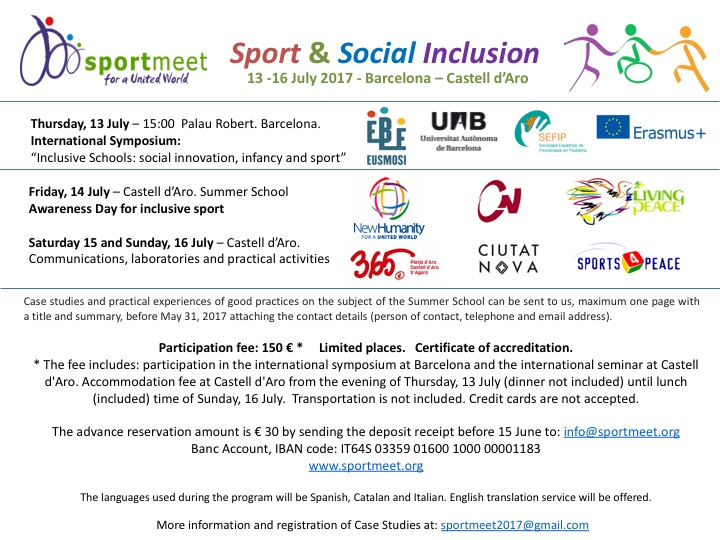
May 5, 2017 | Non categorizzato
 Summer school 2017 ENG
Summer school 2017 ENG
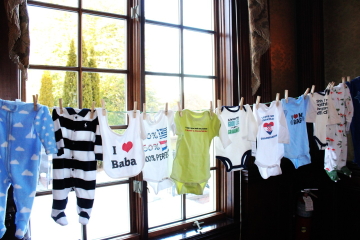
May 5, 2017 | Non categorizzato
 Trusting in God “At the news that I was expecting twins, we entrusted ourselves to God. We already had six children and my husband wasn’t earning much. One day, a friend of mine, also pregnant, was undergoing some economic difficulties. I gave her some of my children’s things. A few days after, I received a gift of two beautiful and valuable baby-care kits from my aunt. Furthermore, just after the birth of the twins, my husband got a promotion with a remarkable salary increase. This encouraged us to always trust in God.” A.M. – Brazil A small light “It is a confusing and problematic period at home. There are days when at times I experience moments of darkness and abandonment. But a mother like me should not give up: what matters is to love my family the way I am. I am not alone! I saw that only through detachment from ourselves, and taking Mary as a model can make us progress. I started to live this way and God sent me a small light. If I continue to be guided by love, this light will grow and God will make it shine for all”. Margrit – Switzerland From the diary of a terminally ill person “I am deeply convinced that the Lord loves us always whether he consoles us or puts us to the test, to fulfil His masterpiece in us in a short time. With the passing of time, many useless things have happened in my life, like dead leaves in autumn. And now between Him and me, there is a more direct relationship, without intermediaries. For some years now, new health trials have begun. Recently a more serious one came up, for which a remedy still has not been found. It seems that my life is entering into a narrow passage. But at the same time I feel that God is closer to me and that my days are in His hands.” Filippo – Italy An old paralysed religious “Ever since I was struck by a paralysis in my lower limbs a few years ago, I have had to fight the temptation of feeling that I have been left on a ‘dead-end track’. Now I depend on others for all my needs. The world for me has become a room, and I have to entrust myself to faith to give a meaning to my life and discover its value. It’s true that, given my conditions, I can no longer influence the near and far events. However, I have this marvellous adventure to live. All can be an occasion for praise, thanks, prayer, and offering. Also Jesus on the cross no longer worked miracles or announced the Kingdom, but continued to love, and on the other hand, manifested a greater and purer love. Being motionless does not signify stagnation.” Fr Vittorio – Italy
Trusting in God “At the news that I was expecting twins, we entrusted ourselves to God. We already had six children and my husband wasn’t earning much. One day, a friend of mine, also pregnant, was undergoing some economic difficulties. I gave her some of my children’s things. A few days after, I received a gift of two beautiful and valuable baby-care kits from my aunt. Furthermore, just after the birth of the twins, my husband got a promotion with a remarkable salary increase. This encouraged us to always trust in God.” A.M. – Brazil A small light “It is a confusing and problematic period at home. There are days when at times I experience moments of darkness and abandonment. But a mother like me should not give up: what matters is to love my family the way I am. I am not alone! I saw that only through detachment from ourselves, and taking Mary as a model can make us progress. I started to live this way and God sent me a small light. If I continue to be guided by love, this light will grow and God will make it shine for all”. Margrit – Switzerland From the diary of a terminally ill person “I am deeply convinced that the Lord loves us always whether he consoles us or puts us to the test, to fulfil His masterpiece in us in a short time. With the passing of time, many useless things have happened in my life, like dead leaves in autumn. And now between Him and me, there is a more direct relationship, without intermediaries. For some years now, new health trials have begun. Recently a more serious one came up, for which a remedy still has not been found. It seems that my life is entering into a narrow passage. But at the same time I feel that God is closer to me and that my days are in His hands.” Filippo – Italy An old paralysed religious “Ever since I was struck by a paralysis in my lower limbs a few years ago, I have had to fight the temptation of feeling that I have been left on a ‘dead-end track’. Now I depend on others for all my needs. The world for me has become a room, and I have to entrust myself to faith to give a meaning to my life and discover its value. It’s true that, given my conditions, I can no longer influence the near and far events. However, I have this marvellous adventure to live. All can be an occasion for praise, thanks, prayer, and offering. Also Jesus on the cross no longer worked miracles or announced the Kingdom, but continued to love, and on the other hand, manifested a greater and purer love. Being motionless does not signify stagnation.” Fr Vittorio – Italy
May 4, 2017 | Non categorizzato
The sports relay race promoted by the Teens for Unity of the Focolare Movement is about to start. It takes place every year, on the first Sunday of May, from 11 am to 12 noon (in the various time zones), during the United World Week. The baton is passed across the planet, with sports events, actions of solidarity and proactive citizens projects, especially in places marked by solitude, poverty, isolation. Important figures of the world of sports and culture, civil and religious authorities will participate. The web site will help in gathering in real time the social network contributions. In the previous editions, the relay race involved over 100,000 teenagers worldwide.
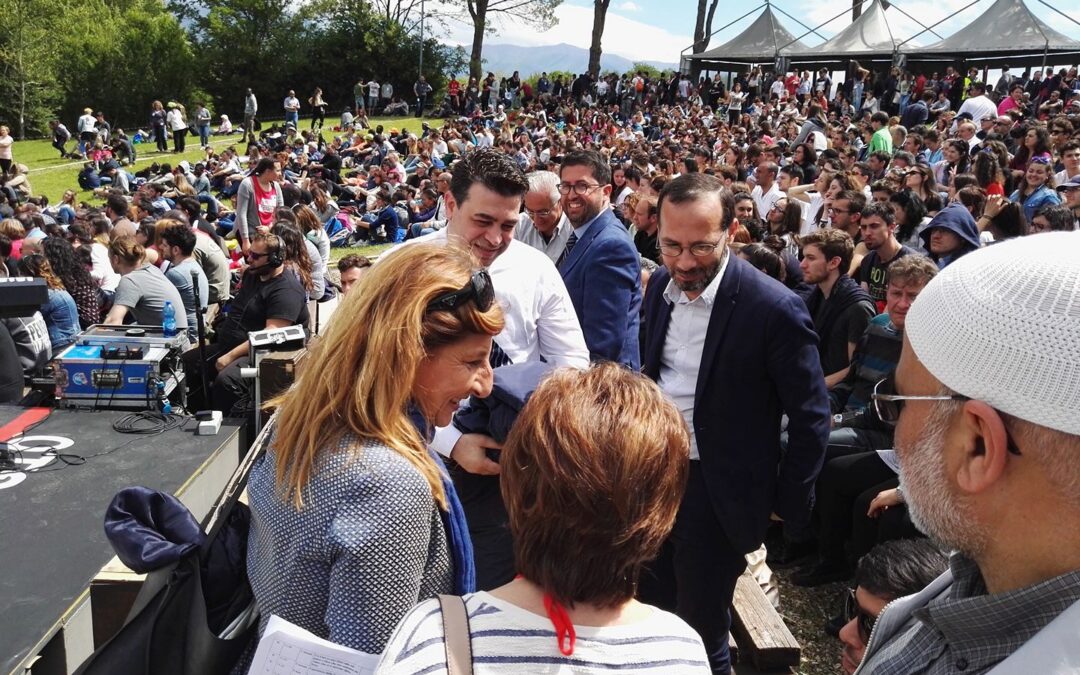
May 4, 2017 | Focolare Worldwide
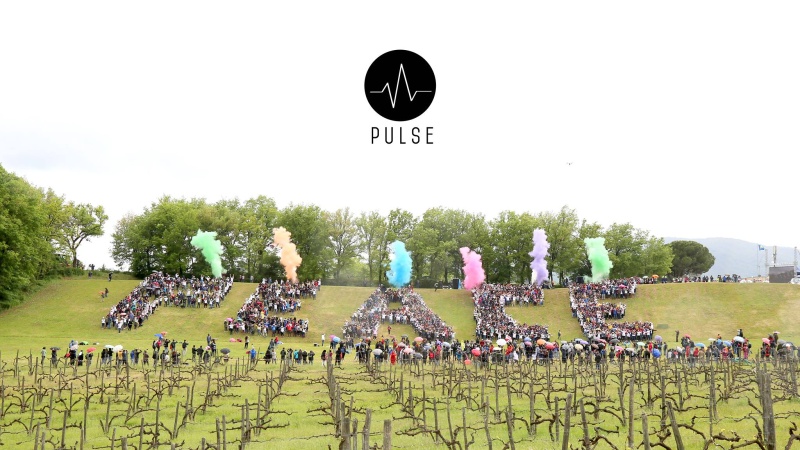 One image stood out, the word PEACE formed by the participants themselves on the front of a hill. One sound stood out, the sound of hand clapping to the same beat, a symbol of many hearts together in the boat of life where we are all migrant voyagers. On song for all, Hope is the eternal voice that guides us towards salvation. The annual appointment came to its symbolic end beneath an explosion of cannons loaded with colours – from green to fuchsia, on the first of May in Loppiano, at the International Meeting of Young People for a United World, during United World Week 2017, which was titled “Pulse: Change your heart, change the world.” Ever since 1973 when the first edition of the event was held in the small city of central Italy, a colourful crowd of crowd of thousands of young people from Italy, Europe and around the world have descended on Loppiano every May. It is a festive event that is like a model of living in peace with others, beginning from the young people, generations that are interconnected by nature and culture, and more inclined to putting up bridges rather than walls. Daily events included discussions, testimonies, music, dance, choreographies, all in the name of peace and the construction of a more united world, which has seen the commitment of the young people from t he Focolare Movement in collaboration with other associations and movements, such as New Horizons, the Community of San Egidio, La Pira International Centre, Living Peace, Robins, Barbiana, Economia disarmata, Il varco, and Non dalla guerra.There was a significant presence from the Muslim community of Italy, with support from the Imams of Massa Carrara, Teramo, Trieste and Veneto. The artistic quality was ensured thanks to the Gen Rosso and Gen Verde musical groups, DanceLab Cultural Harmony Associaton, singing performers Amara and Paolo Vallesi, who were on their way back from the Sanremo Musical Festival, and numerous other bands from different cities of Italy – all of them united by a strong desire for peace, and by the dream of a more inclusive world, more equal and fraternal. And that enthusiasm, not even the rain could wash away. While the greats of the world threaten new and ruinous acts of war, which are appalling to most, on the main stage of the natural amphitheatre of Loppiano, a series of stories “from below” were being proclaimed, real stories that if they were told enough times would change the course of history. Like the story of Mohamed, recounted by Luca, who had arrived in Italy in a boat after a dangerous crossing. Or like the story of a group of very young Christians from Syria who in a video message expressed their love for their martyred land. The forward gaze of the Harmony Dancelab Association was not a fake facade of pacifism, while it is holding Fine Arts workshops for children of the Palestinian territories with the help of Father Ibrahim Faltas from the Custody of the Holy Land.
One image stood out, the word PEACE formed by the participants themselves on the front of a hill. One sound stood out, the sound of hand clapping to the same beat, a symbol of many hearts together in the boat of life where we are all migrant voyagers. On song for all, Hope is the eternal voice that guides us towards salvation. The annual appointment came to its symbolic end beneath an explosion of cannons loaded with colours – from green to fuchsia, on the first of May in Loppiano, at the International Meeting of Young People for a United World, during United World Week 2017, which was titled “Pulse: Change your heart, change the world.” Ever since 1973 when the first edition of the event was held in the small city of central Italy, a colourful crowd of crowd of thousands of young people from Italy, Europe and around the world have descended on Loppiano every May. It is a festive event that is like a model of living in peace with others, beginning from the young people, generations that are interconnected by nature and culture, and more inclined to putting up bridges rather than walls. Daily events included discussions, testimonies, music, dance, choreographies, all in the name of peace and the construction of a more united world, which has seen the commitment of the young people from t he Focolare Movement in collaboration with other associations and movements, such as New Horizons, the Community of San Egidio, La Pira International Centre, Living Peace, Robins, Barbiana, Economia disarmata, Il varco, and Non dalla guerra.There was a significant presence from the Muslim community of Italy, with support from the Imams of Massa Carrara, Teramo, Trieste and Veneto. The artistic quality was ensured thanks to the Gen Rosso and Gen Verde musical groups, DanceLab Cultural Harmony Associaton, singing performers Amara and Paolo Vallesi, who were on their way back from the Sanremo Musical Festival, and numerous other bands from different cities of Italy – all of them united by a strong desire for peace, and by the dream of a more inclusive world, more equal and fraternal. And that enthusiasm, not even the rain could wash away. While the greats of the world threaten new and ruinous acts of war, which are appalling to most, on the main stage of the natural amphitheatre of Loppiano, a series of stories “from below” were being proclaimed, real stories that if they were told enough times would change the course of history. Like the story of Mohamed, recounted by Luca, who had arrived in Italy in a boat after a dangerous crossing. Or like the story of a group of very young Christians from Syria who in a video message expressed their love for their martyred land. The forward gaze of the Harmony Dancelab Association was not a fake facade of pacifism, while it is holding Fine Arts workshops for children of the Palestinian territories with the help of Father Ibrahim Faltas from the Custody of the Holy Land. 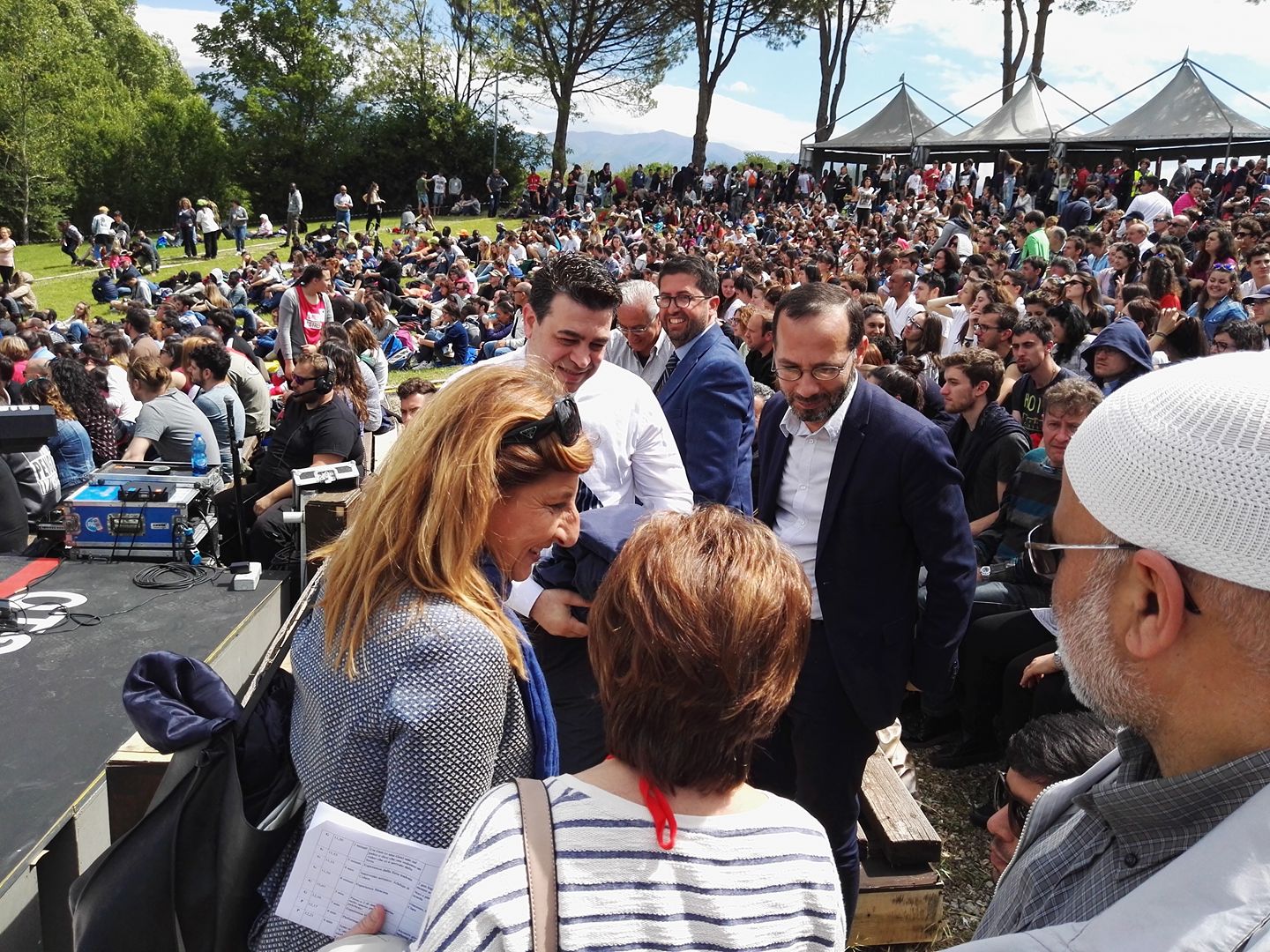 Heedless of all the rain, on the first afternoon, the young people began to trace the silhouette of a boat. Or perhaps the rain was precisely the missing detail, since the the journeys of today’s immigrants who are at the mercy of the waves in the hope of finding a peaceful and dignified future, are not void of threats and dangers. This is something that Giusi Nicolini, Mayor of Lambedusa, Italy and 2017 Peace Prize winner knows well. It’s raining on the hill as the message of peace is being formed, which is the theme of the musical piece by Amara and Paolo Vallesi, and it has become the theme of the day. But the brilliant colours exploding from un-warlike cannons, manage to overcome the grey clouds, the same colours that the young people gather from large sacks, before departing amidst a festive atmosphere. It represents the promise and commitment to “get their hands dirty” in bringing about a world of peace.
Heedless of all the rain, on the first afternoon, the young people began to trace the silhouette of a boat. Or perhaps the rain was precisely the missing detail, since the the journeys of today’s immigrants who are at the mercy of the waves in the hope of finding a peaceful and dignified future, are not void of threats and dangers. This is something that Giusi Nicolini, Mayor of Lambedusa, Italy and 2017 Peace Prize winner knows well. It’s raining on the hill as the message of peace is being formed, which is the theme of the musical piece by Amara and Paolo Vallesi, and it has become the theme of the day. But the brilliant colours exploding from un-warlike cannons, manage to overcome the grey clouds, the same colours that the young people gather from large sacks, before departing amidst a festive atmosphere. It represents the promise and commitment to “get their hands dirty” in bringing about a world of peace.
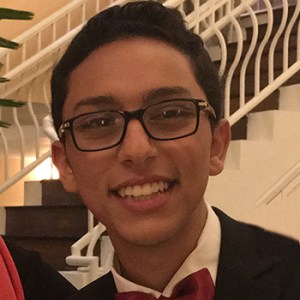
May 3, 2017 | Focolare Worldwide, Senza categoria
 “May peace be with you,” Omar Abou Baker exhorts, who has been a peace ambassador since 2016 when the World Forum of Young People for Peace, held in Egypt, named him and 47 other young people between the ages of 8 and 23 ambassadors of peace. “I belong to the Heliopolis Choir of Cairo, which was begun for the sole purpose of spreading a culture of peace. Last year we organized a celebration for World Peace Day. This was the first time we presented ourselves to different embassies, explaining who we are and what our goal is. Through our shows we managed to convey to a vast audience that included ambassadors, actors, songs and famous people, our desire to build peace in our world.” During Ramadan, a sacred month for the Muslim world, when you fast from first light until sundown, the ambassadors organized dinners for 400 people in need. Everyone got to work using their own special talents: some got food, others presented songs, recitations, dances, games, face-painting for the children . . . But mostly we put our efforts into creating personal relationships. Together with other organizations we were able to hold a marathon for athletes with disabilities. Their lives represent a constant challenge. Each ambassador was responsible for one aspect of the event. The choir prepared songs to celebrate their feats; others worked on presentations, taking pictures or running particular events and workshops. On the National Day of Orphans the children sang in the choir with us. It was a meaningful experience for them, because by expressing themselves through music, they developed a bit more self confidence.” “I believe that peace is a very high concept that is attainable only if people make every effort possible to render it real. Because peace isn’t a word in an article or a lyric in a song. It’s a common effort that should be based on a whole series of values to be lived out by each and every one of us: justice, tolerance, helping others . . . The only way to actually build a world of peace and brotherhood is to put love into action. If I’m here today,” Omar concluded, “it’s to testify both with my word and with my life, that peace is possible if it begins from me.”
“May peace be with you,” Omar Abou Baker exhorts, who has been a peace ambassador since 2016 when the World Forum of Young People for Peace, held in Egypt, named him and 47 other young people between the ages of 8 and 23 ambassadors of peace. “I belong to the Heliopolis Choir of Cairo, which was begun for the sole purpose of spreading a culture of peace. Last year we organized a celebration for World Peace Day. This was the first time we presented ourselves to different embassies, explaining who we are and what our goal is. Through our shows we managed to convey to a vast audience that included ambassadors, actors, songs and famous people, our desire to build peace in our world.” During Ramadan, a sacred month for the Muslim world, when you fast from first light until sundown, the ambassadors organized dinners for 400 people in need. Everyone got to work using their own special talents: some got food, others presented songs, recitations, dances, games, face-painting for the children . . . But mostly we put our efforts into creating personal relationships. Together with other organizations we were able to hold a marathon for athletes with disabilities. Their lives represent a constant challenge. Each ambassador was responsible for one aspect of the event. The choir prepared songs to celebrate their feats; others worked on presentations, taking pictures or running particular events and workshops. On the National Day of Orphans the children sang in the choir with us. It was a meaningful experience for them, because by expressing themselves through music, they developed a bit more self confidence.” “I believe that peace is a very high concept that is attainable only if people make every effort possible to render it real. Because peace isn’t a word in an article or a lyric in a song. It’s a common effort that should be based on a whole series of values to be lived out by each and every one of us: justice, tolerance, helping others . . . The only way to actually build a world of peace and brotherhood is to put love into action. If I’m here today,” Omar concluded, “it’s to testify both with my word and with my life, that peace is possible if it begins from me.”
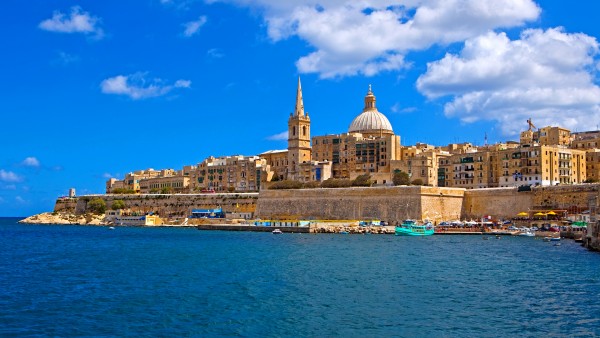
May 2, 2017 | Non categorizzato
Schedule of meetings  2 May: Maria Voce, President of the Focolare Movement, will be the guest of honour at a seminar organised by Communion & Law entitled “Law as a Tool for Integration in a Multicultural Society” at San Anton Palace, Attard, with the participation of experts from various fields of immigration, education and employment. 4 May: Meeting with the President of the Republic of Malta, Her Excellency Marie-Louise Coleiro Preca. 5 May: Meeting with the Archbishop of Malta, Monsignor C.J. Scicluna. Maria Voce was invited by the Diocese of Malta, through its Ecumenical Commission, on the 40th anniversary of its founding. In that context, she will hold a public conference entitled “Dialogue or Dialogues? A Way of Life”. 7 May: The opening ceremony of the State of Europe Forum entitled “Towards a Europe of Hope, Healing and Hospitality” will take place at the Anglican Cathedral of St. Paul, and will thereafter proceed in a procession to the Catholic Co-Cathedral of St John, where Maria Voce and the Archbishop of Malta, Monsignor C.J. Scicluna, will address those present.
2 May: Maria Voce, President of the Focolare Movement, will be the guest of honour at a seminar organised by Communion & Law entitled “Law as a Tool for Integration in a Multicultural Society” at San Anton Palace, Attard, with the participation of experts from various fields of immigration, education and employment. 4 May: Meeting with the President of the Republic of Malta, Her Excellency Marie-Louise Coleiro Preca. 5 May: Meeting with the Archbishop of Malta, Monsignor C.J. Scicluna. Maria Voce was invited by the Diocese of Malta, through its Ecumenical Commission, on the 40th anniversary of its founding. In that context, she will hold a public conference entitled “Dialogue or Dialogues? A Way of Life”. 7 May: The opening ceremony of the State of Europe Forum entitled “Towards a Europe of Hope, Healing and Hospitality” will take place at the Anglican Cathedral of St. Paul, and will thereafter proceed in a procession to the Catholic Co-Cathedral of St John, where Maria Voce and the Archbishop of Malta, Monsignor C.J. Scicluna, will address those present.
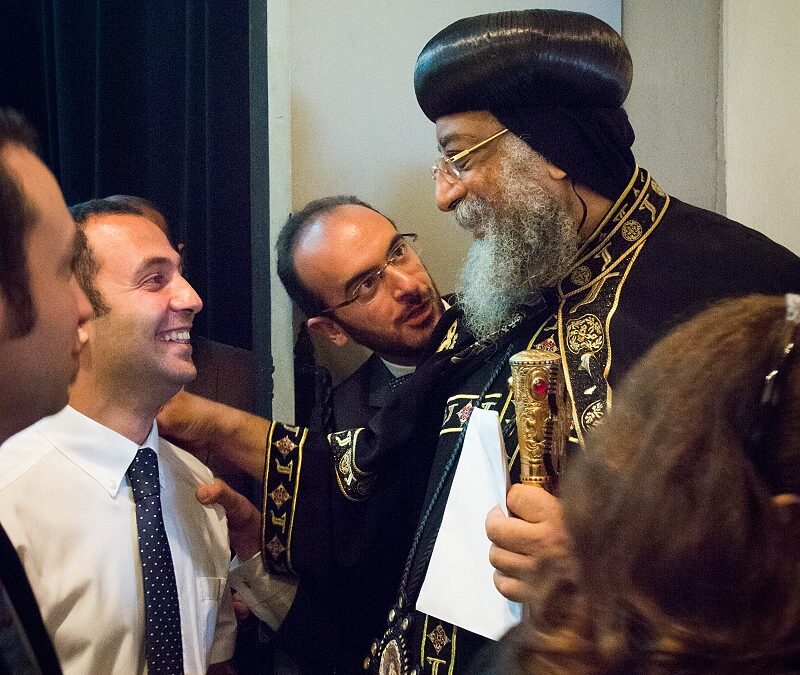
May 2, 2017 | Non categorizzato
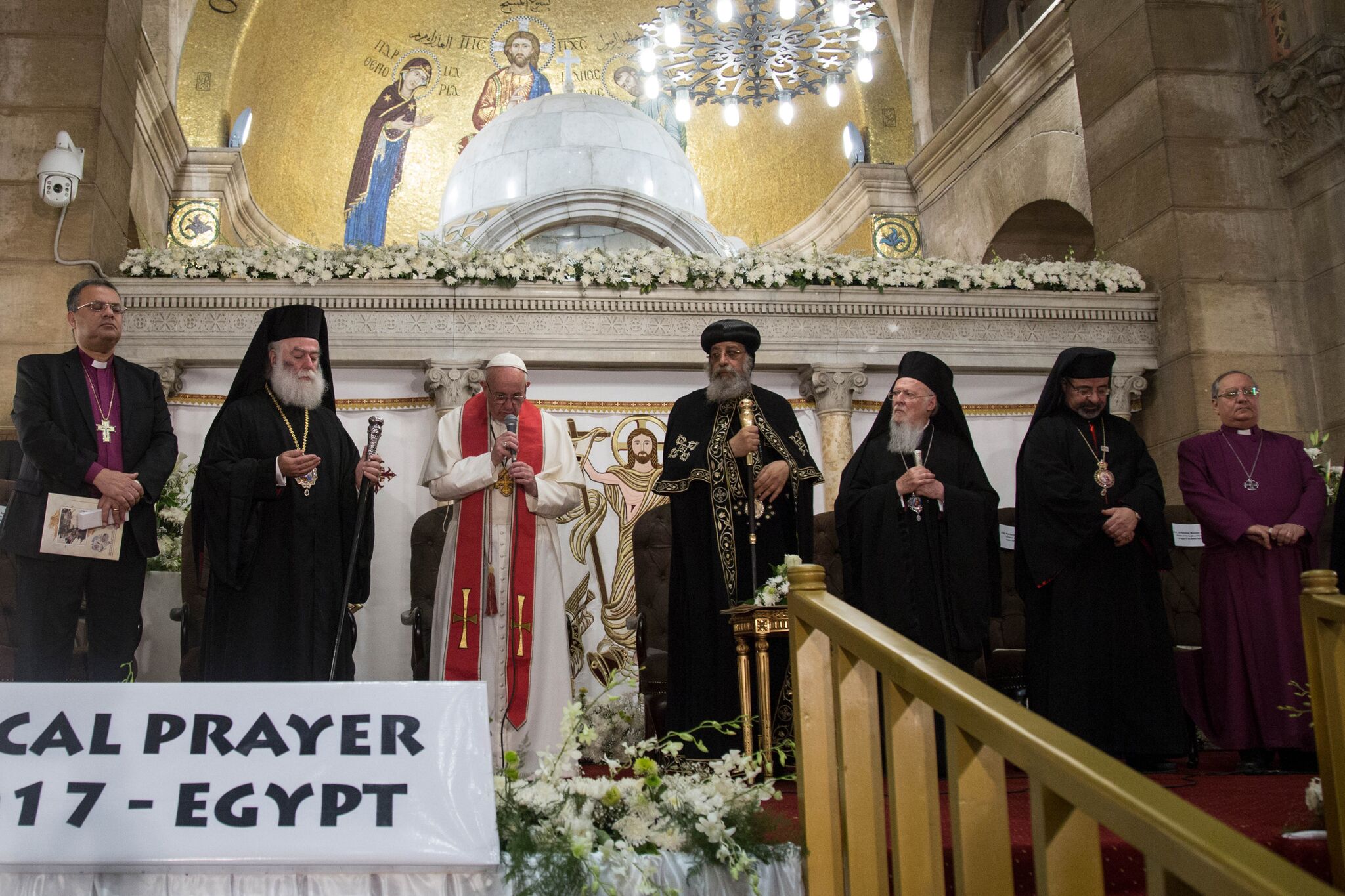
Photo: Roger Anis
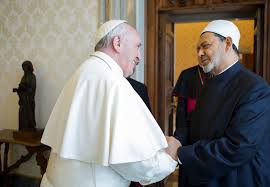 The second invitation was offered by President Al-Sisi when he visited the Vatican in 2014. He’s trying to bring ahead a culture of peace, not without difficulty. But the pope went beyond the politics, in depth. The third invitation came from the Grand Imam of al-Azhar in 2016. On that occasion the pope gave the Encyclical Laudato sii in a gesture of seeking what unites us. In my opinion it was quite courageous of the Grand Imam to offer this invitation, given the precedents. The pope’s speech at al-Azhar University was important, perhaps a beginning. Now I think time will be needed and courage to face the more delicate questions and in order to delve more deeply into the history as well . . . Now it’s up to us Egyptians to get working and moving forward.”
The second invitation was offered by President Al-Sisi when he visited the Vatican in 2014. He’s trying to bring ahead a culture of peace, not without difficulty. But the pope went beyond the politics, in depth. The third invitation came from the Grand Imam of al-Azhar in 2016. On that occasion the pope gave the Encyclical Laudato sii in a gesture of seeking what unites us. In my opinion it was quite courageous of the Grand Imam to offer this invitation, given the precedents. The pope’s speech at al-Azhar University was important, perhaps a beginning. Now I think time will be needed and courage to face the more delicate questions and in order to delve more deeply into the history as well . . . Now it’s up to us Egyptians to get working and moving forward.” 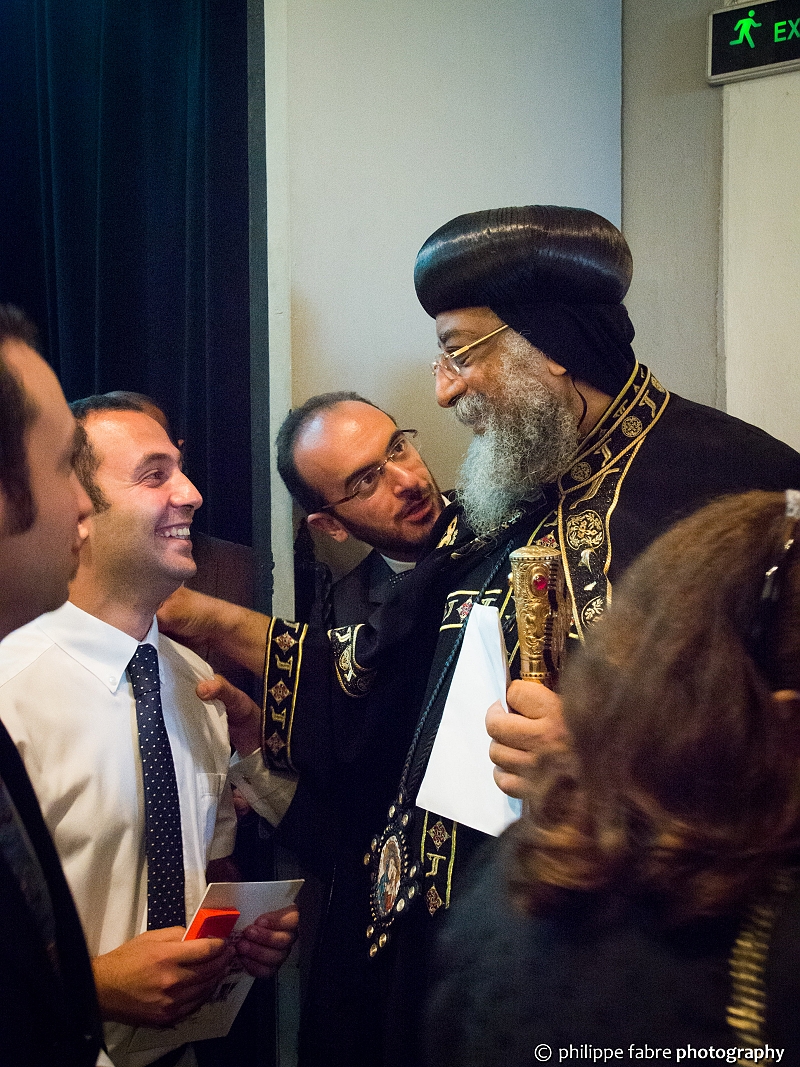 Besides these important events Pope Francis also met with Catholic men and women Religious, priests and seminarians. “He spoke to them about how a pastor should act. The Catholic community in Egypt is a minority (less than 1%), yet it’s an important reference point when it comes to interreligious dialogue, often because of the Religious: with their lifestyle, their openness to dialogue. Then it is our specific with the ‘dialogue of life’ and the help of the spirituality of unity. The week before the pope arrived, the parents of Blessed Chiara Luce Badano were here. Chiara Luce was a young person from the Focolare Movement who died at the age of 19 because of a tumor. The Catholic Church has held her up as an example of holiness for young people. Her parents travelled around the country presenting the life of their daughter who is now a Blessed. Their visit concluded with a meeting of 1500 young people who were preparing the Mass with the Holy Father. The most powerful moment of the night was getting to know the life of Chiara Luce.” In your opinion, what can change because of this brief but intense visit? I think new inroads were opened for us to follow, especially in interreligious and ecumenical dialogue. Now there’s more faith in the pope and in the Church. So I think it will be easier to move forward. We need to remain open, even though, I think, we’ll need time to ‘digest’ and understand deeply what the pope said in his various speeches. During the mass, in the homily on the disciples of Emmaus, the pope himself underscored how they spent in understanding the Risen Lord event. After this event we also feel like those disciples whose ‘hearts were burning’ because of their great joy.”
Besides these important events Pope Francis also met with Catholic men and women Religious, priests and seminarians. “He spoke to them about how a pastor should act. The Catholic community in Egypt is a minority (less than 1%), yet it’s an important reference point when it comes to interreligious dialogue, often because of the Religious: with their lifestyle, their openness to dialogue. Then it is our specific with the ‘dialogue of life’ and the help of the spirituality of unity. The week before the pope arrived, the parents of Blessed Chiara Luce Badano were here. Chiara Luce was a young person from the Focolare Movement who died at the age of 19 because of a tumor. The Catholic Church has held her up as an example of holiness for young people. Her parents travelled around the country presenting the life of their daughter who is now a Blessed. Their visit concluded with a meeting of 1500 young people who were preparing the Mass with the Holy Father. The most powerful moment of the night was getting to know the life of Chiara Luce.” In your opinion, what can change because of this brief but intense visit? I think new inroads were opened for us to follow, especially in interreligious and ecumenical dialogue. Now there’s more faith in the pope and in the Church. So I think it will be easier to move forward. We need to remain open, even though, I think, we’ll need time to ‘digest’ and understand deeply what the pope said in his various speeches. During the mass, in the homily on the disciples of Emmaus, the pope himself underscored how they spent in understanding the Risen Lord event. After this event we also feel like those disciples whose ‘hearts were burning’ because of their great joy.”
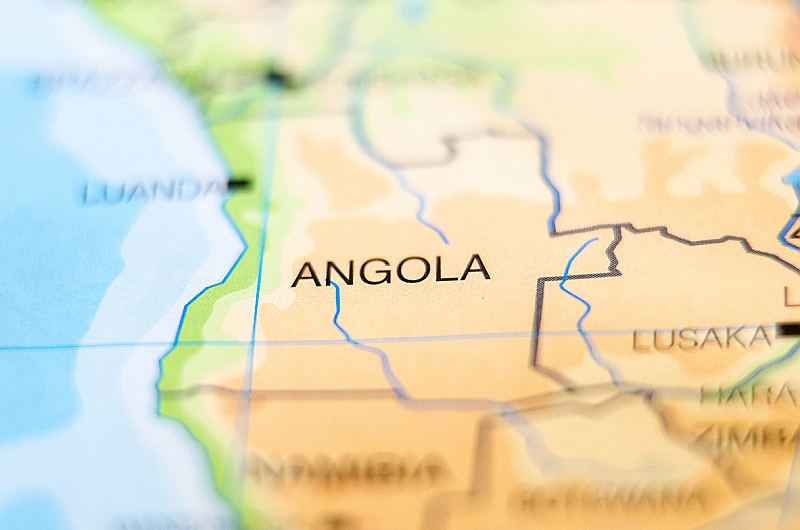
May 1, 2017 | Focolare Worldwide
 “My brother was born on 12 March 1995 in a city of Bié, south of Angola. He was a cheerful child, loved nature, and enjoyed climbing trees, gathering their fruit and bringing them to others. He had been lively and active since he was a child and had started to work. At the age of 15 he had started to reach his objectives. Not wanting to weigh on his parents, he started working as an assistant bricklayer, and then at 16, as a motorcycle and bicycle mechanic. He dreamt of becoming a doctor to help people, like our dad. Yes, this story is about my brother. Two years ago, he went to the sea with three of his friends. On their way home they were surprised by some policemen. In those days there was a big tension in the city, and a lot of violence. To prevent it, the police had set a curfew: all those who were out and about after 6 pm were arrested. It was a way of frightening criminals and assuring the population. Most of the people, however, had not been informed of this decision, and it was the first curfew day. Among these were my brother and his friend, who found themselves simply in the wrong place at the wrong time. My brother, mistaken for a criminal, was arrested. Time passed and he had not returned home. Anguished we went to search for him everywhere: in the house of our relatives, hospitals, prisons, and at the beach where he had gone. But nobody had any clue as to my brother’s whereabouts. In the end, an uncle proposed looking in the last place we would have ever wanted to go: the orbituary. His body was there. He was only 20 and with all the future before him. It was a really difficult moment, an immense suffering for our family. From the signs on his body it was clear that the policemen had been very cruel and he had suffered greatly before dying. This tragedy provoked a deep crisis, especially in my father. He had chosen to work to save human lives, and now before him was the drama of a son he was unable to help…. I knew the spirituality of the Focolare Movement for a long time, and tried to put the Gospel into practice. In giving myself to the others I had found my fulfillment, but with my brother’s death, a sentiment of hatred grew in me towards the policemen who had done this atrocity. The pain dug an unbridgeable void deep inside me. It was a long internal trial: in the depth of my heart, in fact, I wanted to start a process towards forgiveness. It wasn’t easy. Only God could fill this void and make my heart capable of mercy. In this path, the love of the Focolare community in my city was fundamental. I felt loved, welcomed and helped by all. I thus found the strength within me to make this choice. I have rediscovered the gift of peace, by building it firstly inside me, up to the point of looking at every policeman with my eyes and heart full of mercy.”
“My brother was born on 12 March 1995 in a city of Bié, south of Angola. He was a cheerful child, loved nature, and enjoyed climbing trees, gathering their fruit and bringing them to others. He had been lively and active since he was a child and had started to work. At the age of 15 he had started to reach his objectives. Not wanting to weigh on his parents, he started working as an assistant bricklayer, and then at 16, as a motorcycle and bicycle mechanic. He dreamt of becoming a doctor to help people, like our dad. Yes, this story is about my brother. Two years ago, he went to the sea with three of his friends. On their way home they were surprised by some policemen. In those days there was a big tension in the city, and a lot of violence. To prevent it, the police had set a curfew: all those who were out and about after 6 pm were arrested. It was a way of frightening criminals and assuring the population. Most of the people, however, had not been informed of this decision, and it was the first curfew day. Among these were my brother and his friend, who found themselves simply in the wrong place at the wrong time. My brother, mistaken for a criminal, was arrested. Time passed and he had not returned home. Anguished we went to search for him everywhere: in the house of our relatives, hospitals, prisons, and at the beach where he had gone. But nobody had any clue as to my brother’s whereabouts. In the end, an uncle proposed looking in the last place we would have ever wanted to go: the orbituary. His body was there. He was only 20 and with all the future before him. It was a really difficult moment, an immense suffering for our family. From the signs on his body it was clear that the policemen had been very cruel and he had suffered greatly before dying. This tragedy provoked a deep crisis, especially in my father. He had chosen to work to save human lives, and now before him was the drama of a son he was unable to help…. I knew the spirituality of the Focolare Movement for a long time, and tried to put the Gospel into practice. In giving myself to the others I had found my fulfillment, but with my brother’s death, a sentiment of hatred grew in me towards the policemen who had done this atrocity. The pain dug an unbridgeable void deep inside me. It was a long internal trial: in the depth of my heart, in fact, I wanted to start a process towards forgiveness. It wasn’t easy. Only God could fill this void and make my heart capable of mercy. In this path, the love of the Focolare community in my city was fundamental. I felt loved, welcomed and helped by all. I thus found the strength within me to make this choice. I have rediscovered the gift of peace, by building it firstly inside me, up to the point of looking at every policeman with my eyes and heart full of mercy.”
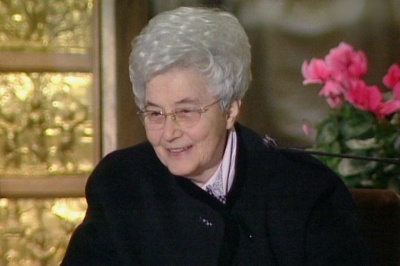
Apr 30, 2017 | Non categorizzato
 “My dear young people … God calls in different ways: he calls many persons and gives them special tasks and missions to accomplish. For example, he calls young men to the sublime vocation of the priesthood, to be other Christs. He calls men and women to the families of Religious Orders, which are like multicolored flowerbeds in the garden of the Church, constantly adorning the Bride of Christ with the most splendid virtues. He calls men and women to the modern ecclesial movements, to give themselves to God individually and in community, or to form model families that are like many little churches. Remember: God’s calling can come at any age. He calls adolescents and children too; he calls people all over the world. How can we recognize our vocation? It is my experience that generally we need to have a particular attitude. Since God’s call is an act of love on his part, if he finds love in people he is freer to call them. What should we do in order to hear God’s voice? We need to love with an authentic love. By doing that, we make God’s task easier and if we already know what our vocation is, then it is by loving that we find the best way to fulfill it. As I said, we need authentic love. Authentic love is so important that if you live it, you start a revolution in the world, which is the Christian revolution. Authentic love has four qualities: it loves everyone, because Jesus died for everyone; Mary is the mother of everyone. Therefore, someone who has an authentic love doesn’t look at whether people are pleasant or unpleasant, whether they are young or old, white or black, German or Italian, a member of one religion or another, if they are friends or enemies. Authentic love is directed toward everyone. Try to live it. Try to live it. Usually, we love our friends, our parents and relatives, and this is wonderful. But do we have love for all in our hearts? Try it, try it. It is a revolution. Because people do not understand and after a while, they ask, “Why are you doing this for me? Why do you love me? Why did you give me that pen? Why did you help me with my homework? Why?” “Why? Because I want to love everyone,” and this opens a dialogue with other Catholics, with people of other Churches or of other religions. A dialogue begins because we start taking an interest in other people. Therefore, especially you young people remember that the first point of authentic love is to love everyone. The second point: be the first to love. When Jesus came on earth we weren’t loving him, we were all sinners. He loved us first. We must be ready to make the first move, not expecting to be loved. Do we love because we are loved? No! we must take the initiative in loving. The Holy Spirit has poured this love into our hearts. It is the same love as in the Holy Trinity and in which we share; but we must put it into practice. Then we need to see Jesus in everyone, because he said that at the final judgment we would be examined on this: you did it to me. This means whatever good we do and, unfortunately, whatever evil we do. So three qualities: love everyone, be the first to love, see Jesus in every neighbor. But this love should not be idealistic or sentimental; it should be a concrete love and to be concrete, as St Paul says, we should make ourselves all things to all people. We need to make ourselves one with those who suffer, make ourselves one with those who are happy, and to share joys, sufferings and needs. We must share. So love everyone, be the first to love, see Jesus, and love concretely. This is what we can do, putting authentic love in our hearts. The calling is his part, it is his task.… Dear young people, God never stops calling especially if we love. It’s up to us to respond and during our life we’ll weave the divine, wonderful design that God has for each one of us for the good of all. Do you know what it means to put God in the first place in your life? Whether he calls you to consecrate yourself to him or to form a beautiful family, putting God in the first place in life means finding happiness already here on earth. This is what I wish for all of you! Aim high, young people, we have only one life, there won’t be another, it’s worthwhile spending it well.”
“My dear young people … God calls in different ways: he calls many persons and gives them special tasks and missions to accomplish. For example, he calls young men to the sublime vocation of the priesthood, to be other Christs. He calls men and women to the families of Religious Orders, which are like multicolored flowerbeds in the garden of the Church, constantly adorning the Bride of Christ with the most splendid virtues. He calls men and women to the modern ecclesial movements, to give themselves to God individually and in community, or to form model families that are like many little churches. Remember: God’s calling can come at any age. He calls adolescents and children too; he calls people all over the world. How can we recognize our vocation? It is my experience that generally we need to have a particular attitude. Since God’s call is an act of love on his part, if he finds love in people he is freer to call them. What should we do in order to hear God’s voice? We need to love with an authentic love. By doing that, we make God’s task easier and if we already know what our vocation is, then it is by loving that we find the best way to fulfill it. As I said, we need authentic love. Authentic love is so important that if you live it, you start a revolution in the world, which is the Christian revolution. Authentic love has four qualities: it loves everyone, because Jesus died for everyone; Mary is the mother of everyone. Therefore, someone who has an authentic love doesn’t look at whether people are pleasant or unpleasant, whether they are young or old, white or black, German or Italian, a member of one religion or another, if they are friends or enemies. Authentic love is directed toward everyone. Try to live it. Try to live it. Usually, we love our friends, our parents and relatives, and this is wonderful. But do we have love for all in our hearts? Try it, try it. It is a revolution. Because people do not understand and after a while, they ask, “Why are you doing this for me? Why do you love me? Why did you give me that pen? Why did you help me with my homework? Why?” “Why? Because I want to love everyone,” and this opens a dialogue with other Catholics, with people of other Churches or of other religions. A dialogue begins because we start taking an interest in other people. Therefore, especially you young people remember that the first point of authentic love is to love everyone. The second point: be the first to love. When Jesus came on earth we weren’t loving him, we were all sinners. He loved us first. We must be ready to make the first move, not expecting to be loved. Do we love because we are loved? No! we must take the initiative in loving. The Holy Spirit has poured this love into our hearts. It is the same love as in the Holy Trinity and in which we share; but we must put it into practice. Then we need to see Jesus in everyone, because he said that at the final judgment we would be examined on this: you did it to me. This means whatever good we do and, unfortunately, whatever evil we do. So three qualities: love everyone, be the first to love, see Jesus in every neighbor. But this love should not be idealistic or sentimental; it should be a concrete love and to be concrete, as St Paul says, we should make ourselves all things to all people. We need to make ourselves one with those who suffer, make ourselves one with those who are happy, and to share joys, sufferings and needs. We must share. So love everyone, be the first to love, see Jesus, and love concretely. This is what we can do, putting authentic love in our hearts. The calling is his part, it is his task.… Dear young people, God never stops calling especially if we love. It’s up to us to respond and during our life we’ll weave the divine, wonderful design that God has for each one of us for the good of all. Do you know what it means to put God in the first place in your life? Whether he calls you to consecrate yourself to him or to form a beautiful family, putting God in the first place in life means finding happiness already here on earth. This is what I wish for all of you! Aim high, young people, we have only one life, there won’t be another, it’s worthwhile spending it well.”
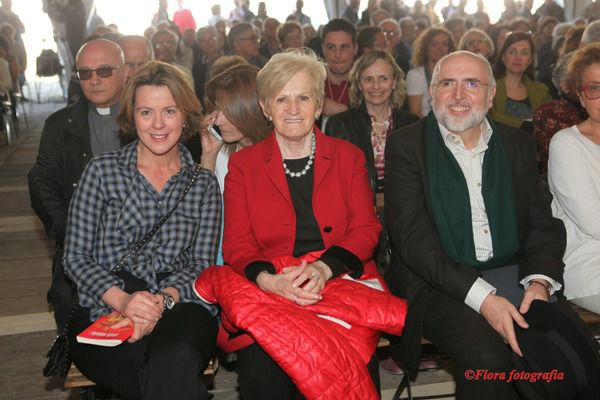
Apr 29, 2017 | Focolare Worldwide
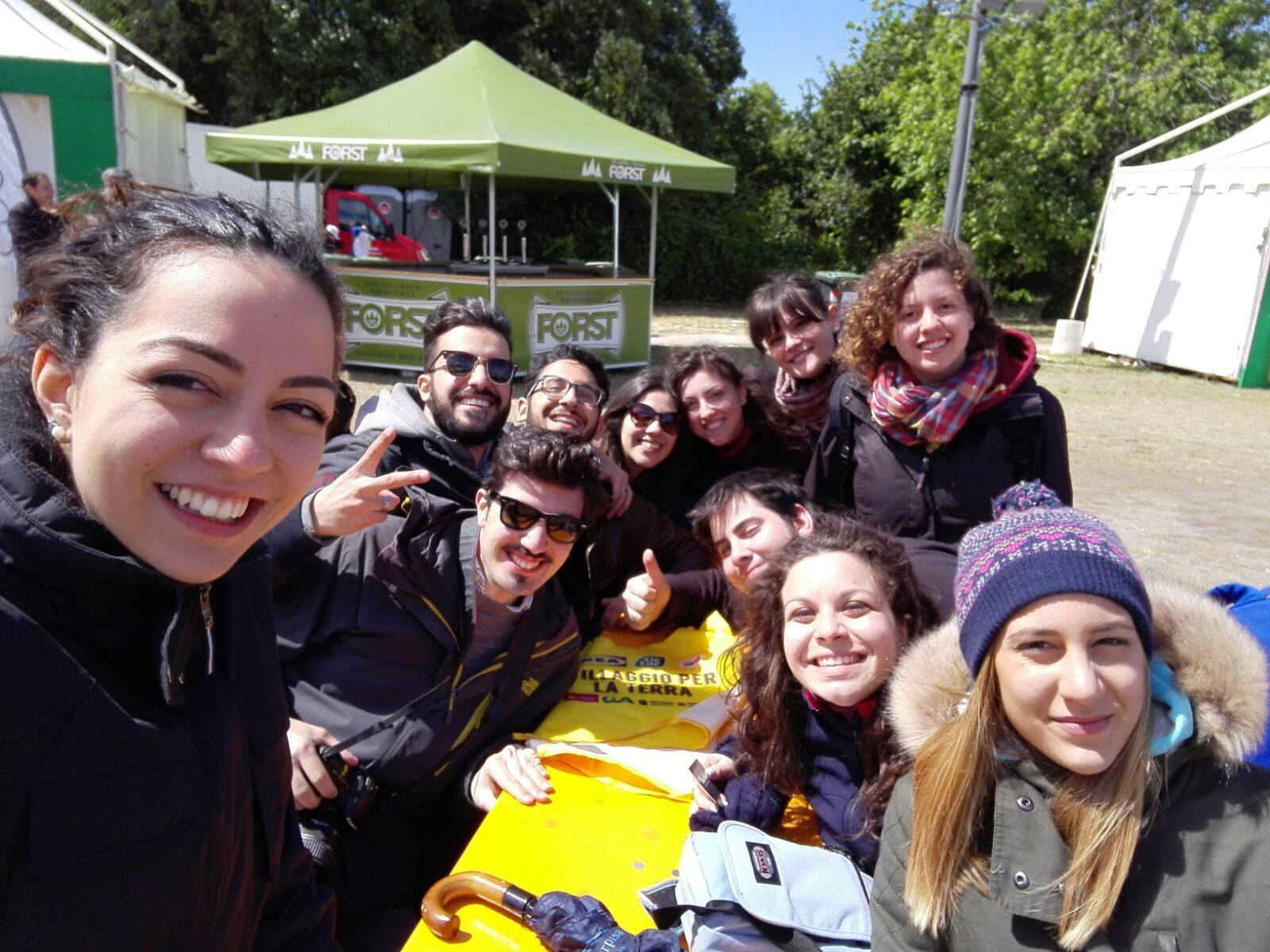 The Pincio Hill is a privileged terrace looking out over Rome, an observation point with a breathtaking view of the city skyline. But from 21 to 25 April a festive population stole the limelight to become an undisputed protagonist: the participants of “The Earth’s Village”, an event organised by Earth Day and the Focolare Movement within the setting of Villa Borghese, the capital’s green lung in the city centre. There were about130,000 visitors, families, children, youth, transiting citizens, but also ministers, key figures in the country’s economic and cultural life, cardinals and heads of various religions. It was a five-day event of institutional meetings, theme forums, courses, shows (also some stars of the musical world), a children’s village – within the context of the celebrations dedicated worldwide to the themes of ecology and respect for the environment – that contaminated also the strolling tourists, who thronged the place also due to the radiant sunlight and festive air. Like last year, the Focolare Movement found in the Earth’s Village the ideal place to hold one of its most important gatherings, the Mariapolis: a temporary but insightful city, whose inhabitants renew their decision to live the Golden Rule which invites to “do to others what you would like others to do to you.” “For us, this rule is the throbbing heart of integral ecology,” explained the organisers of the event, which last year had received the unexpected visit of Pope Francis. The concept was also taken up by Cardinal Parolin, Vatican Secretary of State, during a mass celebrated in the Village: “the spark of interest for the things of God» is like a “spark of interest for our own selves, for the truest, deepest and most essential part of ourselves (…). A new attitude towards creation, the promotion of an integral ecology lived with joy and authenticity, following the example of St. Francis of Assisi.”
The Pincio Hill is a privileged terrace looking out over Rome, an observation point with a breathtaking view of the city skyline. But from 21 to 25 April a festive population stole the limelight to become an undisputed protagonist: the participants of “The Earth’s Village”, an event organised by Earth Day and the Focolare Movement within the setting of Villa Borghese, the capital’s green lung in the city centre. There were about130,000 visitors, families, children, youth, transiting citizens, but also ministers, key figures in the country’s economic and cultural life, cardinals and heads of various religions. It was a five-day event of institutional meetings, theme forums, courses, shows (also some stars of the musical world), a children’s village – within the context of the celebrations dedicated worldwide to the themes of ecology and respect for the environment – that contaminated also the strolling tourists, who thronged the place also due to the radiant sunlight and festive air. Like last year, the Focolare Movement found in the Earth’s Village the ideal place to hold one of its most important gatherings, the Mariapolis: a temporary but insightful city, whose inhabitants renew their decision to live the Golden Rule which invites to “do to others what you would like others to do to you.” “For us, this rule is the throbbing heart of integral ecology,” explained the organisers of the event, which last year had received the unexpected visit of Pope Francis. The concept was also taken up by Cardinal Parolin, Vatican Secretary of State, during a mass celebrated in the Village: “the spark of interest for the things of God» is like a “spark of interest for our own selves, for the truest, deepest and most essential part of ourselves (…). A new attitude towards creation, the promotion of an integral ecology lived with joy and authenticity, following the example of St. Francis of Assisi.” 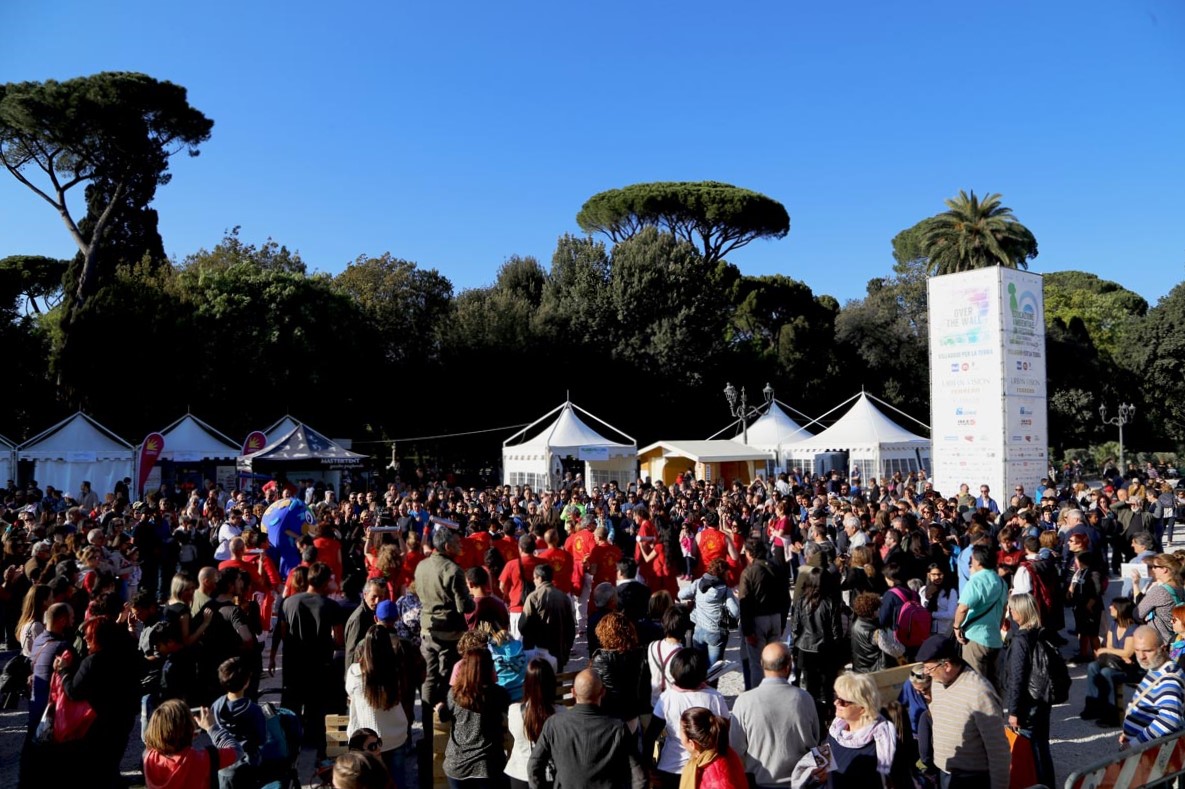 Among the many issues were discussed, a specific theme was Economy of Communion which is based on a market concept which surpasses the logic of savage capitalism and aims to make the economy an instrument for the humanization of relationships. The forums on Economy of the Village, The Community and the Enterprises, also saw the participation of the economist Stefano Zamagni. This educational phase proposed to the participants – citizens and economic and cultural operators – a space for the sharing of ideas, experiences and projects based on peace and economy, a dual term which today seems unachievable, given that behind every conflict, even behind the migration of thousands of refugees, lie enormous financial interests. And yet there are – and we saw them in the Village– economists and businessmen who have chosen to go against the current, to build enterprises that produce profits to be partly allocated to solve situations of poverty. These, in the current panorama, are concrete answers that bring hope. Another central theme was intercultural and interreligious dialogue. There were moving testimonials from Fontem, offered by Maria Bencivenni and Martin Nkafu. In the tiny village, north-west of Cameroon, wedged in the equatorial rain forest, stands the hospital Mary Health of Africa, founded in 1964 by the Focolare. Due to the high infant mortality rate the king of the village had asked for help. In response, the Focolare had sent doctors, nurses, civil engineers and technicians, and thus initiated an extraordinary story of friendship and harmonious co-existence between Christians and the faithful of other traditional religions, Europeans and Africans.
Among the many issues were discussed, a specific theme was Economy of Communion which is based on a market concept which surpasses the logic of savage capitalism and aims to make the economy an instrument for the humanization of relationships. The forums on Economy of the Village, The Community and the Enterprises, also saw the participation of the economist Stefano Zamagni. This educational phase proposed to the participants – citizens and economic and cultural operators – a space for the sharing of ideas, experiences and projects based on peace and economy, a dual term which today seems unachievable, given that behind every conflict, even behind the migration of thousands of refugees, lie enormous financial interests. And yet there are – and we saw them in the Village– economists and businessmen who have chosen to go against the current, to build enterprises that produce profits to be partly allocated to solve situations of poverty. These, in the current panorama, are concrete answers that bring hope. Another central theme was intercultural and interreligious dialogue. There were moving testimonials from Fontem, offered by Maria Bencivenni and Martin Nkafu. In the tiny village, north-west of Cameroon, wedged in the equatorial rain forest, stands the hospital Mary Health of Africa, founded in 1964 by the Focolare. Due to the high infant mortality rate the king of the village had asked for help. In response, the Focolare had sent doctors, nurses, civil engineers and technicians, and thus initiated an extraordinary story of friendship and harmonious co-existence between Christians and the faithful of other traditional religions, Europeans and Africans.  Livia Turco, in the past Health Minster and Beatrice Lorenzin, current Italian Health Minister, together with Vittorio Pelligra, professor of Economy, presented the book entitled Creative Fidelity. A Charism’s Implementation Challenges by Jesús Morán, current Co-President of the Focolare Movement. An exchange of ideas on politics and charisms, two apparently distant fields, to the point that Chiara Lubich herself had defined politics the “love of loves,” the tool par excellence that can respond to the present needs. A creative fidelity: ideals and concreteness, novelties and faithfulness, a challenge of identity in every field. “Creative fidelity means not fearing to face challenges but at the same time signifies firmness in one’s own values and principles. In the globalization world, it is not easy to build equality and social justice – affirmed Turco. It is a great and very difficult challenge.” A strong message of peace was launched on the last day. While the children were busy in the Playing together for peace workshop where they learned the differences between the Christian, Jewish, Muslim and Buddhist religions and the various places of worship, and built a mosaic with the words they had just learned, 7 women of 5 different faiths gave life to a panel called “Mothers of the Earth,” a round table of interreligious dialogue on the protection of the environment envisaged by the various religions. “Women,” declared Franca Coen, president of the Jewish Beth Hillel community, “by nature know what it means to take care of and protect a seed so that it can develop into a healthy and harmonious being. Through dialogue between the various cultures and religious faiths, they can overcome the fear of the diverse and operate in synergy honouring the work of the Only Creator.” Lilamaya Devi, of the Italian Hindu Union added: “According to our tradition, God rests on stones, breathes with the trees, sleeps with the animals and awakes in man. Religions have a very important function, that of reminding all of the deep union with the Earth.“ Mervat Kelli, a Syro-Orthodox Syrian said: “Nature is a shrine that teaches us how to create reciprocal relationships and live in profound harmony.” The Earth’s Village closed shop but opened many hearts. The participants returned to immerse themselves again in the reality of the metropolis, with the firm intention to live in full communion with the surrounding environment and humanity.
Livia Turco, in the past Health Minster and Beatrice Lorenzin, current Italian Health Minister, together with Vittorio Pelligra, professor of Economy, presented the book entitled Creative Fidelity. A Charism’s Implementation Challenges by Jesús Morán, current Co-President of the Focolare Movement. An exchange of ideas on politics and charisms, two apparently distant fields, to the point that Chiara Lubich herself had defined politics the “love of loves,” the tool par excellence that can respond to the present needs. A creative fidelity: ideals and concreteness, novelties and faithfulness, a challenge of identity in every field. “Creative fidelity means not fearing to face challenges but at the same time signifies firmness in one’s own values and principles. In the globalization world, it is not easy to build equality and social justice – affirmed Turco. It is a great and very difficult challenge.” A strong message of peace was launched on the last day. While the children were busy in the Playing together for peace workshop where they learned the differences between the Christian, Jewish, Muslim and Buddhist religions and the various places of worship, and built a mosaic with the words they had just learned, 7 women of 5 different faiths gave life to a panel called “Mothers of the Earth,” a round table of interreligious dialogue on the protection of the environment envisaged by the various religions. “Women,” declared Franca Coen, president of the Jewish Beth Hillel community, “by nature know what it means to take care of and protect a seed so that it can develop into a healthy and harmonious being. Through dialogue between the various cultures and religious faiths, they can overcome the fear of the diverse and operate in synergy honouring the work of the Only Creator.” Lilamaya Devi, of the Italian Hindu Union added: “According to our tradition, God rests on stones, breathes with the trees, sleeps with the animals and awakes in man. Religions have a very important function, that of reminding all of the deep union with the Earth.“ Mervat Kelli, a Syro-Orthodox Syrian said: “Nature is a shrine that teaches us how to create reciprocal relationships and live in profound harmony.” The Earth’s Village closed shop but opened many hearts. The participants returned to immerse themselves again in the reality of the metropolis, with the firm intention to live in full communion with the surrounding environment and humanity.
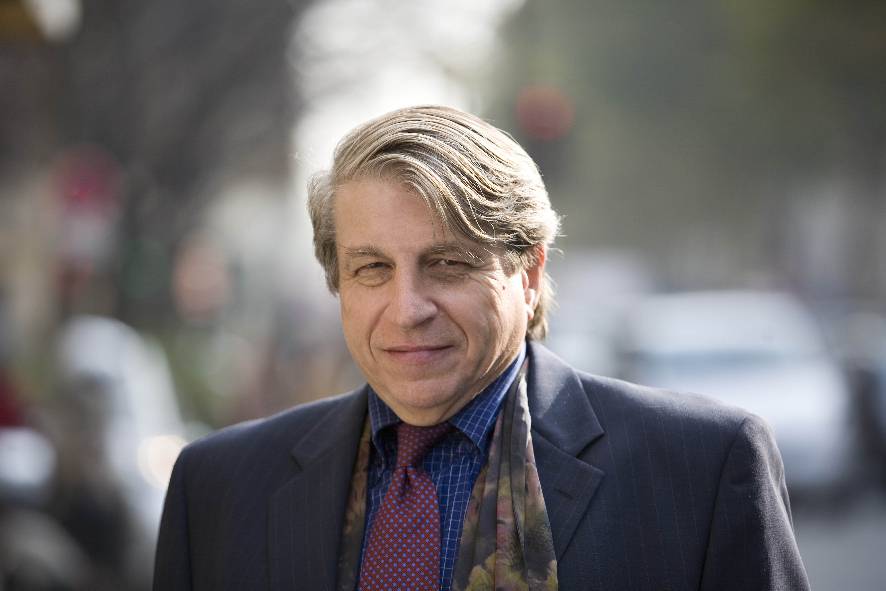
Apr 28, 2017 | Non categorizzato
 On April 24, 2017, Dr Benjamin Barber passed away at the age of 77, following a brief illness in New York. He leaves behind his wife Leah and daughter Cornelia. A political philosopher, author of several books, including the best-seller Jihad Vs. McWorld, Barber dedicated his entire life to the ideas of citizenship and democracy. He was convinced that the great challenges of interdependance could be resolved in a constructive way if citizens made an effort to live civic virtues and become actively involved in politics. He was sceptical of the ability of the nation-states to give sufficient answers to the contemporary global challenges (from climate change to terrorism; from immigration to poverty). In his last years, Barber emphasized the indispensible involvement of cities. In his book, If Mayors Rule the World, he demonstrated how cities respond in a more efficacious way than states to the problems of our interdependant world. Therefore, in his last years with the tenacity and passion that had always distinguished him, Barber gave life to the Global Parliament of Mayors, which 49 mayors joined, including the Italians Leouca Orlando amd Virginio Merola. I met Barber in the aftermath of September 11th at the New York home of Italian journalist, Antonio Monda. We were at a dinner together along with Leoluca Orlando, and Barber told us about a new project of his: to launch a World Interdependence Day that would be celebrated every September 12th, the day after the anniversary of the Twin Towers and Pentagon attacks. In fact, for Barber, the response to those attacks couldn’t be military, but had to rise from a common commitment to find sustainable solutions to all the great global challenges that could never be faced in an isolated way. Remembering that the United States had been born with the Declaration of Independance, Barber emphasized the need for a new declaration of interdependance. I worked closely with Barber to set up the first Interdependance Day that was symbolically celebrated in Philadelphia. With him, we thought up and put together the second edition of the day in Rome, Italy, in 2004, with the support of the Focolare Movement. It was on that occasion that I had the privilege of introducing Dr Barber to Chiara Lubich and be a witness to the various encounters and discussions that they had between 2003 and 2004. I recall during the conclusion of the first meeting between them, in June 2003 at Rocca di Papa, Italy, where I listened to him closely, Chiara observed that the idea of interdependance was important, but not enough. Chiara told Barber during that first meeting: “Not only do we need interdependance, but then communion. The goods have to move. But goods can’t move on their own, and this is why we need to move hearts. Therefore, I talk about the universal brotherhood that we achieve among individuals and individual groups, but if we begin to remake this brotherhood among the nations, we’ll resolve the problem of terrorism at its roots.” Barber responded: “Yes. The term “interdependance” is the lite version of the word “communion”. It’s the first step towards communion.” He went on to say: “Democracy is also a matter of the spirit; it begins with the habit of the heart and then is expressed in secular terms. So, oftentimes the separation between spirit and secular is a stretch . . .” That dialogue between Barber and Lubich is something that is still vibrating today, beause of its absolute timeliness. What remains of Barber as a most precious legacy is his intellectual and civic commitment to giving life to a global citizenry that leads us nearer to unity.” Aldo Civico Source: Città Nuova
On April 24, 2017, Dr Benjamin Barber passed away at the age of 77, following a brief illness in New York. He leaves behind his wife Leah and daughter Cornelia. A political philosopher, author of several books, including the best-seller Jihad Vs. McWorld, Barber dedicated his entire life to the ideas of citizenship and democracy. He was convinced that the great challenges of interdependance could be resolved in a constructive way if citizens made an effort to live civic virtues and become actively involved in politics. He was sceptical of the ability of the nation-states to give sufficient answers to the contemporary global challenges (from climate change to terrorism; from immigration to poverty). In his last years, Barber emphasized the indispensible involvement of cities. In his book, If Mayors Rule the World, he demonstrated how cities respond in a more efficacious way than states to the problems of our interdependant world. Therefore, in his last years with the tenacity and passion that had always distinguished him, Barber gave life to the Global Parliament of Mayors, which 49 mayors joined, including the Italians Leouca Orlando amd Virginio Merola. I met Barber in the aftermath of September 11th at the New York home of Italian journalist, Antonio Monda. We were at a dinner together along with Leoluca Orlando, and Barber told us about a new project of his: to launch a World Interdependence Day that would be celebrated every September 12th, the day after the anniversary of the Twin Towers and Pentagon attacks. In fact, for Barber, the response to those attacks couldn’t be military, but had to rise from a common commitment to find sustainable solutions to all the great global challenges that could never be faced in an isolated way. Remembering that the United States had been born with the Declaration of Independance, Barber emphasized the need for a new declaration of interdependance. I worked closely with Barber to set up the first Interdependance Day that was symbolically celebrated in Philadelphia. With him, we thought up and put together the second edition of the day in Rome, Italy, in 2004, with the support of the Focolare Movement. It was on that occasion that I had the privilege of introducing Dr Barber to Chiara Lubich and be a witness to the various encounters and discussions that they had between 2003 and 2004. I recall during the conclusion of the first meeting between them, in June 2003 at Rocca di Papa, Italy, where I listened to him closely, Chiara observed that the idea of interdependance was important, but not enough. Chiara told Barber during that first meeting: “Not only do we need interdependance, but then communion. The goods have to move. But goods can’t move on their own, and this is why we need to move hearts. Therefore, I talk about the universal brotherhood that we achieve among individuals and individual groups, but if we begin to remake this brotherhood among the nations, we’ll resolve the problem of terrorism at its roots.” Barber responded: “Yes. The term “interdependance” is the lite version of the word “communion”. It’s the first step towards communion.” He went on to say: “Democracy is also a matter of the spirit; it begins with the habit of the heart and then is expressed in secular terms. So, oftentimes the separation between spirit and secular is a stretch . . .” That dialogue between Barber and Lubich is something that is still vibrating today, beause of its absolute timeliness. What remains of Barber as a most precious legacy is his intellectual and civic commitment to giving life to a global citizenry that leads us nearer to unity.” Aldo Civico Source: Città Nuova
Apr 27, 2017 | Non categorizzato, Word of
https://www.focolare.org/gb/files/2017/04/201705WoL.mp3
Matthew ends his Gospel with the final events of Jesus’ life on earth. Jesus has risen from the dead, having fulfilled his mission. He had proclaimed God’s healing love for all, reopening the way that leads to fraternity. Matthew sees Jesus as Emmanuel, “God with us,” the one promised by the prophets and awaited by the people of Israel. Before returning to the Father, Jesus gathers together his disciples, the group who had most closely shared in his mission. He entrusts them with continuing his work — a tough assignment! But Jesus reassures them. He will not leave them on their own. Indeed, he promises to be with them every day, to support, accompany and encourage them “to the end of the age.” With his help, they will bear witness to meeting him, to his word and his acts of welcome and mercy toward all. In this way, many others will meet him and together form the new people of God, founded upon the commandment of love. We could say that God’s joy is to be with me, with you, with us every day to the end of our individual lives and to the end of human history. But is that true? Can we really encounter him? In a Word of Life commentary from 1982, Focolare founder Chiara Lubich wrote, “He is around the corner; he is next to me and to you. He hides himself in the poor, the despised, little ones, the sick, the person seeking advice, or deprived of freedom. He is in the ugly and the marginalized … As he said, ‘I was hungry and you gave me food’ (Mt 25:35) … Let’s learn how to find him where he is.” He is in his Word, which, if put into practice, renews our lives. All over the world he is in the Eucharist. He also works through his ministers, the servants of his people. He is present when we are in agreement among us (see Mt 18:20). Our prayer to the Father then becomes more effective, and we find light for our daily decisions. “I am with you always, to the end of the age.” How much hope this promise gives us! It encourages us to find him as we go along our way. Let’s open our hearts, and our arms too, to be welcoming and to share. Let’s do this personally and as communities, in our families and our churches, in our workplaces and on festive occasions, in our civil and religious associations. We will meet Jesus, and he will amaze us with joy and with light, the signs of his presence. If we start each morning thinking, “Today I want to discover where God wants to meet me!” we too will have wonderful experiences like this one shared in Glimpses of Gospel Life: “My husband’s mother deeply cared about her son, even to the point of being jealous. A year ago she was diagnosed with cancer, and her only daughter was not able to give her the level of care and help she needed. “During that time, I went to a summer gathering of the Focolare called a Mariapolis, where I encountered God’s love in a way that changed my life. “The first fruit of this conversion was the decision to ask my mother-in-law to come and live with us, setting aside all my fears about it. The light that had been lit in my heart made me see her with new eyes. Now I knew that it was Jesus in her that I cared for and helped. “To my surprise, she responded to all I did with just as much love. Months of sacrifice went by, but when my mother-in-law passed gently on to the next life, she left us all with a deep sense of peace. “It was around that time that I realized I was pregnant, after nine years of waiting! This child was a tangible sign of God’s love for us.”
Letizia Magri
________________________________________________ Read more: • Lubich, Chiara. “Jesus in our neighbor,” The Art of Loving. New City Press: Hyde Park, New York, 2010, pp. 103-110. • Lubich, Chiara. “The Word that gives life,” Essential Writings. New City Press: Hyde Park, New York, 2007, pp. 120-128.
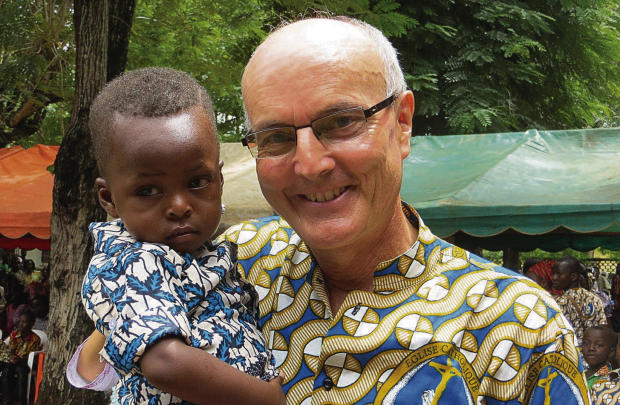
Apr 27, 2017 | Focolare Worldwide
 “In 2010 I had been sent to the parish of St Marie, on the outskirts of Man, which is the capital of Ivory Coast. At that time I wasn’t familiar with the culture and traditions of Africa. I was immediately struck by the strength and vitality of the people, despite the great poverty and consequences of the war. Over time I learned to recognize the ancestral fear towards white people. For me, as a priest from Switzerland, it wasn’t so much a matter of providing economic support, but of putting myself in a position of deep listening. What I had to offer was me, my availability, my lack of pretensions. I lived in the Focolare town of Mariapolis Victoria, near Man. From there I travelled every morning on bicycle towards my quarter, on my way to meet people in the shops, offices and along the road. I waved to everyone on my way and stopped now and then to put a stop to some large or small argument. I paid special attention to the children. I talked to them and played with them. If any of them were sick, I’d take them to the infirmary at the Mariapolis. I did the same for their parents and relatives. This is how nearly all the children in the parish came to recognize me and introduce me to the adults. During the feasts I’d go through the quarters with them, to extend my best wishes to the families, Christian and Muslim alike. This also led to friendships with Imams and Evangelical pastors. One day, a boy from the parish approached me. He wanted to do something for the children of the village, although he had previously grown far from the Church because of a misunderstanding. I encouraged them to do small fund-raisers to support their journeys, a gesture of auto-financing that was greatly appreciated by the local bishop. We visited 11 villages in which the young people were trained in visiting the sick and elderly. During the Year of Mercy, with the help of the residents of Mariapolis Victoria, we supported the bishop’s projects in the diocese, sponsoring a meeting of traditional leaders, pastors from the Evangelical Churches and Imams. The campaign for brotherhood among the populations that spread through the region concluded at the Mariapolis. I substituted for the chaplain at the public jail for a while. During the celebrations of the mass, I tried to underscore the importance of living the Gospel. Sometimes I invited others to join me, who shared their testimonies. These masses were celebrated under a roof, in a courtyard, in the midst of a lot of confusion. So, I brought along a loud-speaker, inviting them to use it when they had other events. I later learned that they shared it with the Muslims and that the Imam was touched by their generosity, which he called “typically Christian”. Before my departure, they wanted to hold a send-off feast for me with the director of the jail. They told me: “You always practiced what you preached.”
“In 2010 I had been sent to the parish of St Marie, on the outskirts of Man, which is the capital of Ivory Coast. At that time I wasn’t familiar with the culture and traditions of Africa. I was immediately struck by the strength and vitality of the people, despite the great poverty and consequences of the war. Over time I learned to recognize the ancestral fear towards white people. For me, as a priest from Switzerland, it wasn’t so much a matter of providing economic support, but of putting myself in a position of deep listening. What I had to offer was me, my availability, my lack of pretensions. I lived in the Focolare town of Mariapolis Victoria, near Man. From there I travelled every morning on bicycle towards my quarter, on my way to meet people in the shops, offices and along the road. I waved to everyone on my way and stopped now and then to put a stop to some large or small argument. I paid special attention to the children. I talked to them and played with them. If any of them were sick, I’d take them to the infirmary at the Mariapolis. I did the same for their parents and relatives. This is how nearly all the children in the parish came to recognize me and introduce me to the adults. During the feasts I’d go through the quarters with them, to extend my best wishes to the families, Christian and Muslim alike. This also led to friendships with Imams and Evangelical pastors. One day, a boy from the parish approached me. He wanted to do something for the children of the village, although he had previously grown far from the Church because of a misunderstanding. I encouraged them to do small fund-raisers to support their journeys, a gesture of auto-financing that was greatly appreciated by the local bishop. We visited 11 villages in which the young people were trained in visiting the sick and elderly. During the Year of Mercy, with the help of the residents of Mariapolis Victoria, we supported the bishop’s projects in the diocese, sponsoring a meeting of traditional leaders, pastors from the Evangelical Churches and Imams. The campaign for brotherhood among the populations that spread through the region concluded at the Mariapolis. I substituted for the chaplain at the public jail for a while. During the celebrations of the mass, I tried to underscore the importance of living the Gospel. Sometimes I invited others to join me, who shared their testimonies. These masses were celebrated under a roof, in a courtyard, in the midst of a lot of confusion. So, I brought along a loud-speaker, inviting them to use it when they had other events. I later learned that they shared it with the Muslims and that the Imam was touched by their generosity, which he called “typically Christian”. Before my departure, they wanted to hold a send-off feast for me with the director of the jail. They told me: “You always practiced what you preached.”
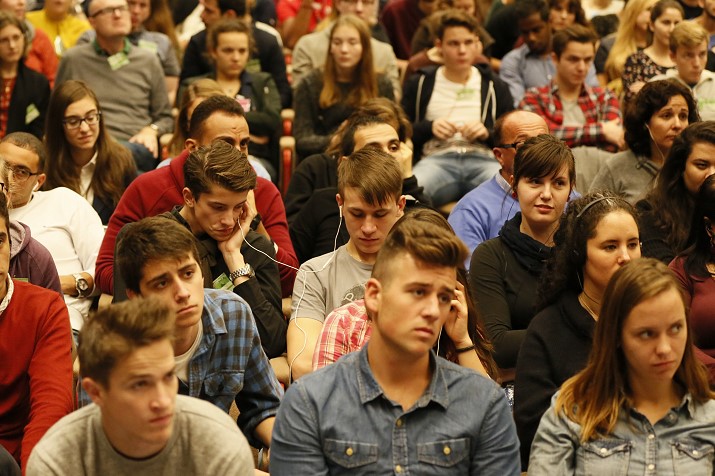
Apr 26, 2017 | Non categorizzato
 Only three days remain until the opening of the United World Week with the long awaited International Meeting of Youth for a United World in Loppiano, Italy. Five hundred young people are the starting blocks. “United World Project” is their slogan that will carry them through the race they are spreading by every possible means of communication. They are all directly involved in the project, a network of numberless concrete and courageous gestures that build bridges and open paths of dialogue and solidarity. The main working document of the Meeting, entitled “Universal Brotherhood: An Opportunity for the World” states: “The financial, economic and, above all, cultural crisis the has spread in every country poses epochal questions”. How can a future of justice, freedom and peace be given to all the peoples of the earth? We would like to begin from unity, the unity of the human family and to aim towards a horizon of the universal brotherhood among all peoples. This is our project.” The border that extends from the Gulf of Mexico to the Pacific Ocean, with its 3,169 kilometres of metal barriers and barbed wire and control towers, representation of the broken dreams of many immigrants in search of a better future. In the same vicinity, in Mexicali and in Calexico, a group of young people have believed in a world without walls and have been keeping busy. “We began singing in one of our city parks which is located right next to the border wall. It was a way of offering a bit of relief to the people who were passing through that area. The second step was to go inside the city’s maximum security prison where 4 thousand people are living, to offer them some music and song. After going through a lot of security controls, we were given permission to spend a few hours with 130 inmates inside a big hall. During lunch they told us that our visit was the only one they had received in two years.” The 2016 Worldwide Run4Unity Relay was held right next to the wall. “We wanted to plant our flag along the border wall as a sign of the unity that we’re committed to building with the people living on the other side.”
Only three days remain until the opening of the United World Week with the long awaited International Meeting of Youth for a United World in Loppiano, Italy. Five hundred young people are the starting blocks. “United World Project” is their slogan that will carry them through the race they are spreading by every possible means of communication. They are all directly involved in the project, a network of numberless concrete and courageous gestures that build bridges and open paths of dialogue and solidarity. The main working document of the Meeting, entitled “Universal Brotherhood: An Opportunity for the World” states: “The financial, economic and, above all, cultural crisis the has spread in every country poses epochal questions”. How can a future of justice, freedom and peace be given to all the peoples of the earth? We would like to begin from unity, the unity of the human family and to aim towards a horizon of the universal brotherhood among all peoples. This is our project.” The border that extends from the Gulf of Mexico to the Pacific Ocean, with its 3,169 kilometres of metal barriers and barbed wire and control towers, representation of the broken dreams of many immigrants in search of a better future. In the same vicinity, in Mexicali and in Calexico, a group of young people have believed in a world without walls and have been keeping busy. “We began singing in one of our city parks which is located right next to the border wall. It was a way of offering a bit of relief to the people who were passing through that area. The second step was to go inside the city’s maximum security prison where 4 thousand people are living, to offer them some music and song. After going through a lot of security controls, we were given permission to spend a few hours with 130 inmates inside a big hall. During lunch they told us that our visit was the only one they had received in two years.” The 2016 Worldwide Run4Unity Relay was held right next to the wall. “We wanted to plant our flag along the border wall as a sign of the unity that we’re committed to building with the people living on the other side.”
![Celebrating a Europe of Hope in Malta]()
Apr 25, 2017 | Focolare Worldwide
 The Focolare has shared a long-standing friendship with Fazenda da Esperança (Farm of Hope) which goes back to the very first farm. It was 1983 when Nelson Giovanelli, a young Brazilian from the city of Guaratinguetà. Inspired by the words of Saint Paul, “I became weak with the weak,” he approached a group of young drug addicts. One of the young people felt drawn in and asked for help in giving up drugs. Many others followed him. Nelson lived Chiara Lubich’s spirituality of unity. He was joined by German Franciscan Friar Hans Stapel who supported his efforts right from the start. The work grew and developed with the support of the “two charisms”, said Pope Benedict XVI during his 2007 visit to the community of Pedrinhas, Brazil – the charism of Chiara Lubich and the charism of poverty of Saint Francis of Assisi. On Sunday, April 23, 2017, a group of 60 young people and adults visited the International Centre of the Focolare Movement in Rocca di Papa, Italy. Most of them were from Brazil, but there were also representatives from other Latin American countries like Uruguay, Argentina, Paraguay and Mexico; Germany and Switzerland; Angola and Mozambique; and Philippines. They were accompanied by 14 founders: Friar Hans Stapel, Nelson Giovanelli Rosendo dos Santos, Lucilene Rosendo, Iraci Leit, and their General Council for Europe.
The Focolare has shared a long-standing friendship with Fazenda da Esperança (Farm of Hope) which goes back to the very first farm. It was 1983 when Nelson Giovanelli, a young Brazilian from the city of Guaratinguetà. Inspired by the words of Saint Paul, “I became weak with the weak,” he approached a group of young drug addicts. One of the young people felt drawn in and asked for help in giving up drugs. Many others followed him. Nelson lived Chiara Lubich’s spirituality of unity. He was joined by German Franciscan Friar Hans Stapel who supported his efforts right from the start. The work grew and developed with the support of the “two charisms”, said Pope Benedict XVI during his 2007 visit to the community of Pedrinhas, Brazil – the charism of Chiara Lubich and the charism of poverty of Saint Francis of Assisi. On Sunday, April 23, 2017, a group of 60 young people and adults visited the International Centre of the Focolare Movement in Rocca di Papa, Italy. Most of them were from Brazil, but there were also representatives from other Latin American countries like Uruguay, Argentina, Paraguay and Mexico; Germany and Switzerland; Angola and Mozambique; and Philippines. They were accompanied by 14 founders: Friar Hans Stapel, Nelson Giovanelli Rosendo dos Santos, Lucilene Rosendo, Iraci Leit, and their General Council for Europe. 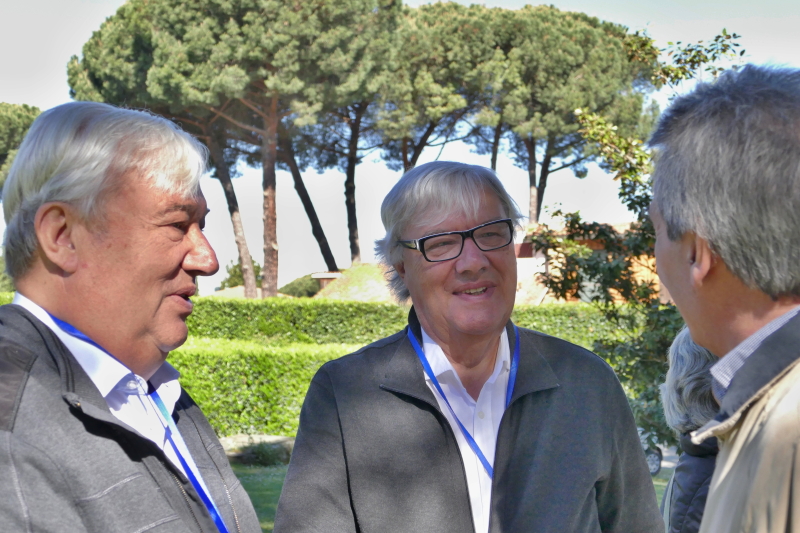 “The purpose of this trip,” Friar Hans explains, “is to make the experience of the Fazenda known in Europe. To offer this alternative assistance to young people who suffer from the slavery of addiction. We’ll also travel to Switzerland, Germany, France, Poland and Portugal – all places where we have Fazendas, and these 60 people will share their testimonies. Among us they found a new life and decided to become missionaries and evangelizers for three months in Europe. They made a great effort to pay for the flight, so that their testimony could be freely-given.” What was the reason for visiting the International Centre of the Focolare? “It was because of everyone’s huge desire to get to know the origins of othe charism that gave the roots to the Fazendas,” says Nelson Giovanelli. He recalled a letter he wrote to Chiara Lubich in 1990, in which he shared with her his calling to love “Jesus Forsaken in the people who have fallen victim to drugs.” Chiara encouraged him to follow the promptings of the Holy Spirit. Currently there are 124 Life Communities around the world. They take in 3,000 young people who are trying to free themselves from drug addiction, through a personal rediscovery of their human dignity and of life values. There are 14 Fazendas in Europe and, during the coming months, another 4 will be opened in France, Poland and Italy.
“The purpose of this trip,” Friar Hans explains, “is to make the experience of the Fazenda known in Europe. To offer this alternative assistance to young people who suffer from the slavery of addiction. We’ll also travel to Switzerland, Germany, France, Poland and Portugal – all places where we have Fazendas, and these 60 people will share their testimonies. Among us they found a new life and decided to become missionaries and evangelizers for three months in Europe. They made a great effort to pay for the flight, so that their testimony could be freely-given.” What was the reason for visiting the International Centre of the Focolare? “It was because of everyone’s huge desire to get to know the origins of othe charism that gave the roots to the Fazendas,” says Nelson Giovanelli. He recalled a letter he wrote to Chiara Lubich in 1990, in which he shared with her his calling to love “Jesus Forsaken in the people who have fallen victim to drugs.” Chiara encouraged him to follow the promptings of the Holy Spirit. Currently there are 124 Life Communities around the world. They take in 3,000 young people who are trying to free themselves from drug addiction, through a personal rediscovery of their human dignity and of life values. There are 14 Fazendas in Europe and, during the coming months, another 4 will be opened in France, Poland and Italy. 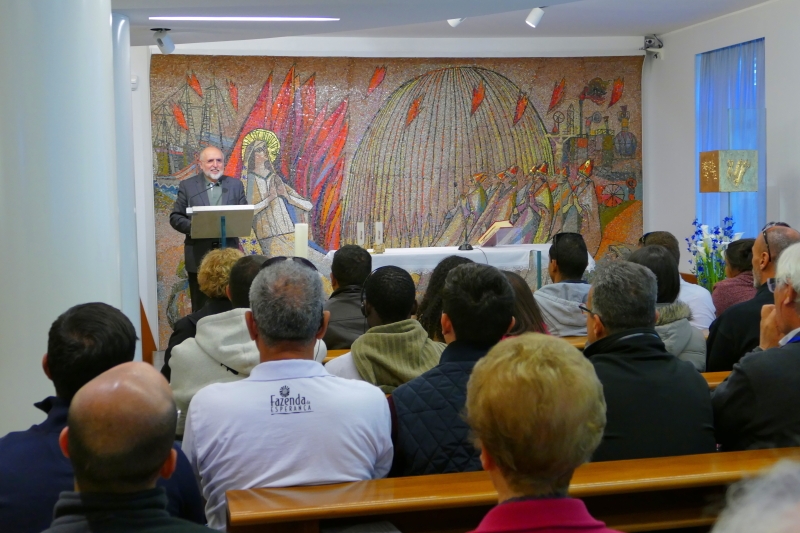 In the Fazendas da Esperanca you have people who voluntarily dedicate themselves with commitment and complete generosity to the service of young people with whom they create the community of the “Family of Hope.” “My father was an alcoholic . . . he didn’t believe in love . . .” says Priscila, a young woman from Argentina. “When I found and got involved as a volunteer at the Fazenda, I regained my relationship with him after 15 years of estrangement. I forgave him and, little by little, he gave up alcohol. For me, forgiveness is everything. It’s the essence of my life: I find God in the love I give away.” The Focolare’s co-president, Jesús Morán, brought greetings from Maria Voce and thanked them for their witness to the Gospel. He augured that they would “always be close to the suffering, to Jesus Forsaken, so that will be one, beginning from the least.” Their stay in Italy will include a visit to the city of Saint Francis and to the international Mariapolis of Loppiano where they will take part in the Pulse Meeting and the annual May 1st Youth Festival.
In the Fazendas da Esperanca you have people who voluntarily dedicate themselves with commitment and complete generosity to the service of young people with whom they create the community of the “Family of Hope.” “My father was an alcoholic . . . he didn’t believe in love . . .” says Priscila, a young woman from Argentina. “When I found and got involved as a volunteer at the Fazenda, I regained my relationship with him after 15 years of estrangement. I forgave him and, little by little, he gave up alcohol. For me, forgiveness is everything. It’s the essence of my life: I find God in the love I give away.” The Focolare’s co-president, Jesús Morán, brought greetings from Maria Voce and thanked them for their witness to the Gospel. He augured that they would “always be close to the suffering, to Jesus Forsaken, so that will be one, beginning from the least.” Their stay in Italy will include a visit to the city of Saint Francis and to the international Mariapolis of Loppiano where they will take part in the Pulse Meeting and the annual May 1st Youth Festival.
Apr 25, 2017 | Non categorizzato
Apr 24, 2017 | Non categorizzato
Program: 2 May – Communion & Law Seminar: “Law as a Tool for Integration in a Multicultural Society” 5 May – Meeting with His Grace Msgr. Charles J. Scicluna, Archbishop of Malta – “Dialogue or Dialogues? A style of life” : a talk to to commemorate the 40th anniversary of the foundation of the Diocesan Ecumenical Commission. 7 May – Participation in the Forum: “The State of Europe”
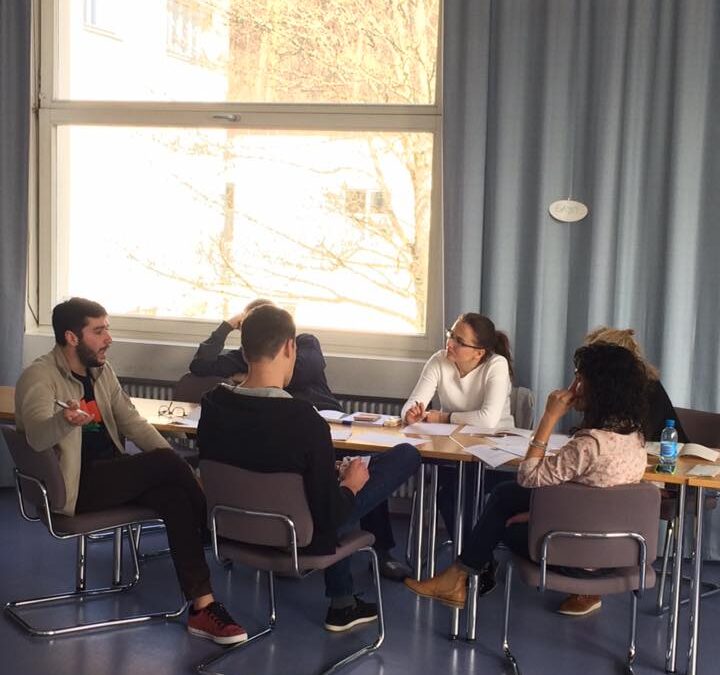
Apr 24, 2017 | Non categorizzato
 “The refugees are not numbers that fill the news but are people to be welcomed in their human dimensions as women and men who have been denied sentiments and projects.” This was the conviction reached by the 18 youths of five European and Middle East countries that gathered in Bad Urach (Germany) from 12 to 17 March for the second phase of the Host Spot project, promoted by New Humanity and Starckmacher together with other associations, and co-financed by the Erasmus+ (EU) programme. Host Spot targets two objectives: Host focuses on hosting programmes, and Spot on the achievement of brief video-documents to influence public opinion.
“The refugees are not numbers that fill the news but are people to be welcomed in their human dimensions as women and men who have been denied sentiments and projects.” This was the conviction reached by the 18 youths of five European and Middle East countries that gathered in Bad Urach (Germany) from 12 to 17 March for the second phase of the Host Spot project, promoted by New Humanity and Starckmacher together with other associations, and co-financed by the Erasmus+ (EU) programme. Host Spot targets two objectives: Host focuses on hosting programmes, and Spot on the achievement of brief video-documents to influence public opinion.  In the first phase of the project held in Jordan in August 2016, the youths had gathered from the live recounts of the Syrian and Iraqi refugees – guests of the Jordan Caritas – the dramatic stories of their forced migration, documented with video shoots. It was an experience that made them realize the true reasons that had pushed them to leave their own countries, the risks they had incurred during the exodus, and the precarious arrival in the new land. The idea of spreading this painful situation had already dawned in the days of Amman. The youths began to be convinced that bringing this information to light could give the undergoing discussion, centred mostly on political strategies and economic-social costs, a truthful vision of the migration phenomenon, and that they could give their concrete contribution through a public awareness campaign. The Bad Urach meeting focused on developing in the youth, the technical competences in the field of communication and production of social documentaries. Some experts were present and worked in direct contact with the refugees. The refugees furnished them with a lot of information on the situation in Germany, and the European hosting system. This was an important contribution to the diffusion of correct knowledge of the situation, often reported by the media in a partial and manipulated way.
In the first phase of the project held in Jordan in August 2016, the youths had gathered from the live recounts of the Syrian and Iraqi refugees – guests of the Jordan Caritas – the dramatic stories of their forced migration, documented with video shoots. It was an experience that made them realize the true reasons that had pushed them to leave their own countries, the risks they had incurred during the exodus, and the precarious arrival in the new land. The idea of spreading this painful situation had already dawned in the days of Amman. The youths began to be convinced that bringing this information to light could give the undergoing discussion, centred mostly on political strategies and economic-social costs, a truthful vision of the migration phenomenon, and that they could give their concrete contribution through a public awareness campaign. The Bad Urach meeting focused on developing in the youth, the technical competences in the field of communication and production of social documentaries. Some experts were present and worked in direct contact with the refugees. The refugees furnished them with a lot of information on the situation in Germany, and the European hosting system. This was an important contribution to the diffusion of correct knowledge of the situation, often reported by the media in a partial and manipulated way.  The young participants had brought with them their own cultural heritage and the vision of migration lived and faced in their countries. They got involved in the game through an exercise of reflection and listening, to receive and comprehend the philosophy of the others, convinced that the contribution they could have given in those days, though small, could have brought about some changes. The success of this phase of the program consisted in the achievement of an international learning session in an atmosphere of sharing among youths of various languages and cultures. Through workshops, seminars, and debates, a lot of prejudice and stereotypes were disproved, with the discovery that despite the diversities, there are many values in common. As a concrete result, three video spots were produced to be shared with the peers of their countries, to encourage them to make similar experiences, and thus become promoters of change. The third and last step of the project will be held in Egypt at the end of October 2017. On Facebook
The young participants had brought with them their own cultural heritage and the vision of migration lived and faced in their countries. They got involved in the game through an exercise of reflection and listening, to receive and comprehend the philosophy of the others, convinced that the contribution they could have given in those days, though small, could have brought about some changes. The success of this phase of the program consisted in the achievement of an international learning session in an atmosphere of sharing among youths of various languages and cultures. Through workshops, seminars, and debates, a lot of prejudice and stereotypes were disproved, with the discovery that despite the diversities, there are many values in common. As a concrete result, three video spots were produced to be shared with the peers of their countries, to encourage them to make similar experiences, and thus become promoters of change. The third and last step of the project will be held in Egypt at the end of October 2017. On Facebook
Apr 22, 2017 | Non categorizzato
https://vimeo.com/148206157
Apr 21, 2017 | Non categorizzato
If we could look at the world from a distance with a powerful zoom lens, the way that astronauts do, we would see our planet in peace and even without frontiers. At a close distance instead, the images available transmit details of all sorts of divisions, hatred and abuse. At times, the risk of observing our history and our planet from too far or too near is that reality can be distorted and judgments decoyed. So as not to lose sight of the direction humanity is moving towards, what should the right distance be? Upon questioning themselves on the transformations of the contemporary era, the fields of economy, sociology, natural sciences, and philosophy all converge on some principles, like interdependence – what comes about in one place may have consequences elsewhere. Each fragment or portion of humanity reveals its greatest potential in belonging to a common destiny. We will not save ourselves alone, nor can we be satisfied to be enclosed within a shell, if all around there is diffused suffering. «The world should convince itself that it is called to unity» was the challenge that Chiara Lubich launched to the Youths for a United World in 1985. For more than 20 years the youths for a united world have nurtured themselves with this vision of the common good, and work to make it a reality. Attracted by the infinite possibilities for fraternity, the possible sole destiny for history and contemporary humanity, hundreds of youths of various nationalities are on their way to Loppiano (Italy). Their initiatives at planetary level, will converge in the United World Week which since 1995, has been a showcase of the actions for fraternity underway throughout the world. These are actions that in turn merge into the United World Project with the objective of calling the attention of civil society and the international institutions to a culture of fraternity.
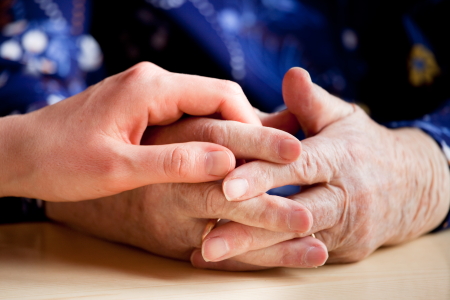
Apr 21, 2017 | Non categorizzato
 Better work “After an accident I lost a good job, and my wife’s salary was not enough for my family to get ahead. Yet Providence did not forget us, helping us to find small bits of work just at the right times so we could pull ourselves up. In the evening, together with the children, we prayed for help – not just for ourselves, but for all those in need. Six months after the accident, just when the economy in our country took a critical turn, I found a job that was better than the one I lost.” J. L. – Uruguay The next room “I was in the hospital, lying in darkness because of my health and the medicine I was taking. I didn’t know what to do to get out of it. I heard a bell ringing; someone in the next room was calling the nurse. I got up to see if I could lend a hand. All that was needed was to give someone some water. I stopped beside his bed, showing interest in his life and trying to listen deeply to his words. I don’t know how, but suddenly I felt lighter.” T. d. M. – Italy An unexpected gift “Having been married for 50 years, we have lived through – as Ecclesiastes says – times of joy and pain. One evening, in particularly tight circumstances, we were counting how much money we had left and pondering what we could buy to give the children something to eat. In that moment a friend called – he wanted to pass by after having received two turkeys as a gift to give us one. It’s so true that we have a Father in heaven who never abandons us.” T. e R. – Poland Change of plan “I travel often for work, so I have to make a detailed schedule of what I’m doing, while staying ready to change my plans. I was surprised, in fact, when I realized that something unexpected, if it’s taken from the hands of God, becomes something better than what I had planned myself. This “making space for God” is not just for when I travel, but in many other circumstances, and it is a true lesson on staying vigilant. Seeing the beautry of God’s plans, even if it costs me to lose mine, I have to say that the “invisible director” knows how to point the way to my true fulfilment, my true happiness.” T.M. – Poland
Better work “After an accident I lost a good job, and my wife’s salary was not enough for my family to get ahead. Yet Providence did not forget us, helping us to find small bits of work just at the right times so we could pull ourselves up. In the evening, together with the children, we prayed for help – not just for ourselves, but for all those in need. Six months after the accident, just when the economy in our country took a critical turn, I found a job that was better than the one I lost.” J. L. – Uruguay The next room “I was in the hospital, lying in darkness because of my health and the medicine I was taking. I didn’t know what to do to get out of it. I heard a bell ringing; someone in the next room was calling the nurse. I got up to see if I could lend a hand. All that was needed was to give someone some water. I stopped beside his bed, showing interest in his life and trying to listen deeply to his words. I don’t know how, but suddenly I felt lighter.” T. d. M. – Italy An unexpected gift “Having been married for 50 years, we have lived through – as Ecclesiastes says – times of joy and pain. One evening, in particularly tight circumstances, we were counting how much money we had left and pondering what we could buy to give the children something to eat. In that moment a friend called – he wanted to pass by after having received two turkeys as a gift to give us one. It’s so true that we have a Father in heaven who never abandons us.” T. e R. – Poland Change of plan “I travel often for work, so I have to make a detailed schedule of what I’m doing, while staying ready to change my plans. I was surprised, in fact, when I realized that something unexpected, if it’s taken from the hands of God, becomes something better than what I had planned myself. This “making space for God” is not just for when I travel, but in many other circumstances, and it is a true lesson on staying vigilant. Seeing the beautry of God’s plans, even if it costs me to lose mine, I have to say that the “invisible director” knows how to point the way to my true fulfilment, my true happiness.” T.M. – Poland
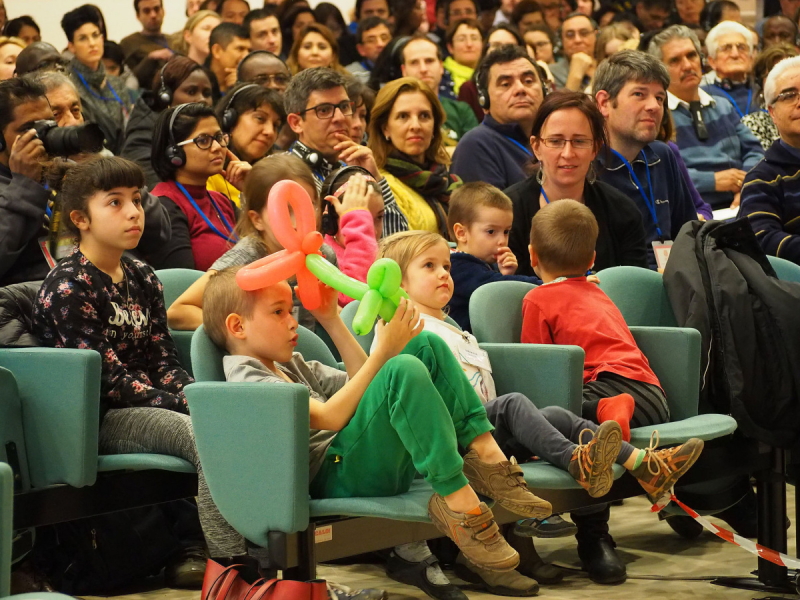
Apr 21, 2017 | Focolare Worldwide
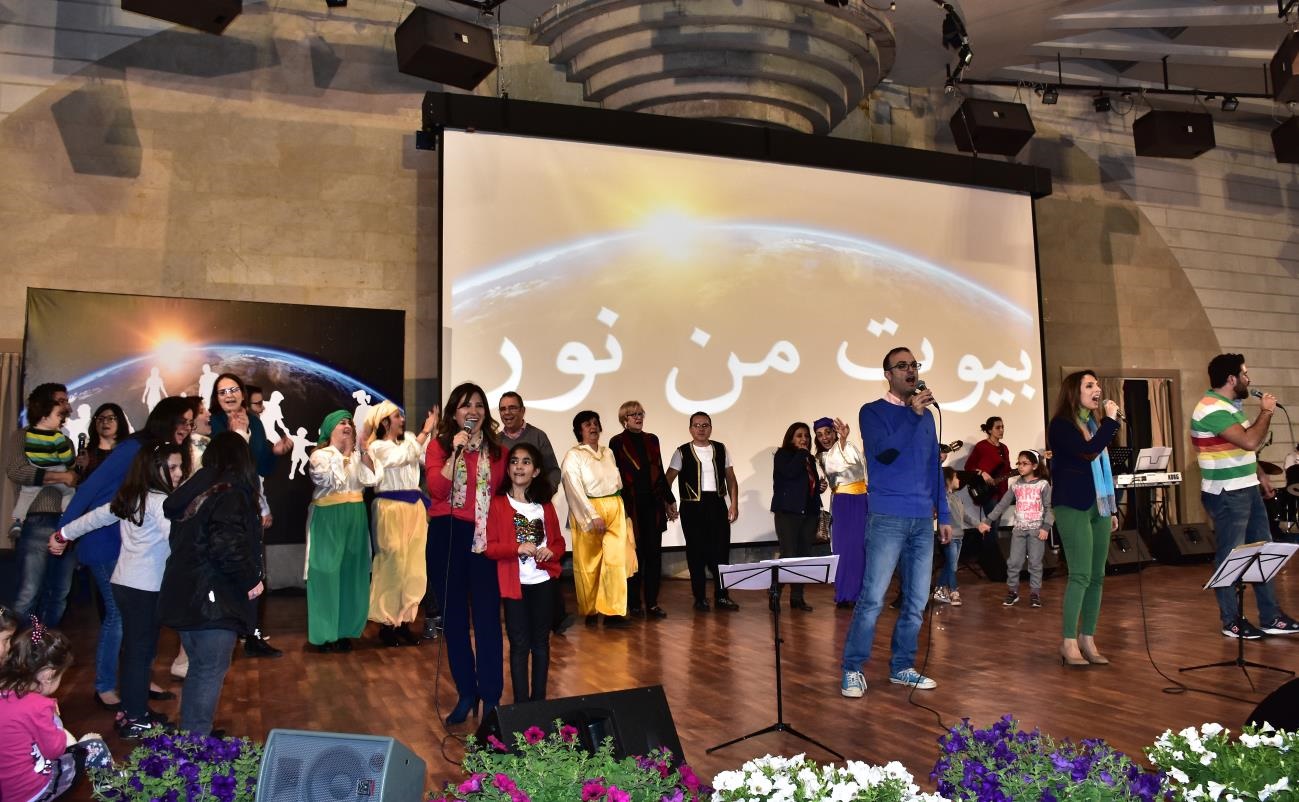 Every year, spring blossoms a few days earlier in order to remember Chiara Lubich. March 14th is celebrated with a variety of new and annual events in every part of the world, each with a style all its own to remember the Focolare foundress on the anniversary of her death – or better – her birth to Heaven that happened in 2008. In 2017 this special day was interwoven with another event, the 50th anniversary of the New Families, which is a branch of the Focolare Movement that embraces 800 thousand families from around the world who strive to live the spirituality of unity and spread values of universal brotherhood in their local environments. The powerful title, Chiara Lubich and the Family, was meant to express the special care and attention the foundress gave to a “daring, beautiful and demanding” calling whose “immeasurable and precious values could change the world and transform it into a family, if those same values were applied to humankind.” “Here, in front of you, I seem to see Jesus who looks at the world, looks at the crowds and pities them,” Chiara Lubich had said in her historic founding address on July 19, 2967. “Because, of all the portions of the world, the most broken part has been placed on your shoulders, the part most like Jesus Forsaken. (…) May this pity not remain at the level of the sentiments, but be transformed into works.”
Every year, spring blossoms a few days earlier in order to remember Chiara Lubich. March 14th is celebrated with a variety of new and annual events in every part of the world, each with a style all its own to remember the Focolare foundress on the anniversary of her death – or better – her birth to Heaven that happened in 2008. In 2017 this special day was interwoven with another event, the 50th anniversary of the New Families, which is a branch of the Focolare Movement that embraces 800 thousand families from around the world who strive to live the spirituality of unity and spread values of universal brotherhood in their local environments. The powerful title, Chiara Lubich and the Family, was meant to express the special care and attention the foundress gave to a “daring, beautiful and demanding” calling whose “immeasurable and precious values could change the world and transform it into a family, if those same values were applied to humankind.” “Here, in front of you, I seem to see Jesus who looks at the world, looks at the crowds and pities them,” Chiara Lubich had said in her historic founding address on July 19, 2967. “Because, of all the portions of the world, the most broken part has been placed on your shoulders, the part most like Jesus Forsaken. (…) May this pity not remain at the level of the sentiments, but be transformed into works.” 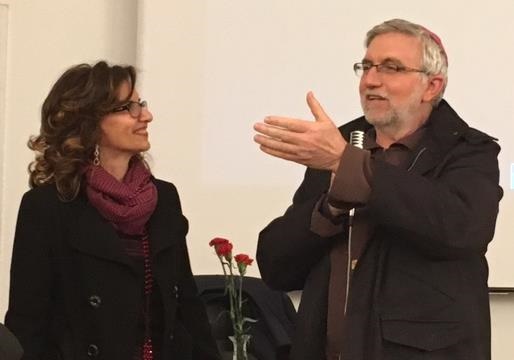 Works that can now be seen: cultural projects, support for minors, seminars for families, help for separated couples, social and educaitonal projects that highlight universal family values from within the great human family. Concrete action is the main characteristic of a family, the basic cell of society, and this was strongly underscored in the two Synods that dealt with the topic of the family. The contents of those Synods then came together in Pope Francis’s Apostolic Exhortation, The Joy of Love. The joy of love that the pope speaks of is well represented by the thousands of voices and it is on the faces of the people and families that converged on Loppiano, Italy, from all five continents last March to attend the event, three days to learn the art of reciprocity. “Married life is like a ship,” one family from Peru commented, “if you try to row by yourself it takes a lot of effort.” It is the art of loving that gives strength to the family to regenerate, through trust, forgiveness, individual responsibility, creativity, acceptance and supportiveness.
Works that can now be seen: cultural projects, support for minors, seminars for families, help for separated couples, social and educaitonal projects that highlight universal family values from within the great human family. Concrete action is the main characteristic of a family, the basic cell of society, and this was strongly underscored in the two Synods that dealt with the topic of the family. The contents of those Synods then came together in Pope Francis’s Apostolic Exhortation, The Joy of Love. The joy of love that the pope speaks of is well represented by the thousands of voices and it is on the faces of the people and families that converged on Loppiano, Italy, from all five continents last March to attend the event, three days to learn the art of reciprocity. “Married life is like a ship,” one family from Peru commented, “if you try to row by yourself it takes a lot of effort.” It is the art of loving that gives strength to the family to regenerate, through trust, forgiveness, individual responsibility, creativity, acceptance and supportiveness.  The event at Loppiano was the pivot point for many other events around the world, beginning with last year’s January 27th inaugural event in Cairo, Egypt, and then for many successive events in Panama, Croatia, Italy, Uganda, Tanzania, USA, Brazil, France, Kenya, Panama, Lithuania, Australia, Belgium, Canada, Burundi, Singapore, and more. Practical experiences were presented and seminars on the themes of education, the relationship of the married couple, acceptance, stories from daily life and hidden acts of heroism in war zones, solidarity in moments of difficulty, support for disadvantaged populations, together with workshops, shows, festivals and public prayer services. Although it is difficult to list them all and describe the main characteristic of each one, it would be impossible not to recognize in these festive family gatherings in collaboration with other movements, Church, Religious and civil institution representatives –“seeds of communion for the people of the Third Millennium,” which were prophetically foretold by Chiara Lubich in 1993.
The event at Loppiano was the pivot point for many other events around the world, beginning with last year’s January 27th inaugural event in Cairo, Egypt, and then for many successive events in Panama, Croatia, Italy, Uganda, Tanzania, USA, Brazil, France, Kenya, Panama, Lithuania, Australia, Belgium, Canada, Burundi, Singapore, and more. Practical experiences were presented and seminars on the themes of education, the relationship of the married couple, acceptance, stories from daily life and hidden acts of heroism in war zones, solidarity in moments of difficulty, support for disadvantaged populations, together with workshops, shows, festivals and public prayer services. Although it is difficult to list them all and describe the main characteristic of each one, it would be impossible not to recognize in these festive family gatherings in collaboration with other movements, Church, Religious and civil institution representatives –“seeds of communion for the people of the Third Millennium,” which were prophetically foretold by Chiara Lubich in 1993.
Apr 20, 2017 | Senza categoria
- Date of Death: 21/04/2017
- Branch of belonging: Volunteer
- Nation: Italy
Apr 20, 2017 | Non categorizzato
“Journeying together. Christians on the way towards Unity” is the title of the 59th edition of Ecumenical Week which will be held 9-13 May 2017, at the international conference centre in Castel Gandolfo (Rome), with the participation of around 700 Christian representatives of 70 Churches and Ecclesial Communities from 40 countries.
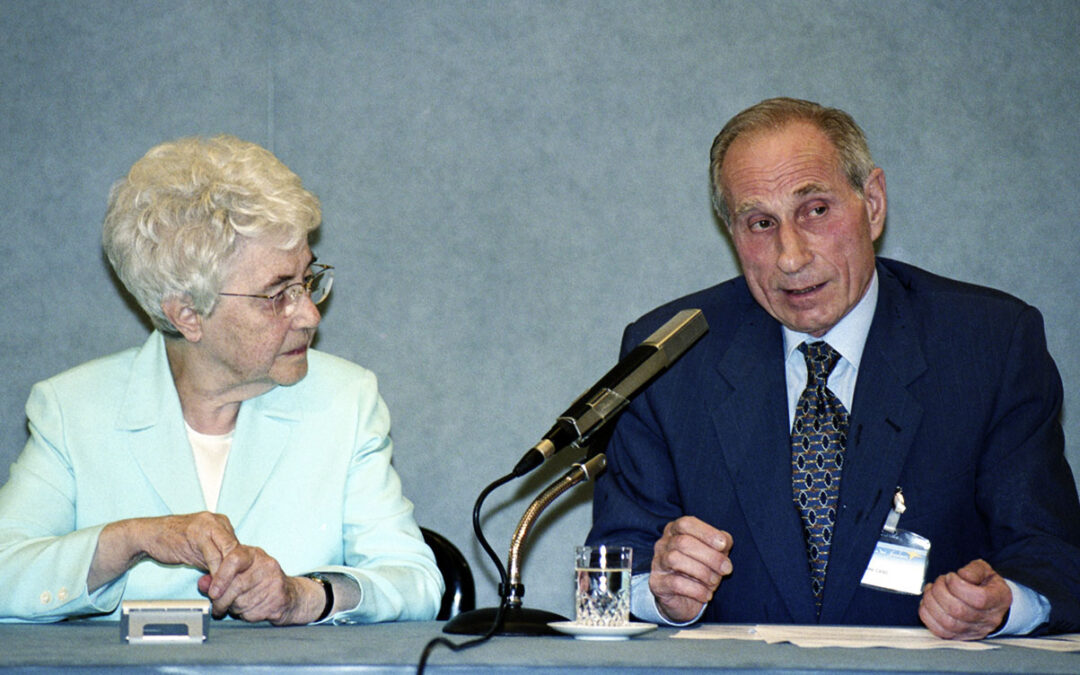
Apr 20, 2017 | Non categorizzato
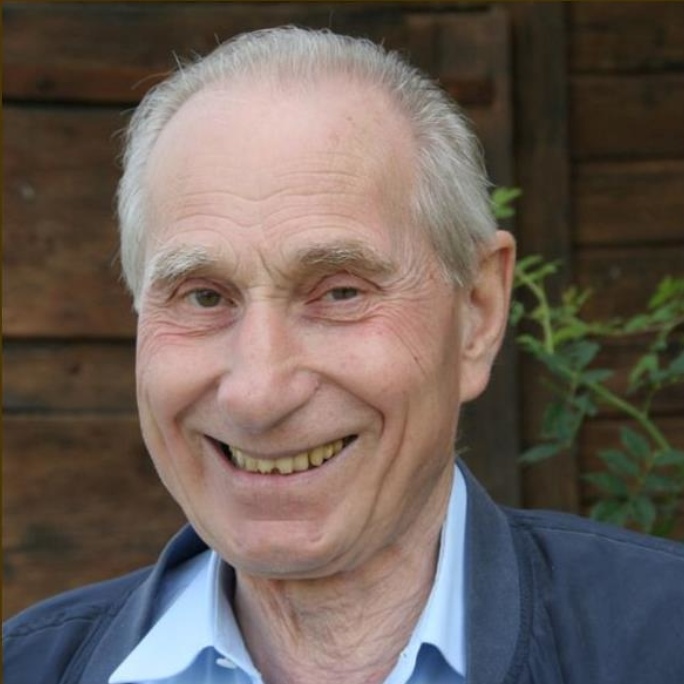 Gianni Caso was born in 1930, in Roccapiemonte, Italy. With much sacrifice he completed his Law studies while working as a court clerk. Because of his strong Catholic background he was invited to take charge of the Catholic Action Youth Group in Naples. After graduation, during military training, he met a focolarino who gave him a Città Nuova magazine, and in 1959 he attended the Mariapolis in Fiera di Primiero. In a passionate speech given by Bruna Tomasi, who was a member of the first group that followed Chiara Lubich, Gianni discovered a vital connection in the ideal of unity to his own vocation as a lay person. In 1968 he was a judge in the Trentino-Alto Adige Region of northern Italy where he was working in the Focolare’s nascent New Humanity Movement. He later became a member of the civil and criminal high court of Rome and moved to the international centre of the Movement in Rocca di Papa. During the 1970s acts of extreme violence were perpetrated against Italian State institutions, which turned into an armed conflict with the terrorists. During those years Gianni was appointed judge rapporteur and drafter of the appeal sentence in the first and most important of five court cases for Aldo Moro, leader of the Christian Democracy who was murdered in 1978 by an armed terrorist group known as the Red Brigade. Gianni was escorted to court each morning by an armed guard and accompanied back to his home each evening. Once home, Gianni went to Mass with his own car. One evening, instead of following his usual route, without giving much thought to it, he went home by another way (he said it was sort of an “inner inspiration”). By doing so he avoided being kidnapped by terrorists who were lying in wait for him.
Gianni Caso was born in 1930, in Roccapiemonte, Italy. With much sacrifice he completed his Law studies while working as a court clerk. Because of his strong Catholic background he was invited to take charge of the Catholic Action Youth Group in Naples. After graduation, during military training, he met a focolarino who gave him a Città Nuova magazine, and in 1959 he attended the Mariapolis in Fiera di Primiero. In a passionate speech given by Bruna Tomasi, who was a member of the first group that followed Chiara Lubich, Gianni discovered a vital connection in the ideal of unity to his own vocation as a lay person. In 1968 he was a judge in the Trentino-Alto Adige Region of northern Italy where he was working in the Focolare’s nascent New Humanity Movement. He later became a member of the civil and criminal high court of Rome and moved to the international centre of the Movement in Rocca di Papa. During the 1970s acts of extreme violence were perpetrated against Italian State institutions, which turned into an armed conflict with the terrorists. During those years Gianni was appointed judge rapporteur and drafter of the appeal sentence in the first and most important of five court cases for Aldo Moro, leader of the Christian Democracy who was murdered in 1978 by an armed terrorist group known as the Red Brigade. Gianni was escorted to court each morning by an armed guard and accompanied back to his home each evening. Once home, Gianni went to Mass with his own car. One evening, instead of following his usual route, without giving much thought to it, he went home by another way (he said it was sort of an “inner inspiration”). By doing so he avoided being kidnapped by terrorists who were lying in wait for him.
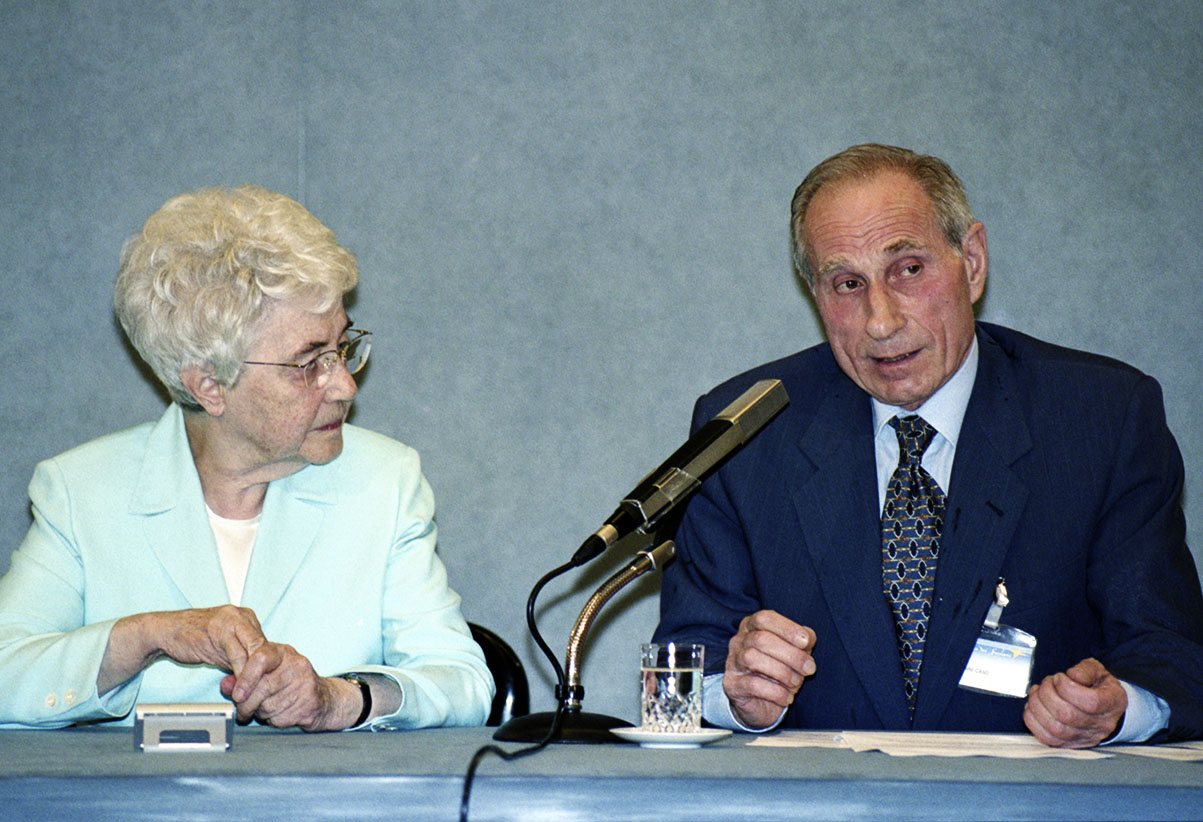
Gianni Caso with Chiara Lubich
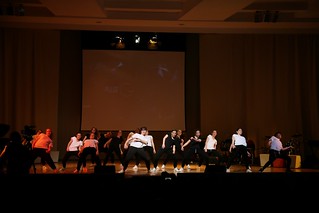
Apr 19, 2017 | Non categorizzato
LIVE STREAMING from Loppiano
PULSE – THE EVENT – 1 st May 10:00-12:30 (CET, UTC 1)
PULSE – THE MEETING, 29 Aprile 2017, Replay the streaming event: part 1 – part 2
Flickr Gallery 
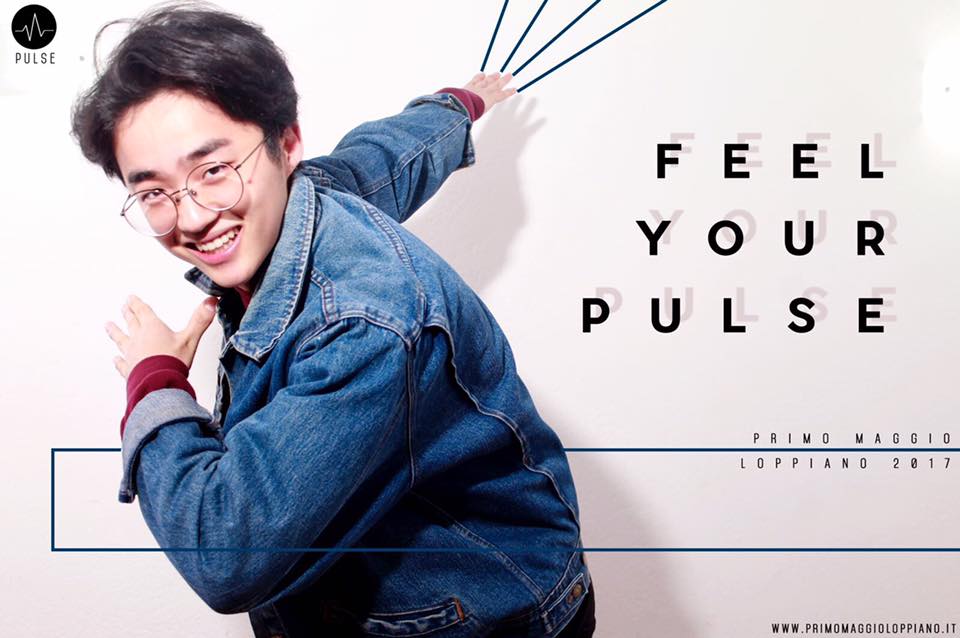 Everybody knows that young people’s hearts beat at a faster pace. Their energy overflows on the world around them. From April 29th to May 1st their hearts will be beating even faster. This experience isn’t be advisable for anyone suffering from the fear of being contaminated by another culture, or the fear of finding similarities among cultures, or suffering from an inclination towards drama and violence. It will be an excellent experience, however, for anyone who would like to travel full speed ahead in the discovery a new world where peace is the law of the land. The Focolare town of Loppiano which, since 1973, has welcomed throngs of young people in the first days of May, will provide a space for encounter and reflection for youth from different groups and movements that include Youth for a United Word, New Horizons, Rondine, La Pira International Centre, Non Dalla Guerra, Living Peace, Sophia University Institute, Dancelab, EcoOne, Economia disarmata, Bargiana and Sportmeet. Many testimonies will be presented from Syria, Ecuador, Egypt, Jordan, Lebanon and Iraq. Six workshops dealing with welcome and integration, social involvement, art, peace, sport and communications. Four forums on: peace and religious traditions, economy and politics, peace education and nature. Two of these will be conducted by the Living Peace International Project and by the Economia Disarmata group. The first workshop emerges from the experience of Carlos Palma, an Uruguayan who was teaching in Egypt, in 201. Through his experience with his students – and against the dramatic backdrop of conflict and war – a complete Peace Education course was born that has spread to more than a hundred countries with the participation of nearly a thousand schools, groups and associations. Up until now it has engaged more than 200 thousand children, adolescents and young people in different parts of the world. The second, the Economia Disarmata (Disarmed Economy), has for some years already been presenting peace education courses. This time it will present: “Objection to war: in the footsteps of Fr Milani” with a visit to Barbiana, guided by the writings of the Italian priest on war, peace and conscientious objection.
Everybody knows that young people’s hearts beat at a faster pace. Their energy overflows on the world around them. From April 29th to May 1st their hearts will be beating even faster. This experience isn’t be advisable for anyone suffering from the fear of being contaminated by another culture, or the fear of finding similarities among cultures, or suffering from an inclination towards drama and violence. It will be an excellent experience, however, for anyone who would like to travel full speed ahead in the discovery a new world where peace is the law of the land. The Focolare town of Loppiano which, since 1973, has welcomed throngs of young people in the first days of May, will provide a space for encounter and reflection for youth from different groups and movements that include Youth for a United Word, New Horizons, Rondine, La Pira International Centre, Non Dalla Guerra, Living Peace, Sophia University Institute, Dancelab, EcoOne, Economia disarmata, Bargiana and Sportmeet. Many testimonies will be presented from Syria, Ecuador, Egypt, Jordan, Lebanon and Iraq. Six workshops dealing with welcome and integration, social involvement, art, peace, sport and communications. Four forums on: peace and religious traditions, economy and politics, peace education and nature. Two of these will be conducted by the Living Peace International Project and by the Economia Disarmata group. The first workshop emerges from the experience of Carlos Palma, an Uruguayan who was teaching in Egypt, in 201. Through his experience with his students – and against the dramatic backdrop of conflict and war – a complete Peace Education course was born that has spread to more than a hundred countries with the participation of nearly a thousand schools, groups and associations. Up until now it has engaged more than 200 thousand children, adolescents and young people in different parts of the world. The second, the Economia Disarmata (Disarmed Economy), has for some years already been presenting peace education courses. This time it will present: “Objection to war: in the footsteps of Fr Milani” with a visit to Barbiana, guided by the writings of the Italian priest on war, peace and conscientious objection. 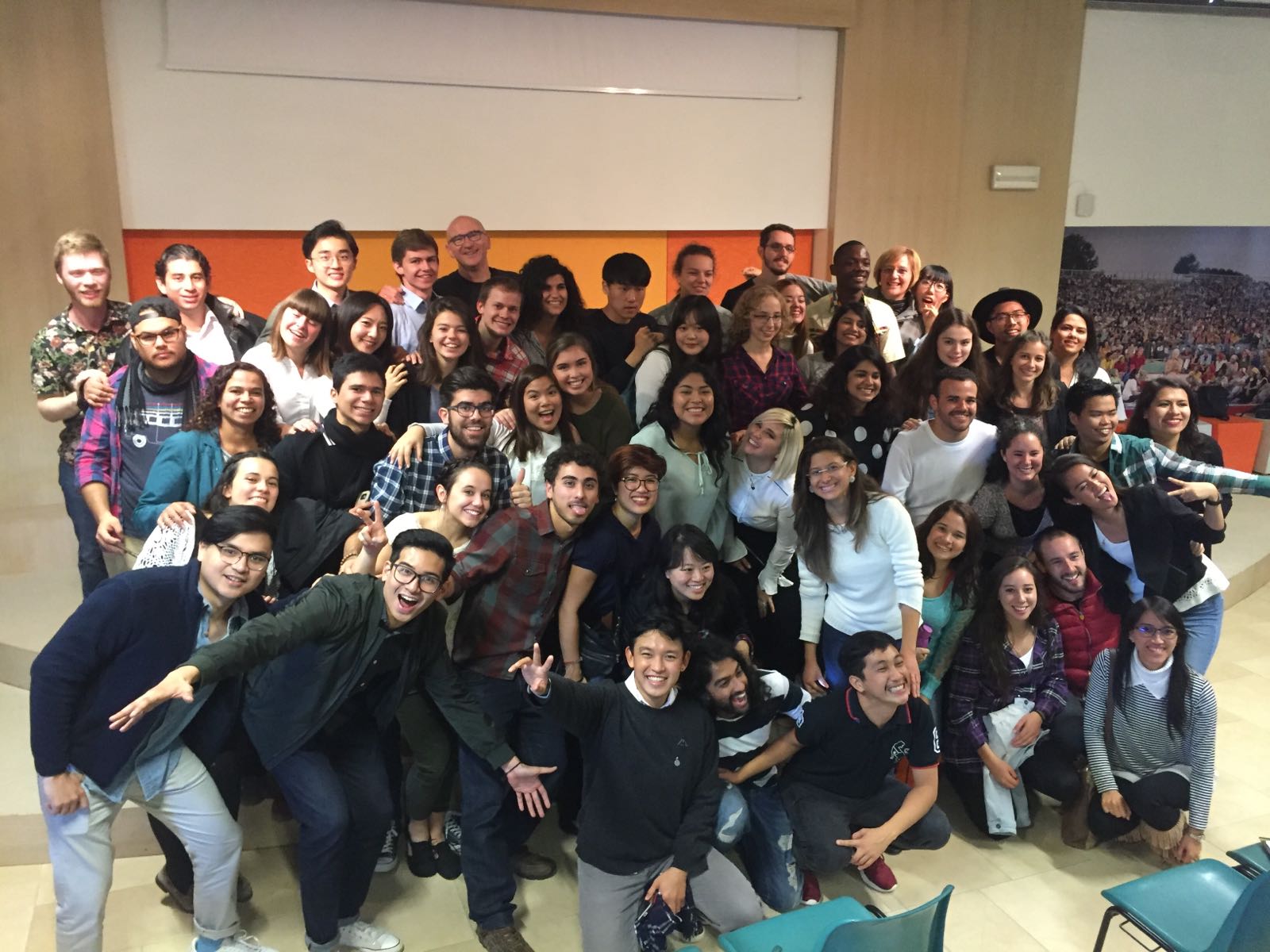 It will be a high-speed journey of discovery (and decision-making) regarding what can be done to change the course of history, becoming links in that global network known as “United World Project” that has engaged the Young For Unity since 2012, together with other associations and groups. The idea is to link the different “fragments of fraternity” and make them part of a network. May 1st will bring the meeting to a close, but not the rhythm. Once again, the annual gathering in Loppiano will open its doors to many young people from more than 40 countries who intend to show the real heartbeat of humanity: the endless number of activities in favour of peace and brotherhood that far more silently than wars fill the lives of individuals, groups and entire populations. They will share their ideas through music, dance, word, testimony and discussions on politics, economy, art, religion, culture and social engagement in favour of peace. Afterwards, until May 7th, the 21cnd edition of the Week of Unity will begin with “Pulse – Change Your Heart; Change the World”. Ever since 1996 this project has been involving many people in large and small series of projects on all the continents, genuine showcases of authentic brotherhood. The May 7th Run for Unity will bring the United World Week to a close with a worldwide relay marathon. You can sign up at the run4unity website. #UnitedWorldWeek2017 – #4peace – #PULSE – #ChangeYourHeartChangeTheWorld – #MeetingY4UW – #PrimoMaggioLoppiano2017 – #run4unity2017
It will be a high-speed journey of discovery (and decision-making) regarding what can be done to change the course of history, becoming links in that global network known as “United World Project” that has engaged the Young For Unity since 2012, together with other associations and groups. The idea is to link the different “fragments of fraternity” and make them part of a network. May 1st will bring the meeting to a close, but not the rhythm. Once again, the annual gathering in Loppiano will open its doors to many young people from more than 40 countries who intend to show the real heartbeat of humanity: the endless number of activities in favour of peace and brotherhood that far more silently than wars fill the lives of individuals, groups and entire populations. They will share their ideas through music, dance, word, testimony and discussions on politics, economy, art, religion, culture and social engagement in favour of peace. Afterwards, until May 7th, the 21cnd edition of the Week of Unity will begin with “Pulse – Change Your Heart; Change the World”. Ever since 1996 this project has been involving many people in large and small series of projects on all the continents, genuine showcases of authentic brotherhood. The May 7th Run for Unity will bring the United World Week to a close with a worldwide relay marathon. You can sign up at the run4unity website. #UnitedWorldWeek2017 – #4peace – #PULSE – #ChangeYourHeartChangeTheWorld – #MeetingY4UW – #PrimoMaggioLoppiano2017 – #run4unity2017
https://youtu.be/5Bc3pj_p0FY
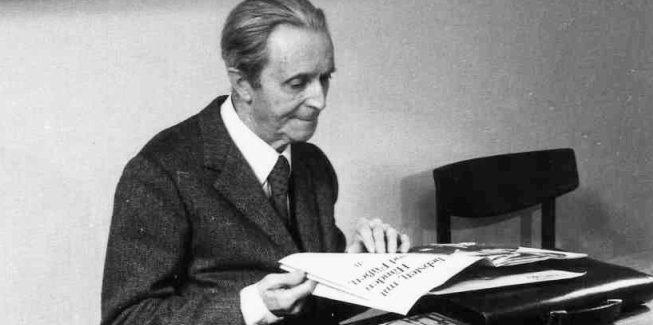
Apr 18, 2017 | Non categorizzato
 November 3, 1955 If universal history is humanity’s fifth Gospel, personal events also are for each of us. Seen from God’s perspective, they appear designed to bring us from being scattered back to unity with God. Detachment from people dear to us and losing distinctions can become a way of clearing out all human factors and leave us alone with God. Thus every day takes on the value of a divine adventure, if it is used to ascend along a ray – our ray – that connects us to God’s sun. Life has been called a march toward death, but it is progress toward freedom, the peak where the Father awaits us. So it is a march towards life, one that never ends. December 19, 1956 Christian wisdom, in asking us to renounce ourselves, is not really about renouncing, but gaining. In place of human ambitions, divine ambitions ignite. It recommends we put God in place of our ego, and by doing so, lift ourselves up from the human level to the divine one, together with the Trinity. It is humility that works limitless greatness. This is why eventually, from that height, the world appears wretched, riches appear chaff and great things turn to sand. So renounce ourselves to be always to be with God, transfer the eternal into time, make the earth a paradise. Suffering becomes raw material for greatness; the cross becomes the stairs to the eternal Father. December 26, 1956 Life is a unique opportunity given us to love. October 16, 1959 In response to individualism today, people nourish their collective lives and give socialization a central role in study and education. It is a movement that helps guide us toward our brother and pushes us to ascend towards God linked together. Yet there is also a danger in doing this: that in the fury of staying with those around us, we forget how to stay with God. Our brother is valuable as a ianua coeli (gate of heaven), but if one cannot see the Father behind him, one risks substituting the desolation of individualism with the desolation of the group. It is the Father who accompanies us, helps us, enlivens us. This is why, with the delusions that rain down each day on the human experience, he reminds us that there is also a divine experience. Or better, that the communion with our brothers passes to the Father, and from the Father returns to our brother. Igino Giordani
November 3, 1955 If universal history is humanity’s fifth Gospel, personal events also are for each of us. Seen from God’s perspective, they appear designed to bring us from being scattered back to unity with God. Detachment from people dear to us and losing distinctions can become a way of clearing out all human factors and leave us alone with God. Thus every day takes on the value of a divine adventure, if it is used to ascend along a ray – our ray – that connects us to God’s sun. Life has been called a march toward death, but it is progress toward freedom, the peak where the Father awaits us. So it is a march towards life, one that never ends. December 19, 1956 Christian wisdom, in asking us to renounce ourselves, is not really about renouncing, but gaining. In place of human ambitions, divine ambitions ignite. It recommends we put God in place of our ego, and by doing so, lift ourselves up from the human level to the divine one, together with the Trinity. It is humility that works limitless greatness. This is why eventually, from that height, the world appears wretched, riches appear chaff and great things turn to sand. So renounce ourselves to be always to be with God, transfer the eternal into time, make the earth a paradise. Suffering becomes raw material for greatness; the cross becomes the stairs to the eternal Father. December 26, 1956 Life is a unique opportunity given us to love. October 16, 1959 In response to individualism today, people nourish their collective lives and give socialization a central role in study and education. It is a movement that helps guide us toward our brother and pushes us to ascend towards God linked together. Yet there is also a danger in doing this: that in the fury of staying with those around us, we forget how to stay with God. Our brother is valuable as a ianua coeli (gate of heaven), but if one cannot see the Father behind him, one risks substituting the desolation of individualism with the desolation of the group. It is the Father who accompanies us, helps us, enlivens us. This is why, with the delusions that rain down each day on the human experience, he reminds us that there is also a divine experience. Or better, that the communion with our brothers passes to the Father, and from the Father returns to our brother. Igino Giordani
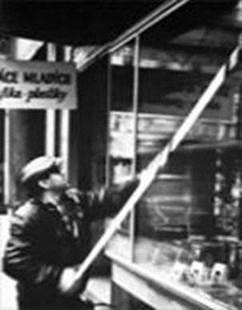
Apr 17, 2017 | Non categorizzato
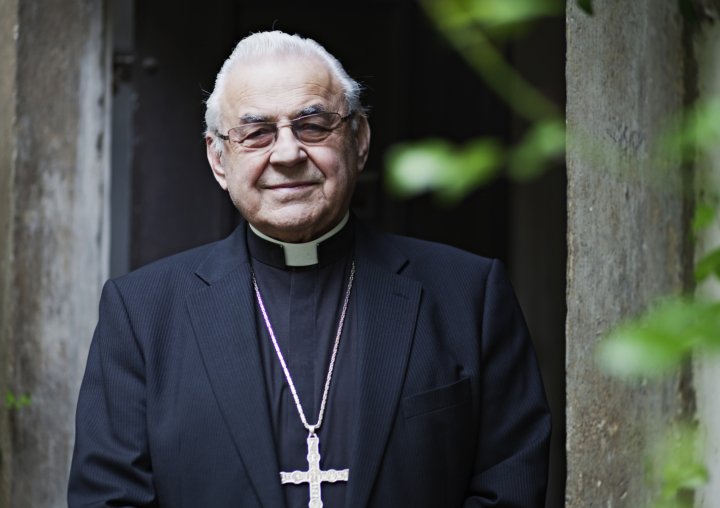 “Everything that has happened in my life has been a gift from God. My last name means ‘wolf’, and my personality is a bit like one. Yet when I started to live the Gospel in the light of the spirituality of unity, my wolf life finished, and my life as Miloslav, which means ‘gracious,’ began.” Thus began the then archbishop, who continued: “In 1964 I went to the DDR (East Germany) to thank a priest who regularly sent me theology books – there weren’t any where we were. He had learned of the spirituality of unity at Erfurt. He told me how the Focolare Movement began and spoke to me of Jesus Forsaken. To tell the truth, I didn’t understand much. I do remember that he gave me a text by Chiara Lubich.” He later met Natalia Dallapiccola, one of the first focolarine, who had also moved to the DDR. The cardinal was not yet even a seminarian, but would become one shortly. “I had many opportunities to to experience that this spirituality was real,” especially with other seminarians who were hard to deal with. It was with one of these that he actually began to share the ideal of unity. “After I was ordained in 1968, I was appointed secretary for the bishop of České Budějovice, a very deep person.” The bishop, however, found it difficult to accept the liturgical reform that had come with Vatican II. “I found myself judging him, but the focolarini explained to me that I had to love him instead of criticize him. At the time, I experienced that unity was the way to understand things, and to help others understand.” After 1968, communism came to power, and Miloslav, who quite influential with young people, was sent far away to a parish lost in the mountains. “There I started to understand what I had been told about Jesus Forsaken. I placed my situation in God’s hands, just as Jesus on the cross had entrusted himself to the Father. It was my first profound encounter with Jesus Forsaken.”
“Everything that has happened in my life has been a gift from God. My last name means ‘wolf’, and my personality is a bit like one. Yet when I started to live the Gospel in the light of the spirituality of unity, my wolf life finished, and my life as Miloslav, which means ‘gracious,’ began.” Thus began the then archbishop, who continued: “In 1964 I went to the DDR (East Germany) to thank a priest who regularly sent me theology books – there weren’t any where we were. He had learned of the spirituality of unity at Erfurt. He told me how the Focolare Movement began and spoke to me of Jesus Forsaken. To tell the truth, I didn’t understand much. I do remember that he gave me a text by Chiara Lubich.” He later met Natalia Dallapiccola, one of the first focolarine, who had also moved to the DDR. The cardinal was not yet even a seminarian, but would become one shortly. “I had many opportunities to to experience that this spirituality was real,” especially with other seminarians who were hard to deal with. It was with one of these that he actually began to share the ideal of unity. “After I was ordained in 1968, I was appointed secretary for the bishop of České Budějovice, a very deep person.” The bishop, however, found it difficult to accept the liturgical reform that had come with Vatican II. “I found myself judging him, but the focolarini explained to me that I had to love him instead of criticize him. At the time, I experienced that unity was the way to understand things, and to help others understand.” After 1968, communism came to power, and Miloslav, who quite influential with young people, was sent far away to a parish lost in the mountains. “There I started to understand what I had been told about Jesus Forsaken. I placed my situation in God’s hands, just as Jesus on the cross had entrusted himself to the Father. It was my first profound encounter with Jesus Forsaken.”

Vlk worked as a window cleaner
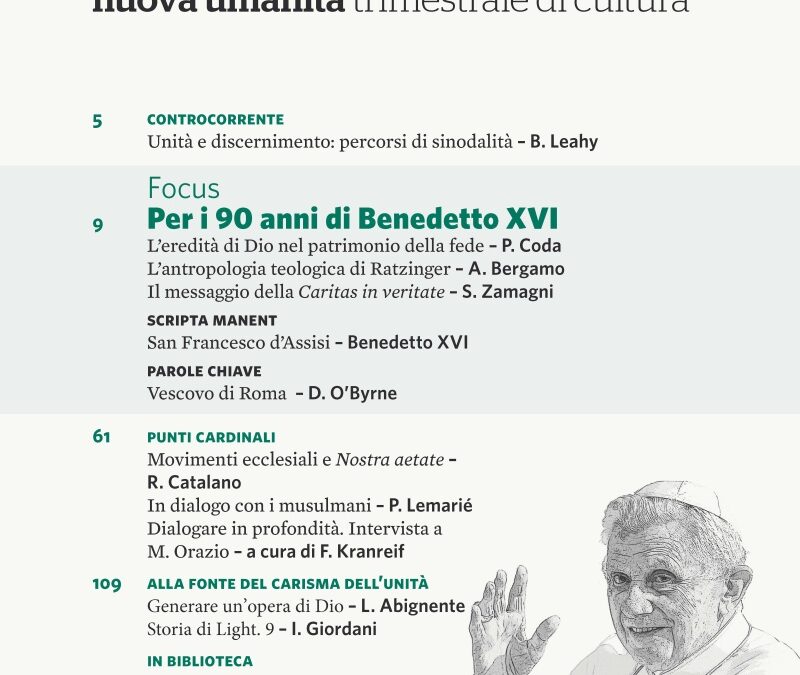
Apr 16, 2017 | Non categorizzato
 Joseph Ratzinger was born 90 years ago, on April 16, in Marktl am Inn, a country town of Bavaria. The 1927 calendar marks Holy Saturday as the day of his birth but, in 2017, his birthday is celebrate on Easter Sunday. The Focolare extends its best wishes to Benedict XVI for all that he has meant to it, to the Church and to humankind. As an expression of our affection and gratitude, the New Humanity Journal has already dedicated the Focus of its 25th edition to him. Compiled by Declan O’Byrne, the Focus section includes scholars such as Piero Coda, Stefano Zamagni and Antonio Bergamo who explore the theological, anthropological and social ethical dimensions of Benedict’s thinking. In a Church where often artificial conflicts arise between supporters of one or another ecclesial view, the New Humanity Journal dedicated to Benedict XVI presents a contribution by Brendan Leahy, Bishop of Limerick Ireland, on the need for a single synodal approach. The artuckes are in the process of being translated and will soon appear in other Focolare publications.
Joseph Ratzinger was born 90 years ago, on April 16, in Marktl am Inn, a country town of Bavaria. The 1927 calendar marks Holy Saturday as the day of his birth but, in 2017, his birthday is celebrate on Easter Sunday. The Focolare extends its best wishes to Benedict XVI for all that he has meant to it, to the Church and to humankind. As an expression of our affection and gratitude, the New Humanity Journal has already dedicated the Focus of its 25th edition to him. Compiled by Declan O’Byrne, the Focus section includes scholars such as Piero Coda, Stefano Zamagni and Antonio Bergamo who explore the theological, anthropological and social ethical dimensions of Benedict’s thinking. In a Church where often artificial conflicts arise between supporters of one or another ecclesial view, the New Humanity Journal dedicated to Benedict XVI presents a contribution by Brendan Leahy, Bishop of Limerick Ireland, on the need for a single synodal approach. The artuckes are in the process of being translated and will soon appear in other Focolare publications.
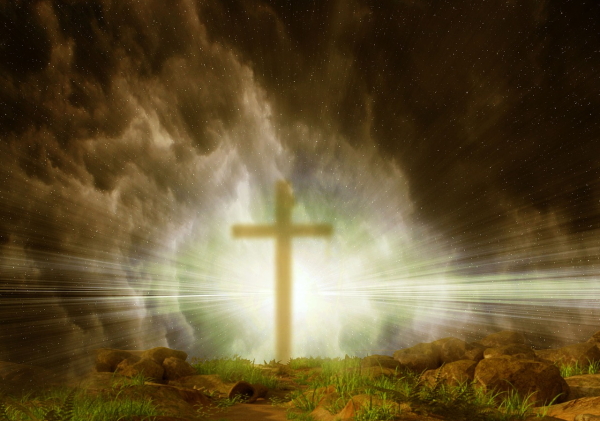
Apr 15, 2017 | Non categorizzato
 “Come, Lord Jesus”! Looking at you, our vocation to love will know no fear. Awaiting your coming, we will build this life well and, as soon as the next life opens up before us, we will plunge into the adventure that knows no end. You have conquered death and, in this our prayer, we feel you have conquered death in us too, in our hearts. “Come Lord Jesus!” always, in all of us. There will not be death, but you. There will be the Risen Lord; and this is already Easter. Best wishes to you all for a glorious, uninterrupted Easter, one that is fruitful, indeed very fruitful, for us, for the Church and for the world. “Come, Lord Jesus”! Looking at you, our vocation to love will know no fear. Awaiting your coming, we will build this life well and, as soon as the next life opens up before us, we will plunge into the adventure that knows no end. You have conquered death and, in this our prayer, we feel you have conquered death in us too, in our hearts. “Come Lord Jesus!” always, in all of us. There will not be death, but you. There will be the Risen Lord; and this is already Easter. Best wishes to you all for a glorious, uninterrupted Easter, one that is fruitful, indeed very fruitful, for us, for the Church and for the world.
Chiara Lubich
C.LUBICH, Cercando le cose di lassù, Rome 1992, p.136. |
|
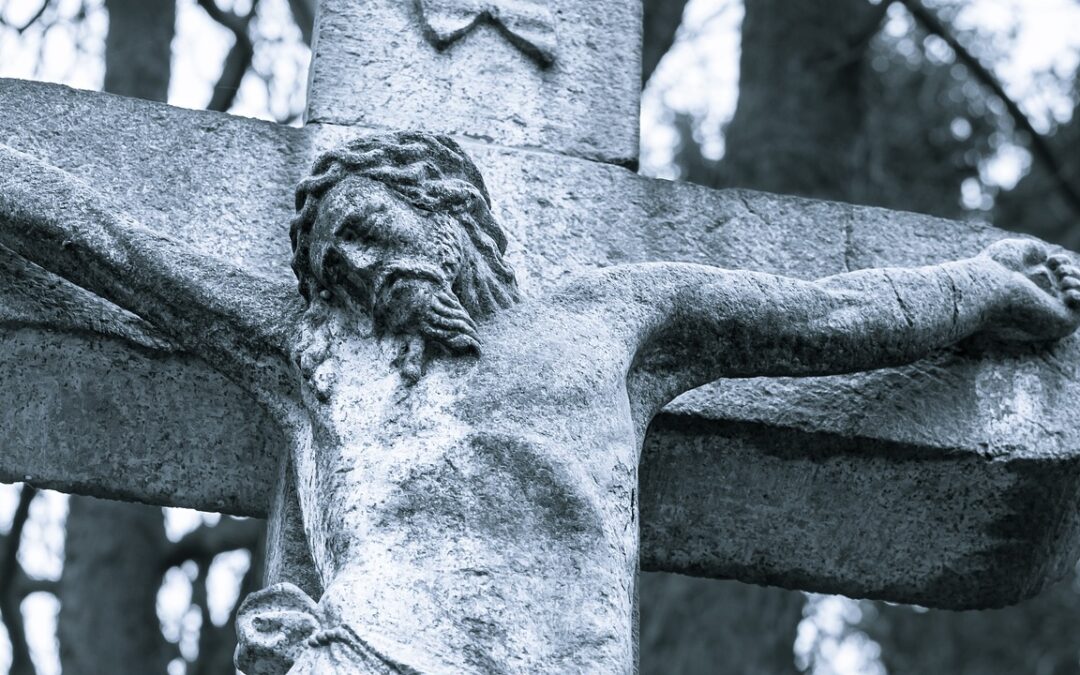
Apr 14, 2017 | Non categorizzato
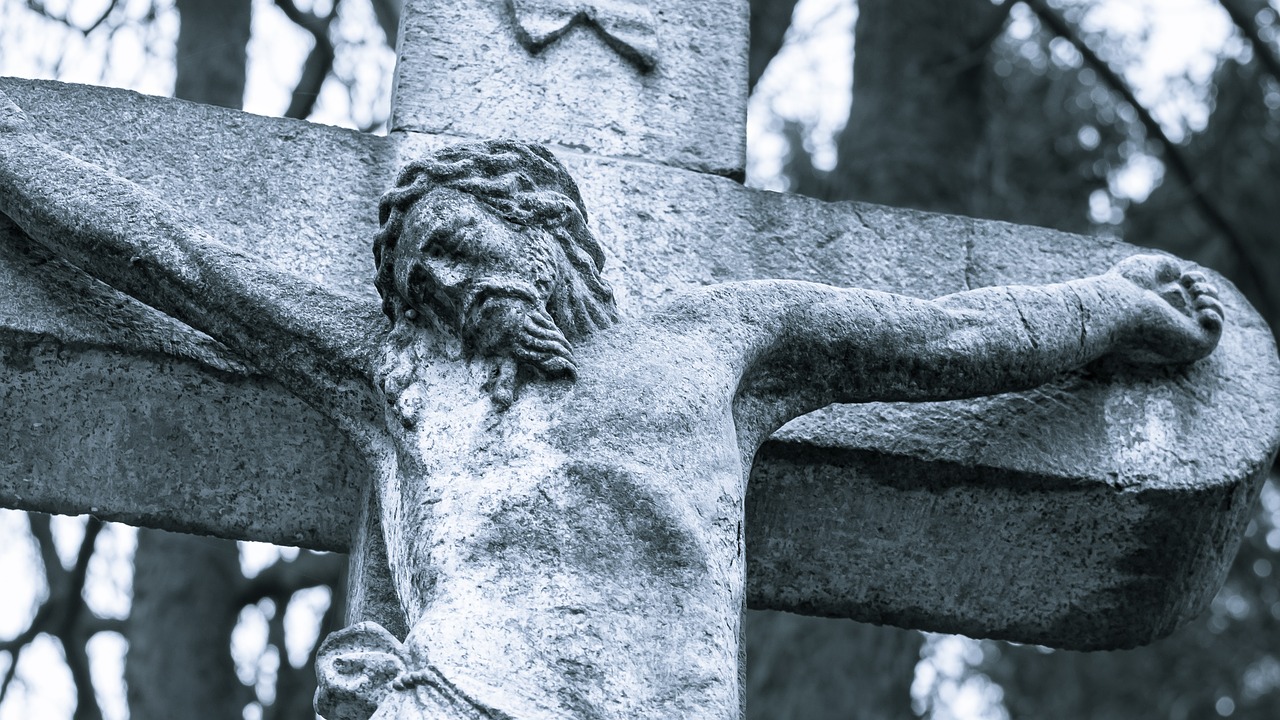 First step: prepare yourself In the morning, as I wake up, I prepare myself by saying: «Today I shall await Him.» I don’t know what the day will bring, but I know that in an unforeseen way, Jesus Forsaken will come to me: in the difficulties, disappointments, perhaps also in my shortcomings, and in bad and painful news. I declare that He will come, and that I am awaiting him. Second step: recognise him During the day, almost always in an unexpected manner, I meet the negativity around me or in me. At these moments it is important to recognize him immediately without hesitation. He, in his abandonment, is already present in every need or fault: in such a way that every pain is “his sacrament” and what matters, within the sign of this pain, is to recognise the countenance of the Crucified and Abandoned, loving and adoring him immediately. Third step: call him by his name Upon meeting him, I am not only aware, but observe and greet him. I call him by his name. Giving a name to every countenance of Jesus Forsaken is a precious exercise and much more than a superficial act. It is no longer “a thing” but a “You.” Precisely in this way, every action of mine becomes contemplation. Fourth step: welcome him warmly Prepare a feast for Jesus Forsaken. By this I mean welcoming him not only hesitatingly, as if it were an inevitable fact, or like welcoming someone who, despite being a friend, drops by at the wrong moment. Furthermore, I don’t want him to sit in the waiting room even for an instant, but will welcome him right away, in the heart of my love and joyful willingness. This is the transition of pain to love, passing through the abandonment in Easter. Only through one who loves in this way will the Forsaken give joy to the world. The feast we prepare for the Forsaken is that feast day which will not see the sunset, because Love never sets. Klaus Hemmerle Published in the Gen’s Magazine 36, Roma 2006, n. 1, p. 3.
First step: prepare yourself In the morning, as I wake up, I prepare myself by saying: «Today I shall await Him.» I don’t know what the day will bring, but I know that in an unforeseen way, Jesus Forsaken will come to me: in the difficulties, disappointments, perhaps also in my shortcomings, and in bad and painful news. I declare that He will come, and that I am awaiting him. Second step: recognise him During the day, almost always in an unexpected manner, I meet the negativity around me or in me. At these moments it is important to recognize him immediately without hesitation. He, in his abandonment, is already present in every need or fault: in such a way that every pain is “his sacrament” and what matters, within the sign of this pain, is to recognise the countenance of the Crucified and Abandoned, loving and adoring him immediately. Third step: call him by his name Upon meeting him, I am not only aware, but observe and greet him. I call him by his name. Giving a name to every countenance of Jesus Forsaken is a precious exercise and much more than a superficial act. It is no longer “a thing” but a “You.” Precisely in this way, every action of mine becomes contemplation. Fourth step: welcome him warmly Prepare a feast for Jesus Forsaken. By this I mean welcoming him not only hesitatingly, as if it were an inevitable fact, or like welcoming someone who, despite being a friend, drops by at the wrong moment. Furthermore, I don’t want him to sit in the waiting room even for an instant, but will welcome him right away, in the heart of my love and joyful willingness. This is the transition of pain to love, passing through the abandonment in Easter. Only through one who loves in this way will the Forsaken give joy to the world. The feast we prepare for the Forsaken is that feast day which will not see the sunset, because Love never sets. Klaus Hemmerle Published in the Gen’s Magazine 36, Roma 2006, n. 1, p. 3.
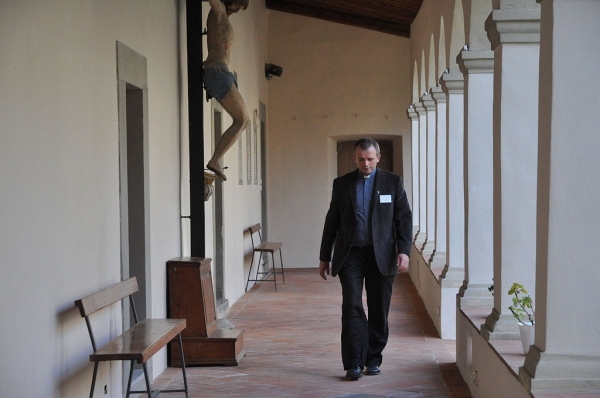
Apr 13, 2017 | Non categorizzato
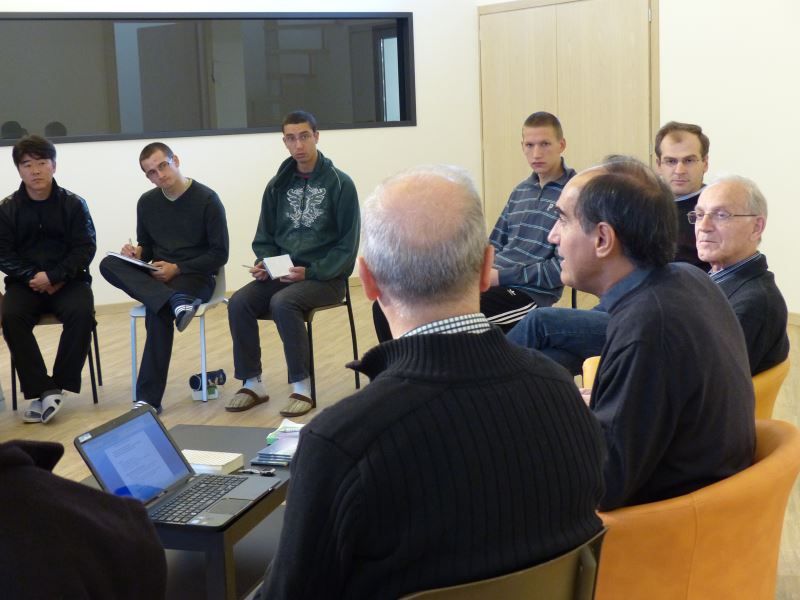 Who trains the trainers? Who, and especially how, accompanies seminarians and priests on their discreet mission and pastoral training? How can we support priests, deacons and seminarians to be, as Pope Francis said to Brazilian bishops in July 2013, “ministers capable of warming the hearts of the people, to walk with them in the night, to dialogue with their illusions and delusions, and to rebuild when things fall apart?” These are relevant questions for all the Christian community and were already being explored during the Second Vatican Council, which led to the creation and opening of schools to train priests in the spirituality of communion. Some history: in 1966 the Focolare Movement’s school for priests began at Grottaferrata, Rome. In 1974 it moved to Frascati, and then in 1984 to the international center at Loppiano, where today it is called the Vinea Mea (“my vineyard”) Spirituality Center. The idea is to offer training in unity for priests, deacons and seminarians who place living fraternity front and center. It is a school of life for men who are called from all over the world to announce the Gospel, to train in a life of communion with their bishops, fellow priests, laypeople in their parishes, and women and men of every creed and culture. This follows the words of Focolare founder Chiara Lubich, who in 1966 told participants at Grottaferrata: “Know how to set aside everything, and leave all pretenses of power behind, to ensure the presence of Jesus among you, living as children in the kingdom of God. This way a “new” pastoral way will be born, together with “new” priests – priests who are Christ for humanity, ready to give their lives for all.” This matches what Pope Francis has a number of times told today’s priests: to go out towards the “existential peripheries.” Since 1966 more than 4,000 priests and seminarians have been trained under the guiding hand of many priests, beginning with Fr. Silvano Cola. Their ages have ranged from 20 to 75, and they have come from close to 60 countries from around the globe. It is an experience that, through the commitment to put Gospel love into practice each day, aims to produce “priests of communion” who are the service of others.
Who trains the trainers? Who, and especially how, accompanies seminarians and priests on their discreet mission and pastoral training? How can we support priests, deacons and seminarians to be, as Pope Francis said to Brazilian bishops in July 2013, “ministers capable of warming the hearts of the people, to walk with them in the night, to dialogue with their illusions and delusions, and to rebuild when things fall apart?” These are relevant questions for all the Christian community and were already being explored during the Second Vatican Council, which led to the creation and opening of schools to train priests in the spirituality of communion. Some history: in 1966 the Focolare Movement’s school for priests began at Grottaferrata, Rome. In 1974 it moved to Frascati, and then in 1984 to the international center at Loppiano, where today it is called the Vinea Mea (“my vineyard”) Spirituality Center. The idea is to offer training in unity for priests, deacons and seminarians who place living fraternity front and center. It is a school of life for men who are called from all over the world to announce the Gospel, to train in a life of communion with their bishops, fellow priests, laypeople in their parishes, and women and men of every creed and culture. This follows the words of Focolare founder Chiara Lubich, who in 1966 told participants at Grottaferrata: “Know how to set aside everything, and leave all pretenses of power behind, to ensure the presence of Jesus among you, living as children in the kingdom of God. This way a “new” pastoral way will be born, together with “new” priests – priests who are Christ for humanity, ready to give their lives for all.” This matches what Pope Francis has a number of times told today’s priests: to go out towards the “existential peripheries.” Since 1966 more than 4,000 priests and seminarians have been trained under the guiding hand of many priests, beginning with Fr. Silvano Cola. Their ages have ranged from 20 to 75, and they have come from close to 60 countries from around the globe. It is an experience that, through the commitment to put Gospel love into practice each day, aims to produce “priests of communion” who are the service of others.  After close to two years of renovations, the spirituality center reopened in October 2013, having risen to the challenge of marrying the classic with modern. It brought together the Church’s centuries of tradition with the communitarian dynamic – both in the community’s training methods and in the architecture itself. “Vinea Mea,” explains Fr. Imre Kiss, who heads the center presently, “offers training in the light of the Focolare Movement’s spirituality of communion. Over the course of a year, the school offers courses on spirituality, theology, anthropology and ecclesiology, as well as seminars on current topics such as youth, family, communication, and dialogue between religions and cultures. “By sharing their lives in small communities, it responds to needs expressed by many priests: to tangibly experience a spirituality that is based on communion, in order then to transmit it to the women and men of our times.” The center works in tandem with similar setups in the movement’s other little cities – in Poland, Germany, Kenya, Brazil, Argentina and the Philippines. It also often promotes annual courses and workshops for seminary educators in order to sustain and spread a priestly lifestyle that is based on communion. In November 2016 Vinea Mea inaugurated the Evangelii Gaudium Center, in collaboration with the Sophia University Institute. This emerged in response to the pope’s invitation to give a new push to the renewal work necessary for a new phase of evangelization in the Church: the call to go out towards the existential edges of our time. One of the center’s first initiatives, organized by Vinea Mea, has been a course that goes into depth into the apostolic exhortation Evangelii Gaudium. From Loppiano online
After close to two years of renovations, the spirituality center reopened in October 2013, having risen to the challenge of marrying the classic with modern. It brought together the Church’s centuries of tradition with the communitarian dynamic – both in the community’s training methods and in the architecture itself. “Vinea Mea,” explains Fr. Imre Kiss, who heads the center presently, “offers training in the light of the Focolare Movement’s spirituality of communion. Over the course of a year, the school offers courses on spirituality, theology, anthropology and ecclesiology, as well as seminars on current topics such as youth, family, communication, and dialogue between religions and cultures. “By sharing their lives in small communities, it responds to needs expressed by many priests: to tangibly experience a spirituality that is based on communion, in order then to transmit it to the women and men of our times.” The center works in tandem with similar setups in the movement’s other little cities – in Poland, Germany, Kenya, Brazil, Argentina and the Philippines. It also often promotes annual courses and workshops for seminary educators in order to sustain and spread a priestly lifestyle that is based on communion. In November 2016 Vinea Mea inaugurated the Evangelii Gaudium Center, in collaboration with the Sophia University Institute. This emerged in response to the pope’s invitation to give a new push to the renewal work necessary for a new phase of evangelization in the Church: the call to go out towards the existential edges of our time. One of the center’s first initiatives, organized by Vinea Mea, has been a course that goes into depth into the apostolic exhortation Evangelii Gaudium. From Loppiano online
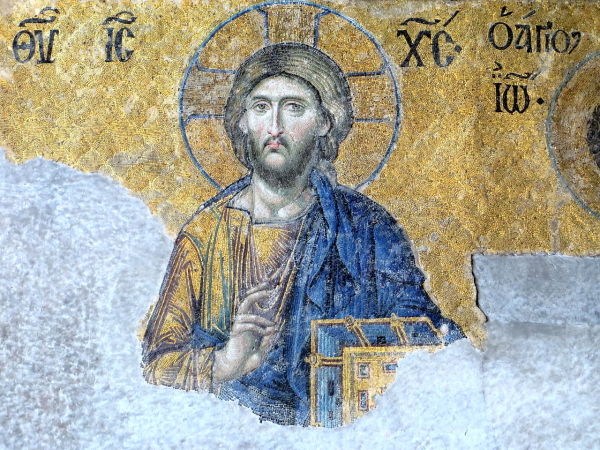
Apr 12, 2017 | Non categorizzato
 |
| Christ is Risen! Every suffering, separation, division, failure, and even death itself can become for us, because of Him, a source of light and peace. Called to give witness to the great message of the Resurrection, let us renew our common commitment to give hope and joy to humanity in this time of momentous change. With best wishes for a Happy Easter!
Maria Voce
|
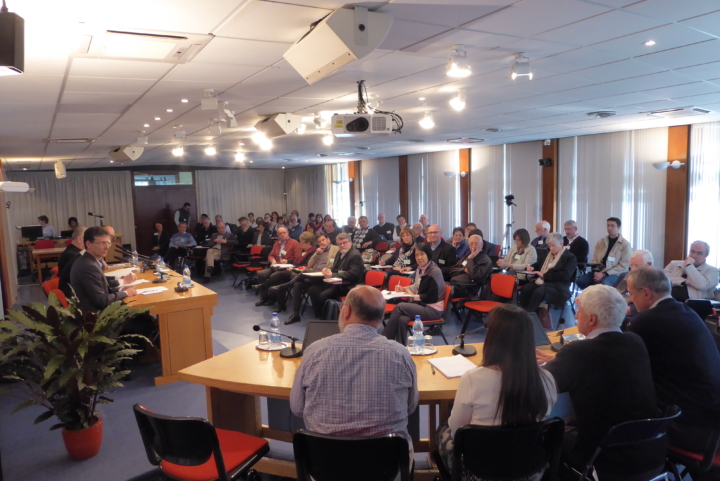
Apr 11, 2017 | Non categorizzato
 The Gospel and Culture is a delicate topic. It has been widely discussed for centuries in theological, sociological, pastoral, political and educational environments. There are Church documents, such as Evangelization in the Modern World and the Gospel of Joy that are indispensable references. If you add the word “charism” to the mix – which nowadays is being attributed to non-ecclesial figures and realities as well – then the search for agreement becomes challenging, especially when you put together experts from different cultures. Yet, this was the striking feature of the “Gospel – Charism – Culture” conference held on April 6-7 at the Focolare International Centre in Rocca di Papa, Italy. In her welcome address, Maria Voce pointed out the deep goal of the gathering: to promote “a culture of peace, a culture of resurrection” that will have a growing impact.” Experts from Asia, Africa, the Americas and Europe compared notes during three thematic sessions. Charisms and the evangelization of the culture. The first session dealt with two questions: “How to respond to the urgency of the Gospel becoming culture” by Archbishop Zani; “How to accelerate the communion among charisms in the face of present challenges?” by Sister Motta; and how “nowadays, many “charisms” are born in non-religious environments, while there is not enough prophecy in the Church itself,” by Luigino Bruni. During successive discussions the experts underlined how “every confrontation with the other is an encounter with a social family’s history and culture” (Guadiano); that “the media have their own charism for a united world, if they maintain their autonomy” (Zanzucchi); that “the evangelization of the culture does not pass through the authority, but through the witness” (Archbishop Zani). Finally, there was the appeal made by Bruni: “We need a new narrative; the young people of today do not understand a language from the 1900s.” From inculturation to interculturality. The second session was opened by Jesús Morán: “European elaborations on culture are far from all there is to say about Christ. In the encounter with other cultures something is expressed that has not yet been expressed.” The goal, as Philippine Andrew Recepcion recalled, “is not a non-Western Christianity, but a beyond-Western [Christianity].” Soni Vargas from Bolivia showed some passion when asking that we move on from the paradigm of inculturation, which does not express the active reciprocity required by Chiara Lubich, to a paradigm of interculturality: “No longer “mission”, but “inter-gift” within a Trinitarian dynamic in which a superiority of one culture over another doesn’t even exist.” During the debate, Chinese Vania Cheng, remarked: “Asia is asking for listening, respect and silence because the inner being reveals more than the word.” Cameroonian, Raphael Takougang, remembered that “in interculturation,the knowledge isn’t communicated, it’s passed on by having an experience together.” Roberto Catalano underscored what Chiara had seen long ago when she invited everyone to “make Christ to be born in the heart of the cultures.” Lucas Cerviño, who was on a link-up from Mexico: “I need to create the conditions so that the seed of God that is already inside a culture can flower . . . but never imposing the way.” Morán concluded: “It’s true that there must not be control or superiority of a culture over another, but this doesn’t mean that there isn’t a central point: Christ is the heart of the world.” Youth – faith – vocational discernment. The third session focused on the upcoming Synod of Bishops and was opened by Italo Fiorin: “Educating means helping an other to find the meaning of his or her own existence. Educating is the art of accompanying.” Sister Jenny Favarian testified to how: “the discovery of the vocation to love makes totally beautiful flowers to blossom.” Maria Rosa Logozzo told about the contact of a group of young people from different cultures – both believers and non-believers – with the focolare in Dublin, Ireland: “The possibility of having an experience of God in a community draws them.” After a rich debate, Fiorin concluded by underscoring the importance of the “pedagogy of reality” and especially of service learning: “learning to serve; serving to learn.” On the final afternoon, theologian Piero Coda gave a presentation on the question: What does it mean when we say that the Church is born from the abandonment of Jesus on the cross? “A life in exile: the capacity to detach from one’s own roots in order to live the other . . . testifying to the folly of God’s love. . .” The discussions from these two days, Francisco Canzani recalled, will be transformed into articles for the Gen magazines, Unità e Carismi, Nuova Umanità, Città Nuova that will help to reflect on current ecclesial and cultural times.
The Gospel and Culture is a delicate topic. It has been widely discussed for centuries in theological, sociological, pastoral, political and educational environments. There are Church documents, such as Evangelization in the Modern World and the Gospel of Joy that are indispensable references. If you add the word “charism” to the mix – which nowadays is being attributed to non-ecclesial figures and realities as well – then the search for agreement becomes challenging, especially when you put together experts from different cultures. Yet, this was the striking feature of the “Gospel – Charism – Culture” conference held on April 6-7 at the Focolare International Centre in Rocca di Papa, Italy. In her welcome address, Maria Voce pointed out the deep goal of the gathering: to promote “a culture of peace, a culture of resurrection” that will have a growing impact.” Experts from Asia, Africa, the Americas and Europe compared notes during three thematic sessions. Charisms and the evangelization of the culture. The first session dealt with two questions: “How to respond to the urgency of the Gospel becoming culture” by Archbishop Zani; “How to accelerate the communion among charisms in the face of present challenges?” by Sister Motta; and how “nowadays, many “charisms” are born in non-religious environments, while there is not enough prophecy in the Church itself,” by Luigino Bruni. During successive discussions the experts underlined how “every confrontation with the other is an encounter with a social family’s history and culture” (Guadiano); that “the media have their own charism for a united world, if they maintain their autonomy” (Zanzucchi); that “the evangelization of the culture does not pass through the authority, but through the witness” (Archbishop Zani). Finally, there was the appeal made by Bruni: “We need a new narrative; the young people of today do not understand a language from the 1900s.” From inculturation to interculturality. The second session was opened by Jesús Morán: “European elaborations on culture are far from all there is to say about Christ. In the encounter with other cultures something is expressed that has not yet been expressed.” The goal, as Philippine Andrew Recepcion recalled, “is not a non-Western Christianity, but a beyond-Western [Christianity].” Soni Vargas from Bolivia showed some passion when asking that we move on from the paradigm of inculturation, which does not express the active reciprocity required by Chiara Lubich, to a paradigm of interculturality: “No longer “mission”, but “inter-gift” within a Trinitarian dynamic in which a superiority of one culture over another doesn’t even exist.” During the debate, Chinese Vania Cheng, remarked: “Asia is asking for listening, respect and silence because the inner being reveals more than the word.” Cameroonian, Raphael Takougang, remembered that “in interculturation,the knowledge isn’t communicated, it’s passed on by having an experience together.” Roberto Catalano underscored what Chiara had seen long ago when she invited everyone to “make Christ to be born in the heart of the cultures.” Lucas Cerviño, who was on a link-up from Mexico: “I need to create the conditions so that the seed of God that is already inside a culture can flower . . . but never imposing the way.” Morán concluded: “It’s true that there must not be control or superiority of a culture over another, but this doesn’t mean that there isn’t a central point: Christ is the heart of the world.” Youth – faith – vocational discernment. The third session focused on the upcoming Synod of Bishops and was opened by Italo Fiorin: “Educating means helping an other to find the meaning of his or her own existence. Educating is the art of accompanying.” Sister Jenny Favarian testified to how: “the discovery of the vocation to love makes totally beautiful flowers to blossom.” Maria Rosa Logozzo told about the contact of a group of young people from different cultures – both believers and non-believers – with the focolare in Dublin, Ireland: “The possibility of having an experience of God in a community draws them.” After a rich debate, Fiorin concluded by underscoring the importance of the “pedagogy of reality” and especially of service learning: “learning to serve; serving to learn.” On the final afternoon, theologian Piero Coda gave a presentation on the question: What does it mean when we say that the Church is born from the abandonment of Jesus on the cross? “A life in exile: the capacity to detach from one’s own roots in order to live the other . . . testifying to the folly of God’s love. . .” The discussions from these two days, Francisco Canzani recalled, will be transformed into articles for the Gen magazines, Unità e Carismi, Nuova Umanità, Città Nuova that will help to reflect on current ecclesial and cultural times.
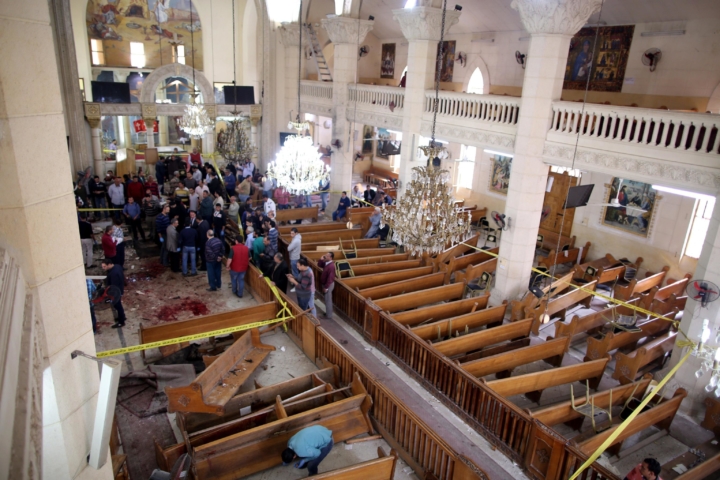
Apr 10, 2017 | Focolare Worldwide
 “It’s an attack not just on Christians but on religion as well,” commented the members of the local Focolare community in Egypt, with reference to the bombings on Palm Sunday. This sentiment was confirmed through the immediate solidarity shown by the Muslim community, many of whom offered to donate blood at the hospitals. “Being deeply religious people, Muslims and Christians in Egypt felt called upon to strengthen their faith after the attacks,” a member of the Movement said. Two Coptic Christian churches were targetted by terrorists in the city of Tanta in the Nile Delta, and in Alexandria, the second largest city of the North African country. In Tanta the Church of St George was hit causing 27 casualties. In Alexandria, Church of St Mark was bombed killing 18 people. The President of Egypt, Abdel Fattah al-Sisi has declared a three-month state of emergency, during which all public manifestations and events will be suspended, among other restrictions. The attacks coincided with the celebration of Palm Sunday, which marks the start of the most important liturgical week for Christians. It was a sombre beginning to Holy Week. The passage of Revelation came to mind which describes a “great multitude (…) from every nation (…) holding palm branches in their hands” who had “washed their robes in the blood of the Lamb (…)”. (Revelation 7:9-14). On Sunday morning, at St Peter’s Square, the Holy Father prayed “for the victims”, expressing his condolences “to my dear brother, Pope Tawadros II, the Coptic Church and the entire Egyptian nation.” And he concluded: “May the Lord convert the hearts of those who sow terror, violence and death.”
“It’s an attack not just on Christians but on religion as well,” commented the members of the local Focolare community in Egypt, with reference to the bombings on Palm Sunday. This sentiment was confirmed through the immediate solidarity shown by the Muslim community, many of whom offered to donate blood at the hospitals. “Being deeply religious people, Muslims and Christians in Egypt felt called upon to strengthen their faith after the attacks,” a member of the Movement said. Two Coptic Christian churches were targetted by terrorists in the city of Tanta in the Nile Delta, and in Alexandria, the second largest city of the North African country. In Tanta the Church of St George was hit causing 27 casualties. In Alexandria, Church of St Mark was bombed killing 18 people. The President of Egypt, Abdel Fattah al-Sisi has declared a three-month state of emergency, during which all public manifestations and events will be suspended, among other restrictions. The attacks coincided with the celebration of Palm Sunday, which marks the start of the most important liturgical week for Christians. It was a sombre beginning to Holy Week. The passage of Revelation came to mind which describes a “great multitude (…) from every nation (…) holding palm branches in their hands” who had “washed their robes in the blood of the Lamb (…)”. (Revelation 7:9-14). On Sunday morning, at St Peter’s Square, the Holy Father prayed “for the victims”, expressing his condolences “to my dear brother, Pope Tawadros II, the Coptic Church and the entire Egyptian nation.” And he concluded: “May the Lord convert the hearts of those who sow terror, violence and death.”
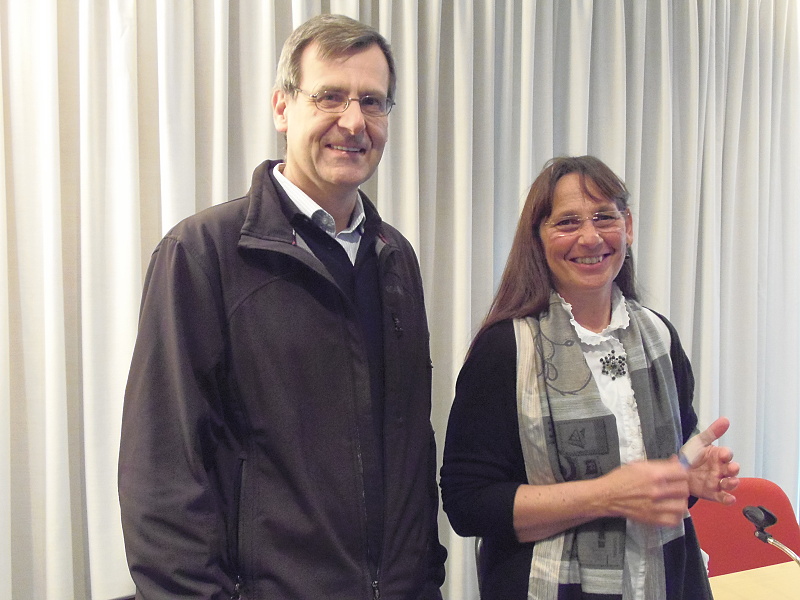
Apr 10, 2017 | Non categorizzato
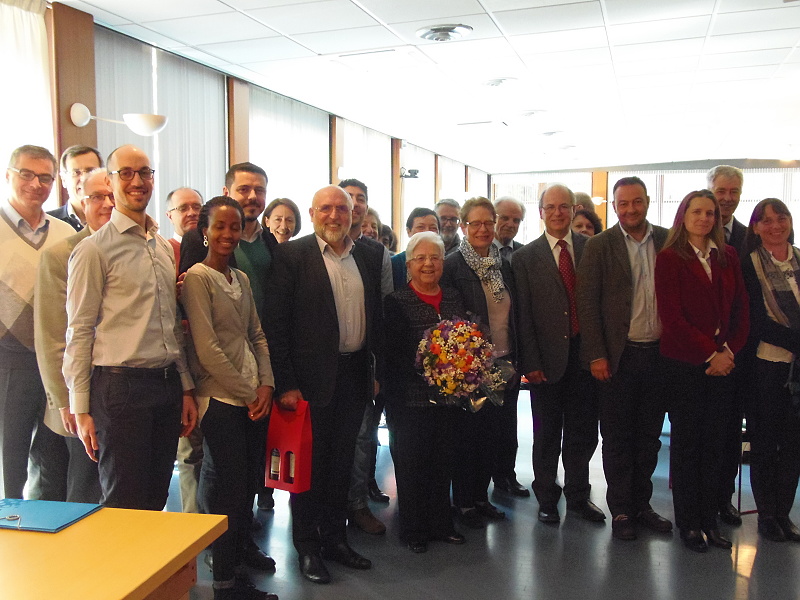
With Maria Voce and Jesús Morán
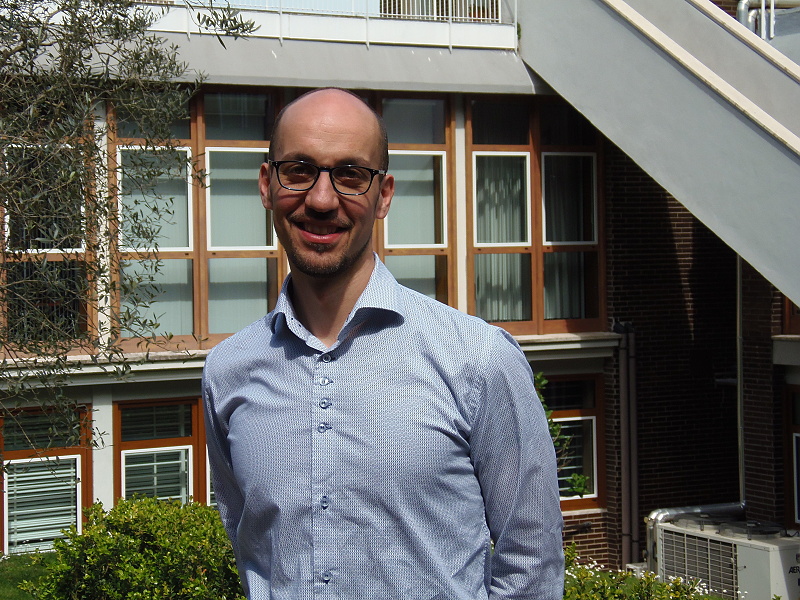
avide Bilardi, adjunct representative at the centre in Geneva, has been working in New Humanity for seven years: Davide Bilardi

Marco Desalvo, President and Cecilia Landucci, Vice president
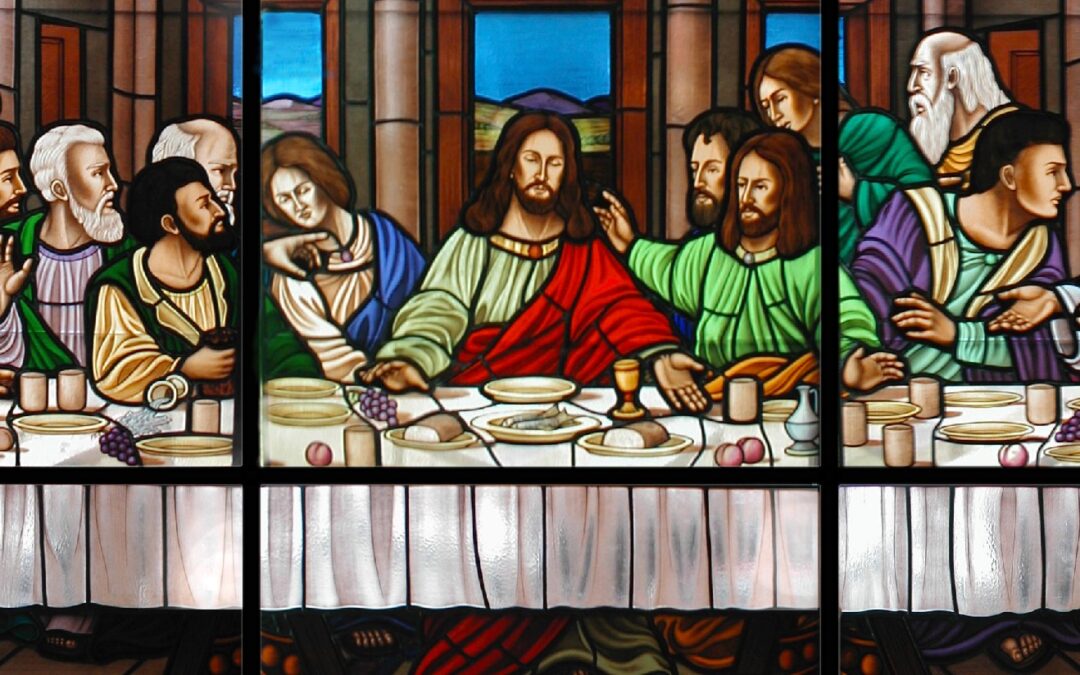
Apr 9, 2017 | Non categorizzato
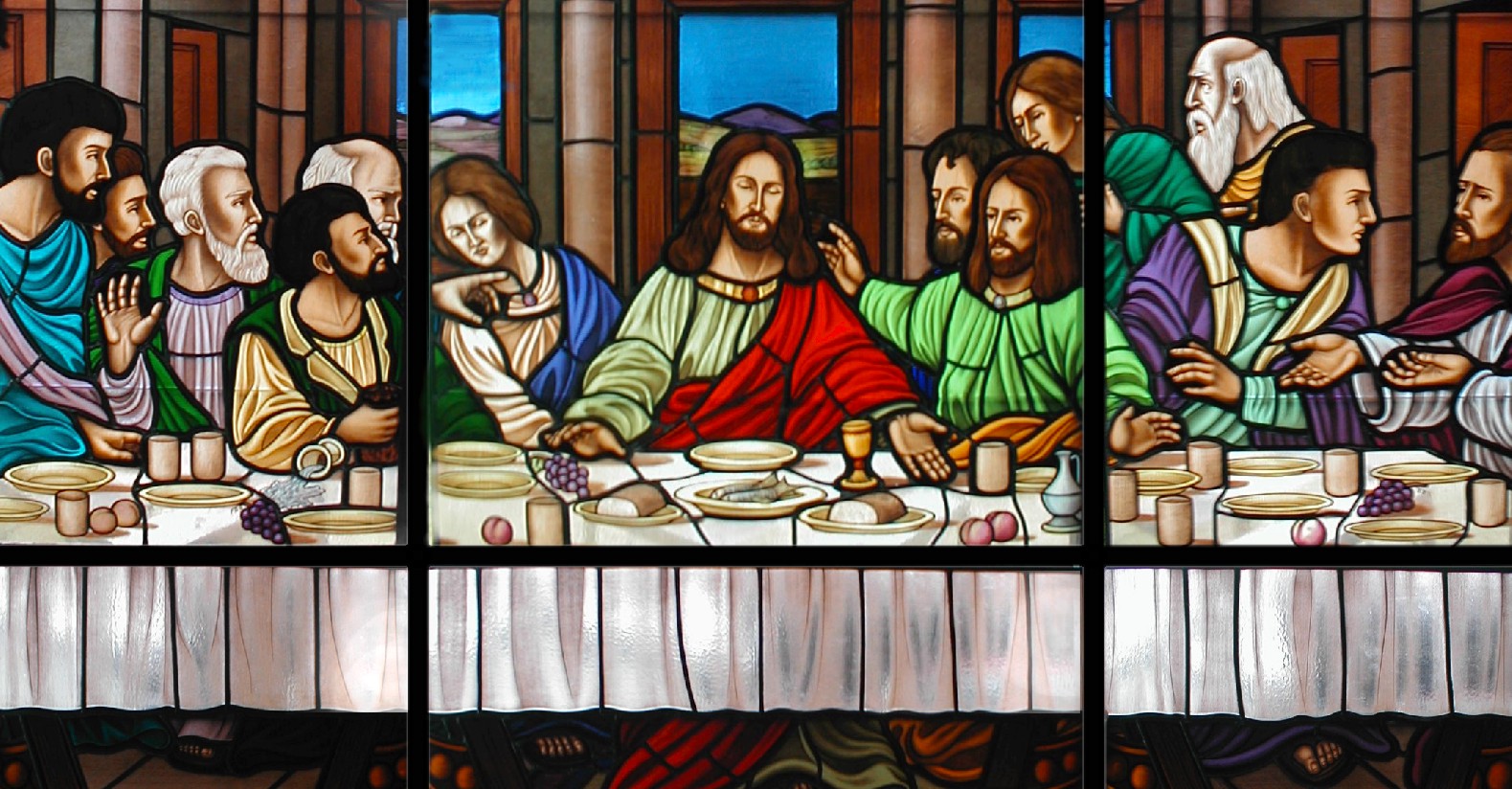 In the man Jesus there is participation in the very life of the Trinity, in the social life of God. This supernatural social life, which the life of grace brings to man, never destroys his natural life. There is instead a marvelous interweaving of the two. The supernatural social life, which is grace, will give origin to and allow for a social life that is naturally perfect, sincne Chrtist will found a visible Church. […] But what is the crossing point between Christ and the Church? How do move from the spiritual presence of the humanity of Christ to the presence of Christ in humanity? In order to understand it we must contemplate the human nature of Jesus before his death and after his Resurrection. We must meditate on his own flesh and blood which, after his exaltation, becomes life-giving. […] Before the crucifixion, the range of action of Christ’s humanity is circumscribed by the limits of his mortal body that is liable to death; with his death and Resurrection, it becomes life-giving spirit. […] Therefore, on the glorious Easter Sunday, when the Spirit penetrates and illumines every part of Jesus’s body, the Church also receives the Holy Spirit: it becomes the Body of Christ. You could say that Christ planted a particular body and raised up [a] Mystical Body, the Church. And so the mystery of human social life re-flowers also in these marvelous events. Since Christ wished to become a member of the human community, he became its Head. To this end, by suffering on the cross, he redeems the human race, since it it spiritually enclosed in him, and also his own flesh through which he wished to work the redemption; and so it acquires certain infinite dimensions. It is spiritualized and becomes the very image of the new humanity. That body which for the man a limiting principle, for Jesus after his Resurrection, is a universalizing principle of life. […] The term “Mystical Body of Christ” and its more precise and determining meaning, refers to the Church that continues the very work of Jesus here on earth. […] Christ, the Son of God, was a true man, he was perfect man; likewise, the Mystical Body is fully human, perfectly human, besides divine. The Incarnation is daily continuing its work, until the end of the ages, in the visible Church. Pasquale Foresi From: Pasquale Foresi, Teologia della Socialità, (Rome: Città Nuova, 1963), 85.
In the man Jesus there is participation in the very life of the Trinity, in the social life of God. This supernatural social life, which the life of grace brings to man, never destroys his natural life. There is instead a marvelous interweaving of the two. The supernatural social life, which is grace, will give origin to and allow for a social life that is naturally perfect, sincne Chrtist will found a visible Church. […] But what is the crossing point between Christ and the Church? How do move from the spiritual presence of the humanity of Christ to the presence of Christ in humanity? In order to understand it we must contemplate the human nature of Jesus before his death and after his Resurrection. We must meditate on his own flesh and blood which, after his exaltation, becomes life-giving. […] Before the crucifixion, the range of action of Christ’s humanity is circumscribed by the limits of his mortal body that is liable to death; with his death and Resurrection, it becomes life-giving spirit. […] Therefore, on the glorious Easter Sunday, when the Spirit penetrates and illumines every part of Jesus’s body, the Church also receives the Holy Spirit: it becomes the Body of Christ. You could say that Christ planted a particular body and raised up [a] Mystical Body, the Church. And so the mystery of human social life re-flowers also in these marvelous events. Since Christ wished to become a member of the human community, he became its Head. To this end, by suffering on the cross, he redeems the human race, since it it spiritually enclosed in him, and also his own flesh through which he wished to work the redemption; and so it acquires certain infinite dimensions. It is spiritualized and becomes the very image of the new humanity. That body which for the man a limiting principle, for Jesus after his Resurrection, is a universalizing principle of life. […] The term “Mystical Body of Christ” and its more precise and determining meaning, refers to the Church that continues the very work of Jesus here on earth. […] Christ, the Son of God, was a true man, he was perfect man; likewise, the Mystical Body is fully human, perfectly human, besides divine. The Incarnation is daily continuing its work, until the end of the ages, in the visible Church. Pasquale Foresi From: Pasquale Foresi, Teologia della Socialità, (Rome: Città Nuova, 1963), 85.
Apr 6, 2017 | Non categorizzato
The countdown for the 21st United World Week started. “We would like to generate a tam tam that, starting slowly, will rise up to generate much noise in the world!”, wrote us Youth for a United World. “Let us show the world all the concrete actions that, day after day, build bridges of brotherhood with #fraternitychallenge.On your Facebook wall, write something positive and invite two friends who will do the same for another 5 days … and so on, up to the United World Week! Use all the hashtags: #UnitedWorldProject, #FraternityChallenge, #Pulse, and #4Peace.

 While Portugal welcomes the Holy Father in Fatima, we are highlighting an excerpt of an article of by Chiara Lubich published in the Roman Observatory, in 1984, on the occasion of the Family Jubilee. The Fatima event, Chiara affirmed, calls us to conversion and faithfulness to the Gospel, and also to the family. “[…] When the Pope [John Paul II − editor’s note] read the act of consecration of humanity to Mary, he began with these words: ‘The family is the heart of the Church. Today, from this heart ensues a particular prayer of consecration to the Heart of the Mother of Jesus.’ And so, from heart to Heart in this intense communion, that was created with the Eucharistic celebration, from the heart of the universal Father, arose almost a cry, filled with concern for the needs of humanity, the prayer of consecration to the Virgin Mary, asking her to take special care of the human family. The Pope was there, on kneeing in front of the white image of Our Lady of Fatima. In that moment the thought of many of us present went back to May 13 1981, the day of the assassination attempt. […] Now St. Peter’s Square was packed to the very brim. Next to him before Our Lady of Fatima, like a flower that blossomed from his suffering and blood, all the families of the Church were symbolically gathered like a sign of all the families of the world. At the moment of the world’s consecration to Mary, the Holy Father, as the supreme Pastor, could therefore count not only on the communion of all the Pastors of the Church, “constituting a body and a college”, but also on the full adhesion of the children of the Church, represented by many families of many countries. […]And in the prayer with which he concluded his homily – prayer which he composed for the 1980 Synod that had the family as its theme of study – he asked this grace: “May the love enhanced by the grace of the sacrament of marriage be stronger than any weakness and any crisis that our families sometimes experience.” All these important coincidences and expressions help us to gather the profound meaning of this consecration has to bring all Christian families to live – with the help and example of Mary – the luminous and fascinating plan of God on the family in all its expressions: marriage love, according to the divine plan, sign of Christ’s love for the Church up to the total gift of self; paternity and maternity, as the participation to the fertile love of the Creator; peace and harmony in overcoming all the tensions and difficulties as fruit of an always alive and tireless charity intent on keeping the spiritual presence of Christ in the family and, with Him, the unity of thought and action; an openness of communion and service towards other families. […] The message of Fatima that calls everyone to conversion and faithfulness to the Gospel, becomes the answer of the consecration of the family, a commitment of renewal so that the face of the Church may shine more. In the Christian family the Church is the “family of God” a welcoming dwelling place for all the lost children who are called back to the house of the Father and invited to enter through the maternal heart of the Mother of Jesus.
While Portugal welcomes the Holy Father in Fatima, we are highlighting an excerpt of an article of by Chiara Lubich published in the Roman Observatory, in 1984, on the occasion of the Family Jubilee. The Fatima event, Chiara affirmed, calls us to conversion and faithfulness to the Gospel, and also to the family. “[…] When the Pope [John Paul II − editor’s note] read the act of consecration of humanity to Mary, he began with these words: ‘The family is the heart of the Church. Today, from this heart ensues a particular prayer of consecration to the Heart of the Mother of Jesus.’ And so, from heart to Heart in this intense communion, that was created with the Eucharistic celebration, from the heart of the universal Father, arose almost a cry, filled with concern for the needs of humanity, the prayer of consecration to the Virgin Mary, asking her to take special care of the human family. The Pope was there, on kneeing in front of the white image of Our Lady of Fatima. In that moment the thought of many of us present went back to May 13 1981, the day of the assassination attempt. […] Now St. Peter’s Square was packed to the very brim. Next to him before Our Lady of Fatima, like a flower that blossomed from his suffering and blood, all the families of the Church were symbolically gathered like a sign of all the families of the world. At the moment of the world’s consecration to Mary, the Holy Father, as the supreme Pastor, could therefore count not only on the communion of all the Pastors of the Church, “constituting a body and a college”, but also on the full adhesion of the children of the Church, represented by many families of many countries. […]And in the prayer with which he concluded his homily – prayer which he composed for the 1980 Synod that had the family as its theme of study – he asked this grace: “May the love enhanced by the grace of the sacrament of marriage be stronger than any weakness and any crisis that our families sometimes experience.” All these important coincidences and expressions help us to gather the profound meaning of this consecration has to bring all Christian families to live – with the help and example of Mary – the luminous and fascinating plan of God on the family in all its expressions: marriage love, according to the divine plan, sign of Christ’s love for the Church up to the total gift of self; paternity and maternity, as the participation to the fertile love of the Creator; peace and harmony in overcoming all the tensions and difficulties as fruit of an always alive and tireless charity intent on keeping the spiritual presence of Christ in the family and, with Him, the unity of thought and action; an openness of communion and service towards other families. […] The message of Fatima that calls everyone to conversion and faithfulness to the Gospel, becomes the answer of the consecration of the family, a commitment of renewal so that the face of the Church may shine more. In the Christian family the Church is the “family of God” a welcoming dwelling place for all the lost children who are called back to the house of the Father and invited to enter through the maternal heart of the Mother of Jesus. 





 With regard to the culture that could emerge when there is profound reconciliation, Maria Voce quoted
With regard to the culture that could emerge when there is profound reconciliation, Maria Voce quoted 



 On 4th May, Maria Voce met with the President of the Republic of Malta,
On 4th May, Maria Voce met with the President of the Republic of Malta,  Also present were the Archbishop, the President of the Ecumenical Commission, the Vicar General, the Secretary of the Nunciature of Malta, the Nuncio of the Ivory Coast (of Maltese origin), a representative of the Romanian Orthodox Church, two members of the “Robert Schuman Centre for European Studies” and several members of ecclesial organisations. In tracing the rich history of the
Also present were the Archbishop, the President of the Ecumenical Commission, the Vicar General, the Secretary of the Nunciature of Malta, the Nuncio of the Ivory Coast (of Maltese origin), a representative of the Romanian Orthodox Church, two members of the “Robert Schuman Centre for European Studies” and several members of ecclesial organisations. In tracing the rich history of the 











 The second invitation was offered by President Al-Sisi when he visited the Vatican in 2014. He’s trying to bring ahead a culture of peace, not without difficulty. But the pope went beyond the politics, in depth. The third invitation came from the Grand Imam of al-Azhar in 2016. On that occasion the pope gave the Encyclical Laudato sii in a gesture of seeking what unites us. In my opinion it was quite courageous of the Grand Imam to offer this invitation, given the precedents. The pope’s speech at al-Azhar University was important, perhaps a beginning. Now I think time will be needed and courage to face the more delicate questions and in order to delve more deeply into the history as well . . . Now it’s up to us Egyptians to get working and moving forward.”
The second invitation was offered by President Al-Sisi when he visited the Vatican in 2014. He’s trying to bring ahead a culture of peace, not without difficulty. But the pope went beyond the politics, in depth. The third invitation came from the Grand Imam of al-Azhar in 2016. On that occasion the pope gave the Encyclical Laudato sii in a gesture of seeking what unites us. In my opinion it was quite courageous of the Grand Imam to offer this invitation, given the precedents. The pope’s speech at al-Azhar University was important, perhaps a beginning. Now I think time will be needed and courage to face the more delicate questions and in order to delve more deeply into the history as well . . . Now it’s up to us Egyptians to get working and moving forward.” 








 The Focolare has shared a long-standing friendship with
The Focolare has shared a long-standing friendship with 






















 First step: prepare yourself In the morning, as I wake up, I prepare myself by saying: «Today I shall await Him.» I don’t know what the day will bring, but I know that in an unforeseen way, Jesus Forsaken will come to me: in the difficulties, disappointments, perhaps also in my shortcomings, and in bad and painful news. I declare that He will come, and that I am awaiting him. Second step: recognise him During the day, almost always in an unexpected manner, I meet the negativity around me or in me. At these moments it is important to recognize him immediately without hesitation. He, in his abandonment, is already present in every need or fault: in such a way that every pain is “his sacrament” and what matters, within the sign of this pain, is to recognise the countenance of the Crucified and Abandoned, loving and adoring him immediately. Third step: call him by his name Upon meeting him, I am not only aware, but observe and greet him. I call him by his name. Giving a name to every countenance of Jesus Forsaken is a precious exercise and much more than a superficial act. It is no longer “a thing” but a “You.” Precisely in this way, every action of mine becomes contemplation. Fourth step: welcome him warmly Prepare a feast for Jesus Forsaken. By this I mean welcoming him not only hesitatingly, as if it were an inevitable fact, or like welcoming someone who, despite being a friend, drops by at the wrong moment. Furthermore, I don’t want him to sit in the waiting room even for an instant, but will welcome him right away, in the heart of my love and joyful willingness. This is the transition of pain to love, passing through the abandonment in Easter. Only through one who loves in this way will the Forsaken give joy to the world. The feast we prepare for the Forsaken is that feast day which will not see the sunset, because Love never sets.
First step: prepare yourself In the morning, as I wake up, I prepare myself by saying: «Today I shall await Him.» I don’t know what the day will bring, but I know that in an unforeseen way, Jesus Forsaken will come to me: in the difficulties, disappointments, perhaps also in my shortcomings, and in bad and painful news. I declare that He will come, and that I am awaiting him. Second step: recognise him During the day, almost always in an unexpected manner, I meet the negativity around me or in me. At these moments it is important to recognize him immediately without hesitation. He, in his abandonment, is already present in every need or fault: in such a way that every pain is “his sacrament” and what matters, within the sign of this pain, is to recognise the countenance of the Crucified and Abandoned, loving and adoring him immediately. Third step: call him by his name Upon meeting him, I am not only aware, but observe and greet him. I call him by his name. Giving a name to every countenance of Jesus Forsaken is a precious exercise and much more than a superficial act. It is no longer “a thing” but a “You.” Precisely in this way, every action of mine becomes contemplation. Fourth step: welcome him warmly Prepare a feast for Jesus Forsaken. By this I mean welcoming him not only hesitatingly, as if it were an inevitable fact, or like welcoming someone who, despite being a friend, drops by at the wrong moment. Furthermore, I don’t want him to sit in the waiting room even for an instant, but will welcome him right away, in the heart of my love and joyful willingness. This is the transition of pain to love, passing through the abandonment in Easter. Only through one who loves in this way will the Forsaken give joy to the world. The feast we prepare for the Forsaken is that feast day which will not see the sunset, because Love never sets. 
 Who trains the trainers? Who, and especially how, accompanies seminarians and priests on their discreet mission and pastoral training? How can we support priests, deacons and seminarians to be, as
Who trains the trainers? Who, and especially how, accompanies seminarians and priests on their discreet mission and pastoral training? How can we support priests, deacons and seminarians to be, as 






 In the man Jesus there is participation in the very life of the Trinity, in the social life of God. This supernatural social life, which the life of grace brings to man, never destroys his natural life. There is instead a marvelous interweaving of the two. The supernatural social life, which is grace, will give origin to and allow for a social life that is naturally perfect, sincne Chrtist will found a visible Church. […] But what is the crossing point between Christ and the Church? How do move from the spiritual presence of the humanity of Christ to the presence of Christ in humanity? In order to understand it we must contemplate the human nature of Jesus before his death and after his Resurrection. We must meditate on his own flesh and blood which, after his exaltation, becomes life-giving. […] Before the crucifixion, the range of action of Christ’s humanity is circumscribed by the limits of his mortal body that is liable to death; with his death and Resurrection, it becomes life-giving spirit. […] Therefore, on the glorious Easter Sunday, when the Spirit penetrates and illumines every part of Jesus’s body, the Church also receives the Holy Spirit: it becomes the Body of Christ. You could say that Christ planted a particular body and raised up [a] Mystical Body, the Church. And so the mystery of human social life re-flowers also in these marvelous events. Since Christ wished to become a member of the human community, he became its Head. To this end, by suffering on the cross, he redeems the human race, since it it spiritually enclosed in him, and also his own flesh through which he wished to work the redemption; and so it acquires certain infinite dimensions. It is spiritualized and becomes the very image of the new humanity. That body which for the man a limiting principle, for Jesus after his Resurrection, is a universalizing principle of life. […] The term “Mystical Body of Christ” and its more precise and determining meaning, refers to the Church that continues the very work of Jesus here on earth. […] Christ, the Son of God, was a true man, he was perfect man; likewise, the Mystical Body is fully human, perfectly human, besides divine. The Incarnation is daily continuing its work, until the end of the ages, in the visible Church.
In the man Jesus there is participation in the very life of the Trinity, in the social life of God. This supernatural social life, which the life of grace brings to man, never destroys his natural life. There is instead a marvelous interweaving of the two. The supernatural social life, which is grace, will give origin to and allow for a social life that is naturally perfect, sincne Chrtist will found a visible Church. […] But what is the crossing point between Christ and the Church? How do move from the spiritual presence of the humanity of Christ to the presence of Christ in humanity? In order to understand it we must contemplate the human nature of Jesus before his death and after his Resurrection. We must meditate on his own flesh and blood which, after his exaltation, becomes life-giving. […] Before the crucifixion, the range of action of Christ’s humanity is circumscribed by the limits of his mortal body that is liable to death; with his death and Resurrection, it becomes life-giving spirit. […] Therefore, on the glorious Easter Sunday, when the Spirit penetrates and illumines every part of Jesus’s body, the Church also receives the Holy Spirit: it becomes the Body of Christ. You could say that Christ planted a particular body and raised up [a] Mystical Body, the Church. And so the mystery of human social life re-flowers also in these marvelous events. Since Christ wished to become a member of the human community, he became its Head. To this end, by suffering on the cross, he redeems the human race, since it it spiritually enclosed in him, and also his own flesh through which he wished to work the redemption; and so it acquires certain infinite dimensions. It is spiritualized and becomes the very image of the new humanity. That body which for the man a limiting principle, for Jesus after his Resurrection, is a universalizing principle of life. […] The term “Mystical Body of Christ” and its more precise and determining meaning, refers to the Church that continues the very work of Jesus here on earth. […] Christ, the Son of God, was a true man, he was perfect man; likewise, the Mystical Body is fully human, perfectly human, besides divine. The Incarnation is daily continuing its work, until the end of the ages, in the visible Church.